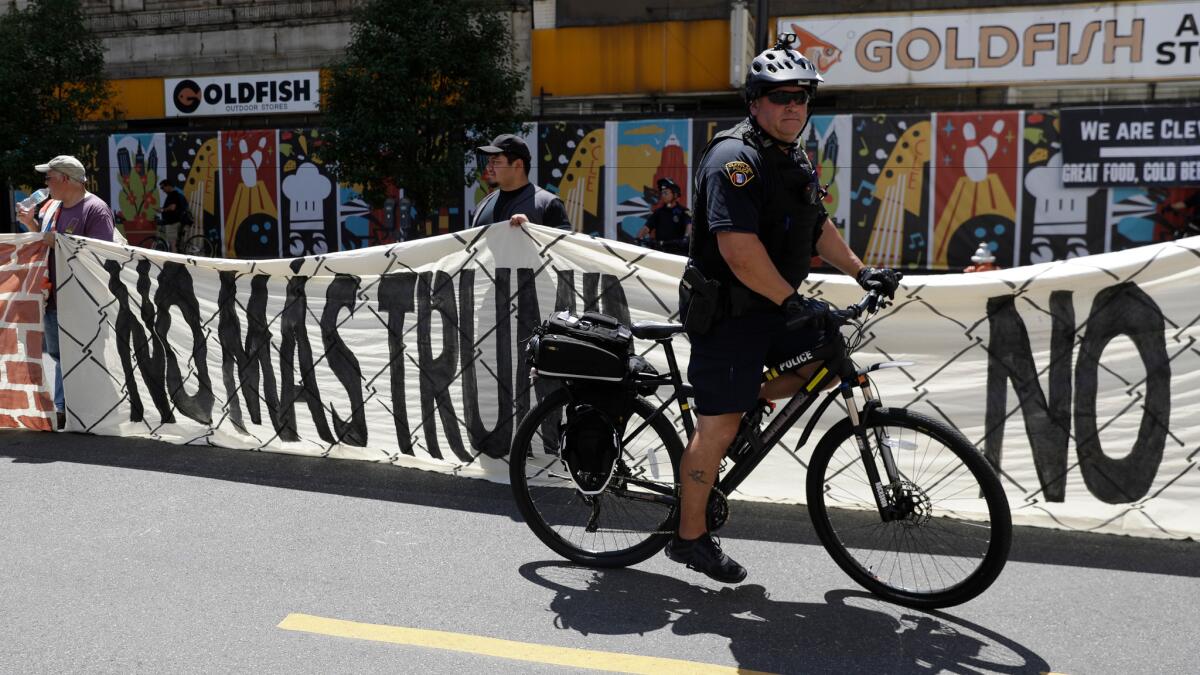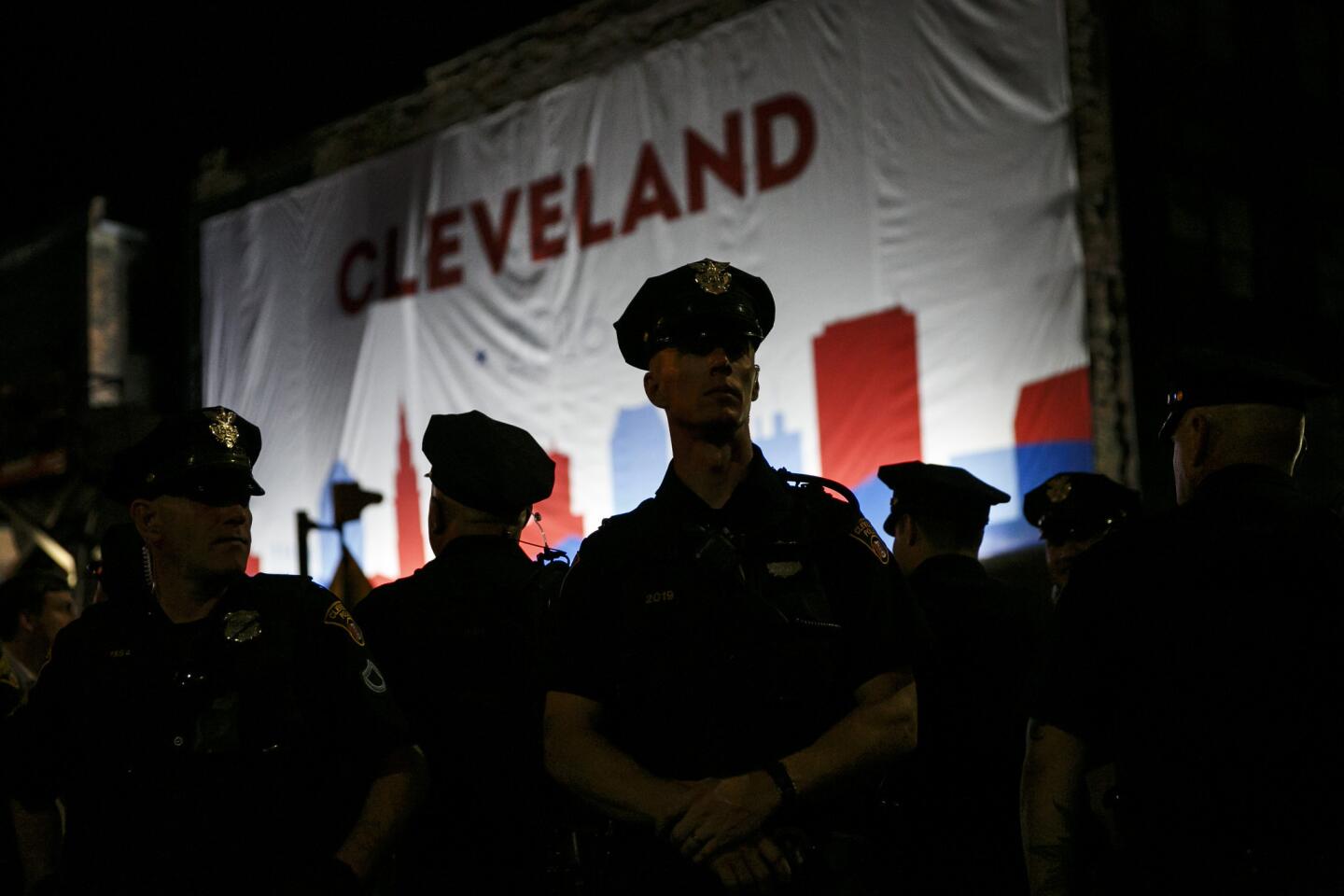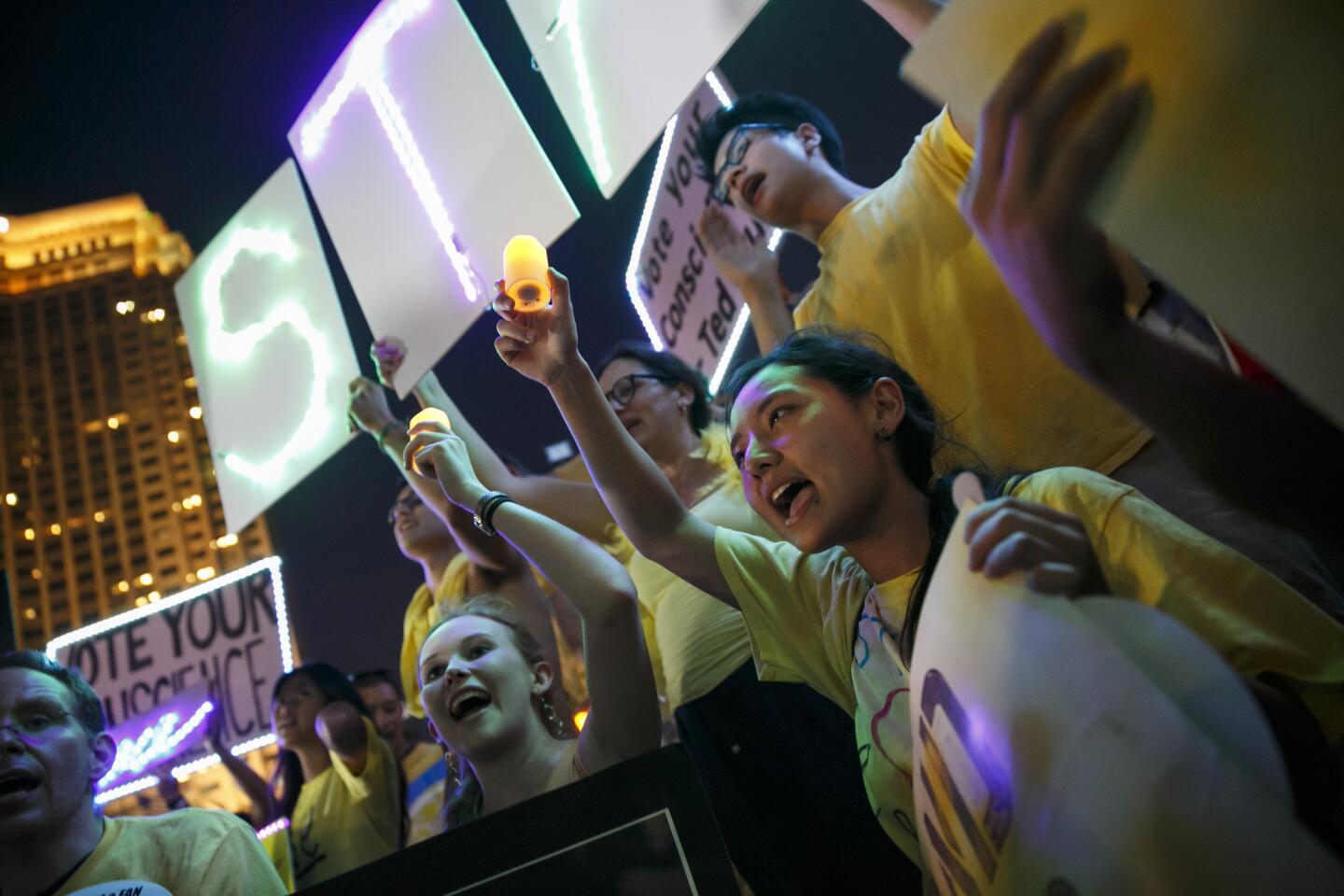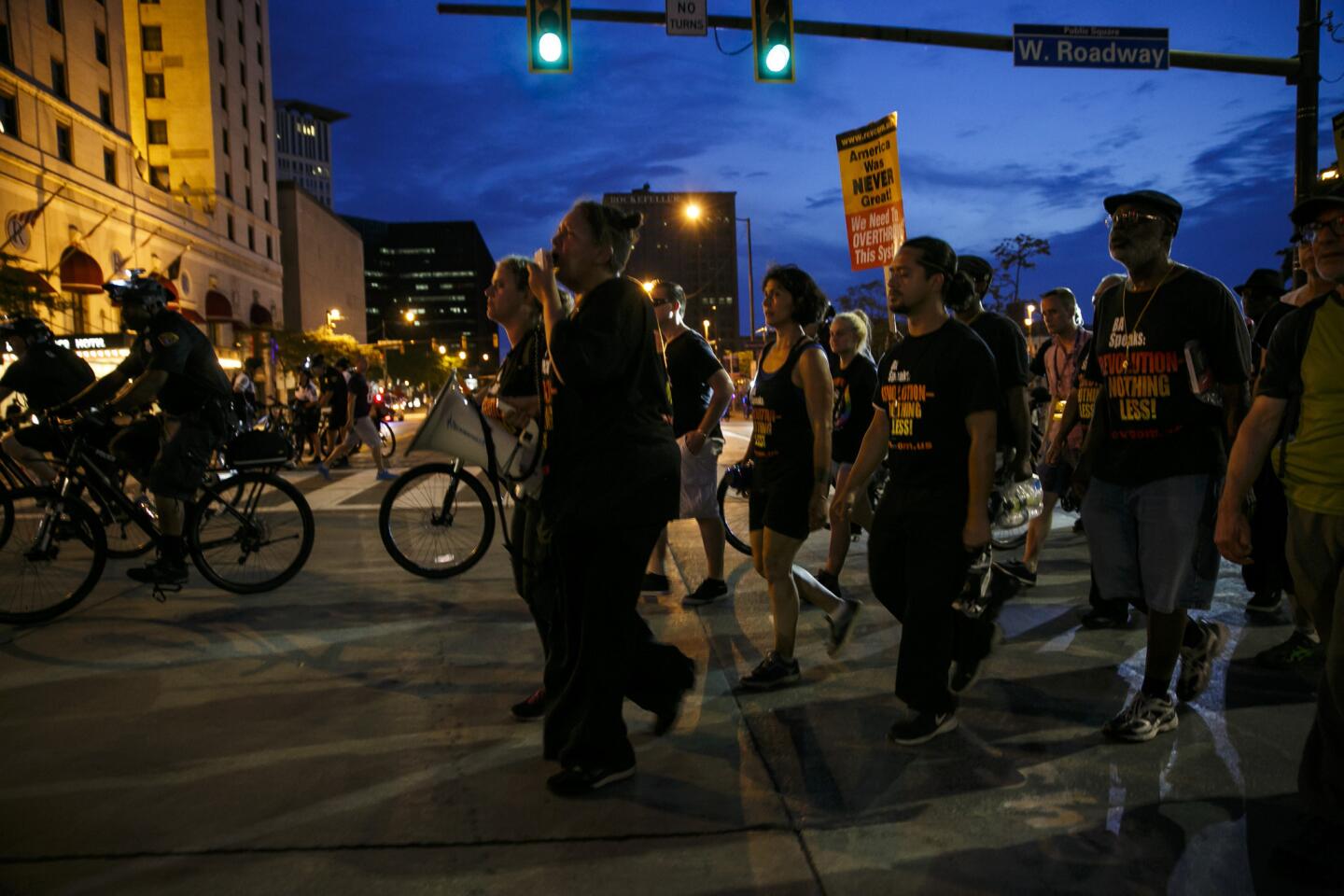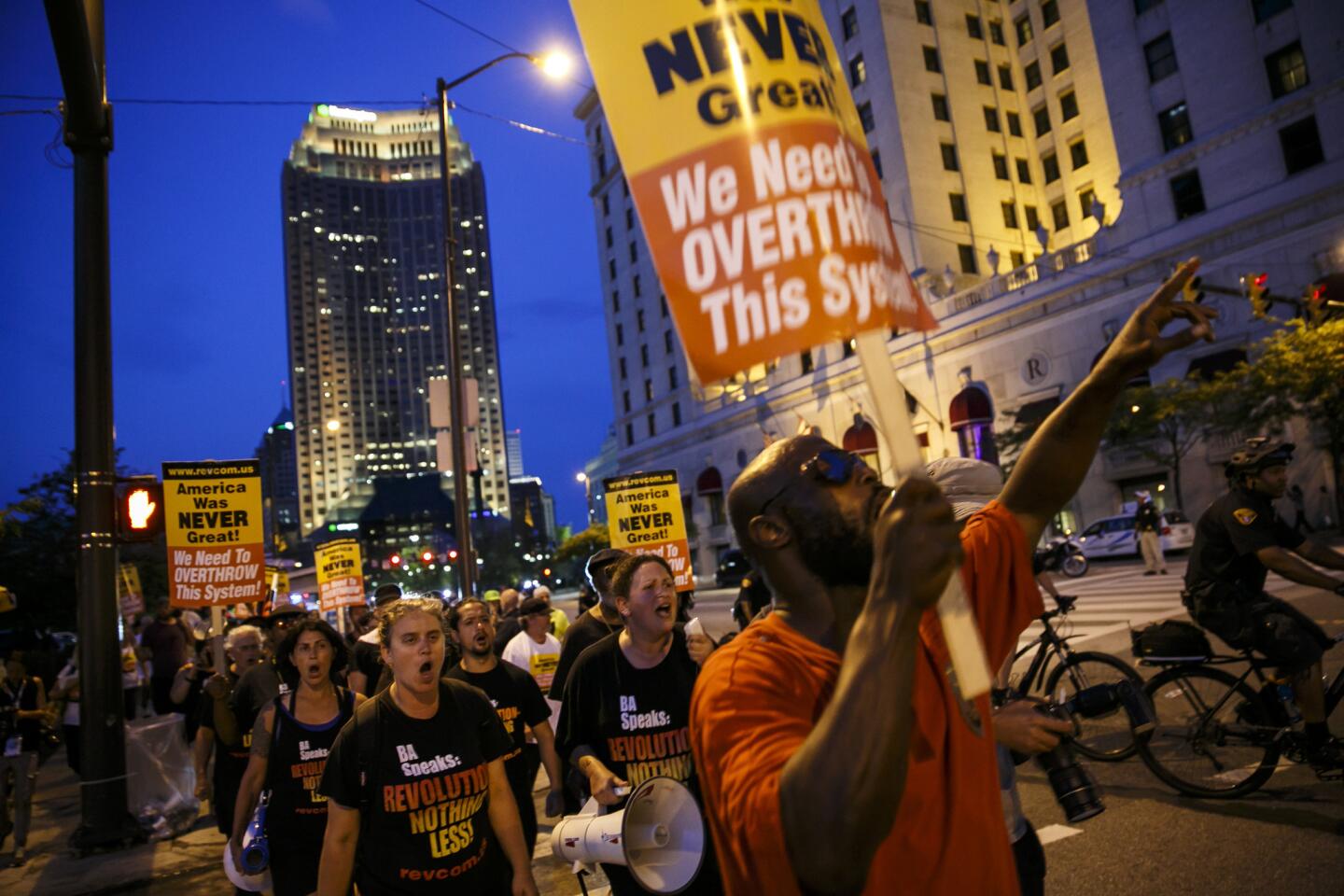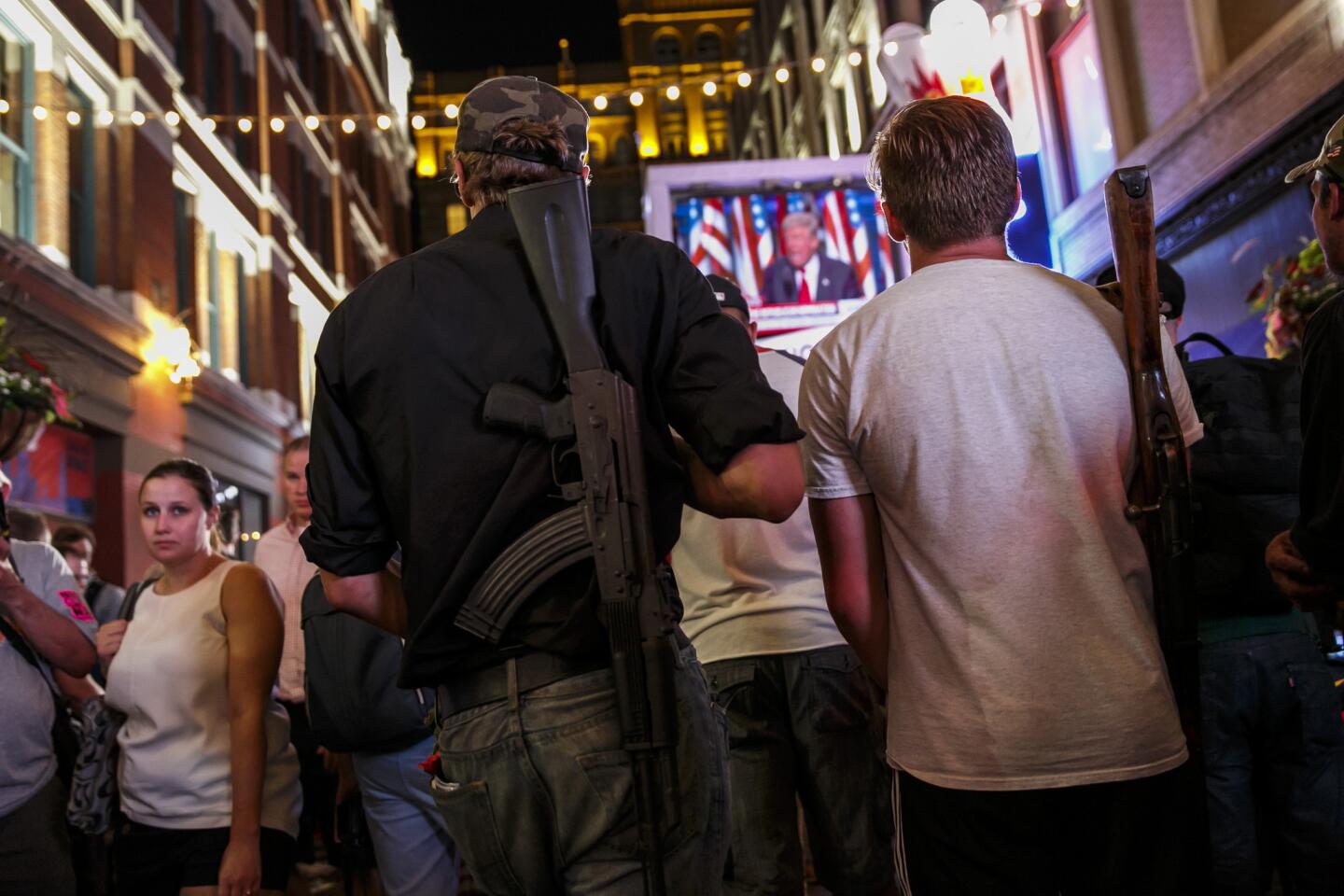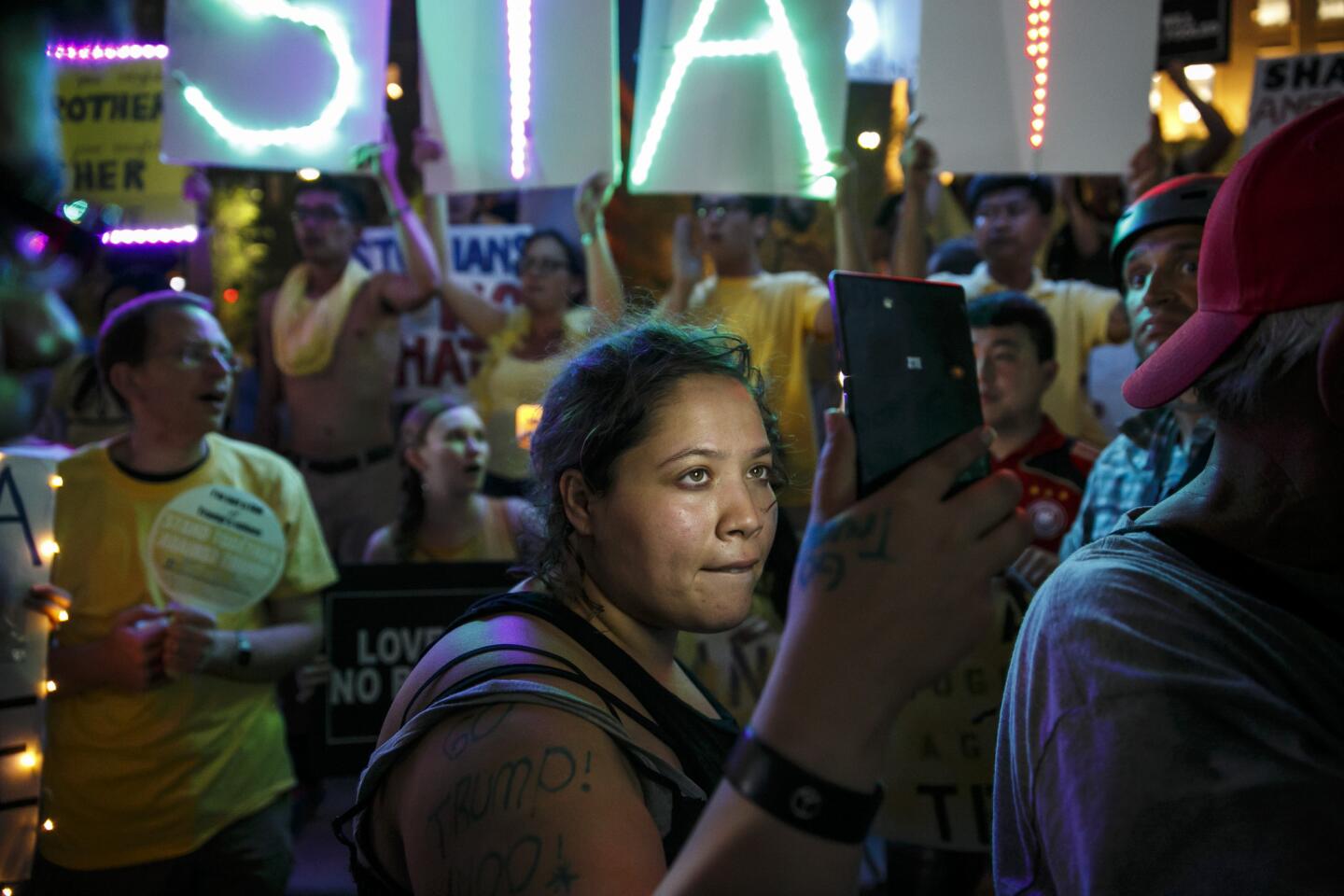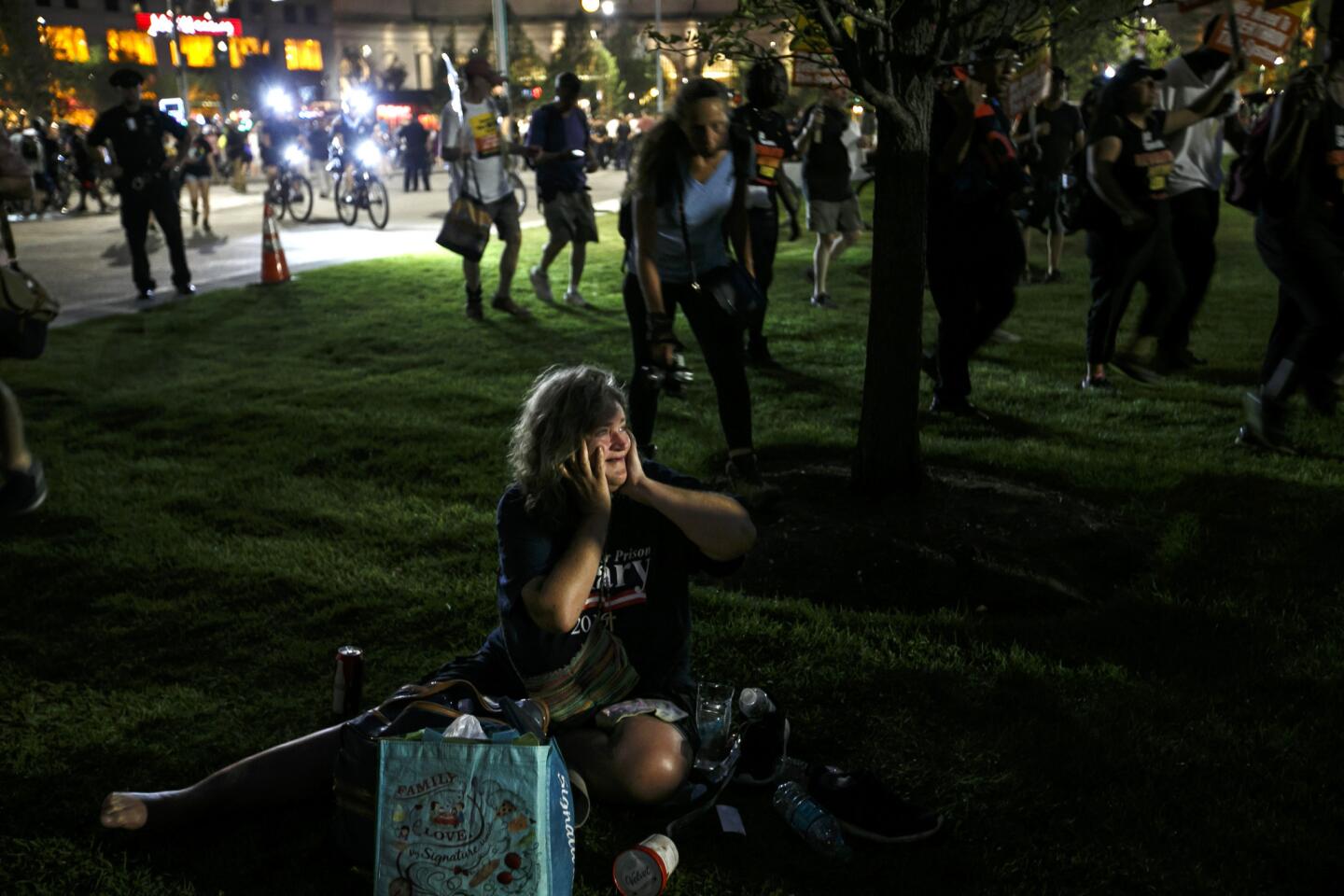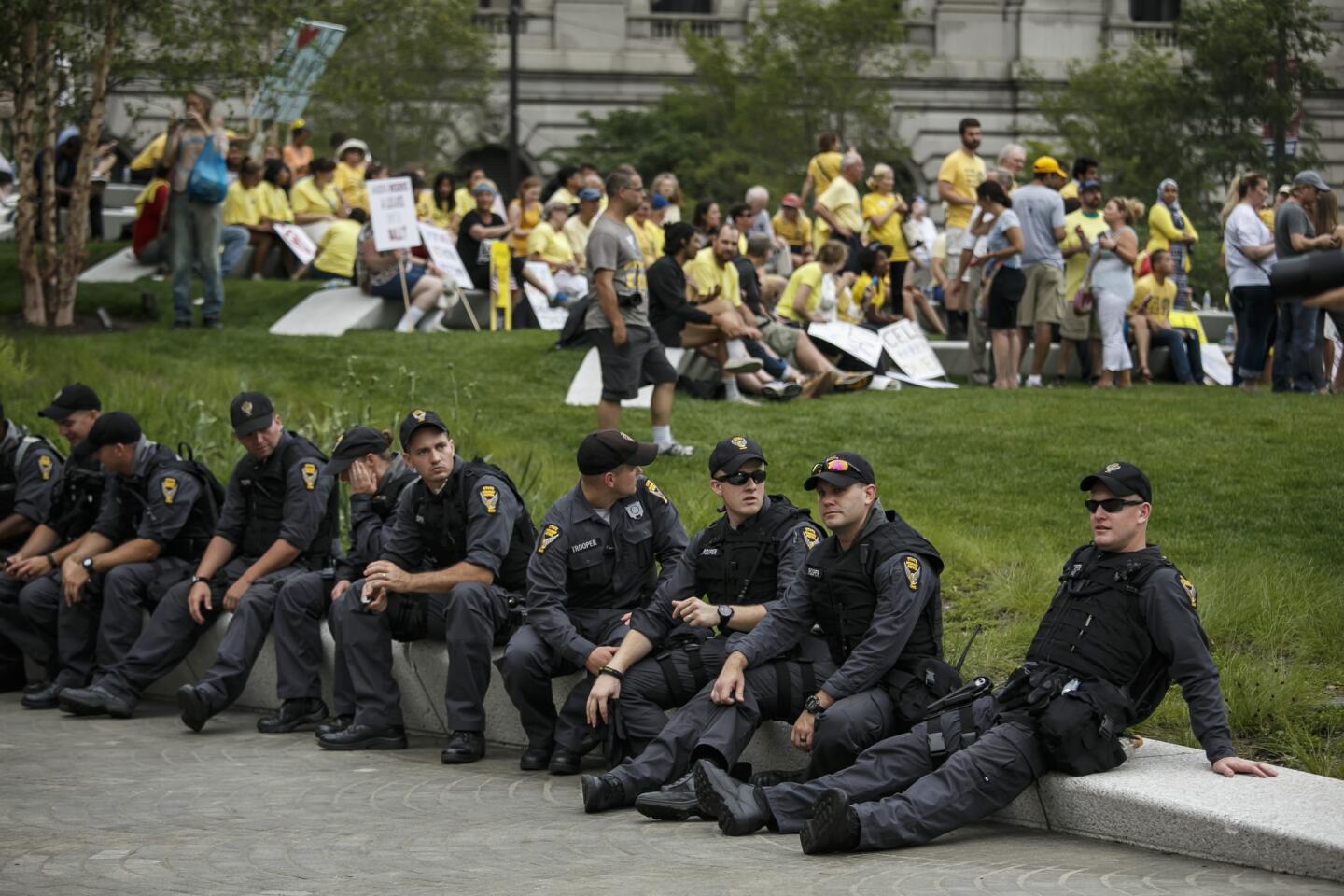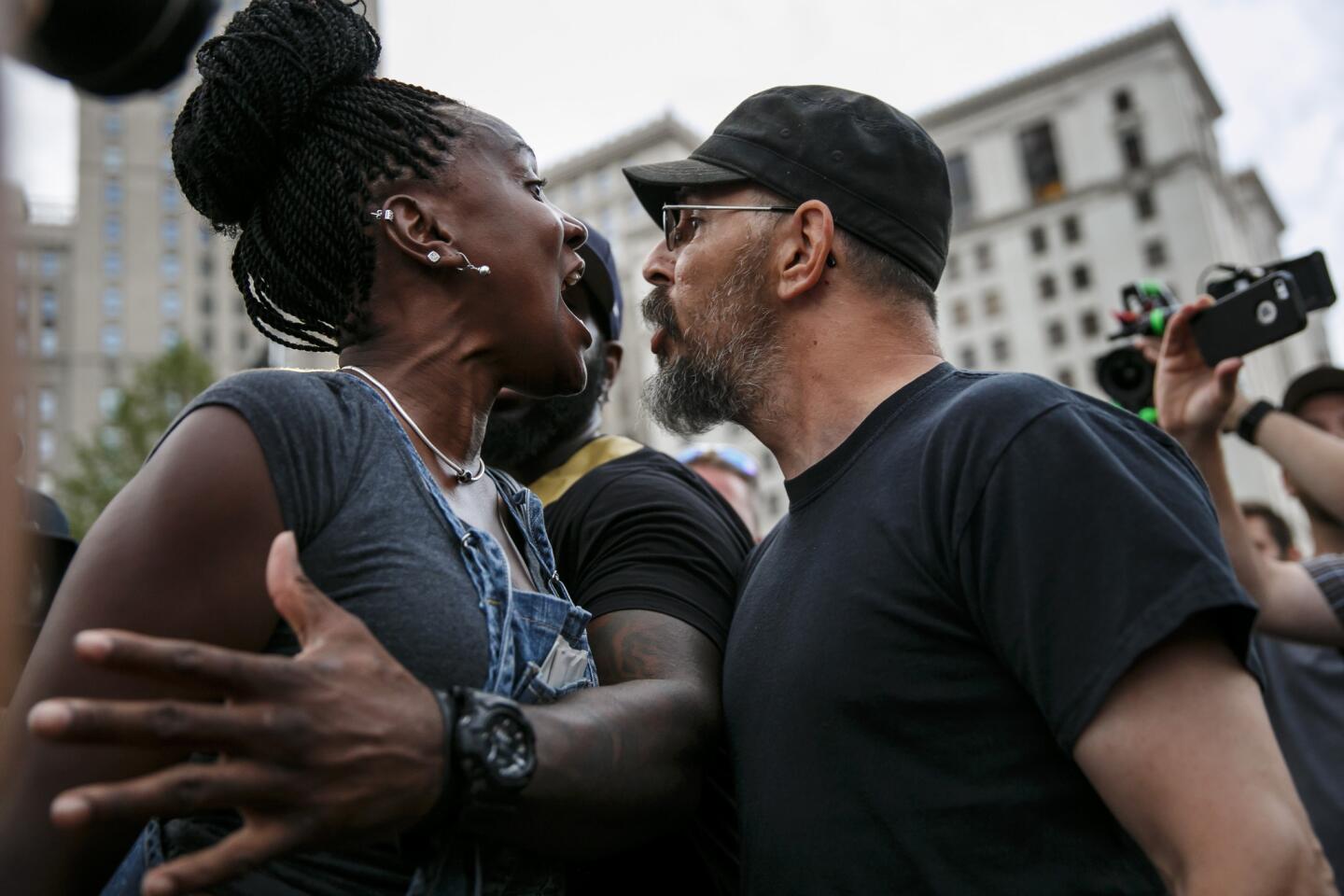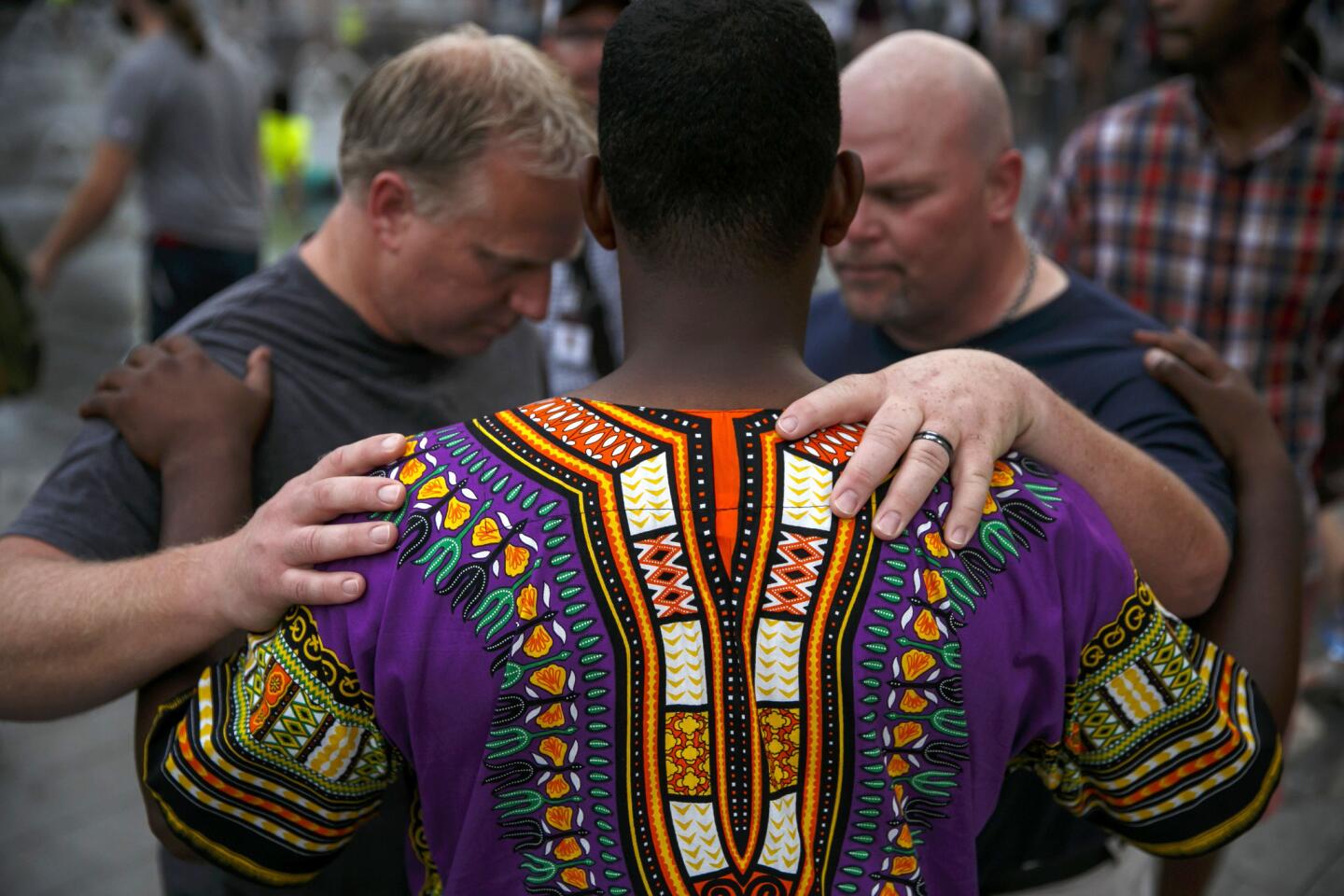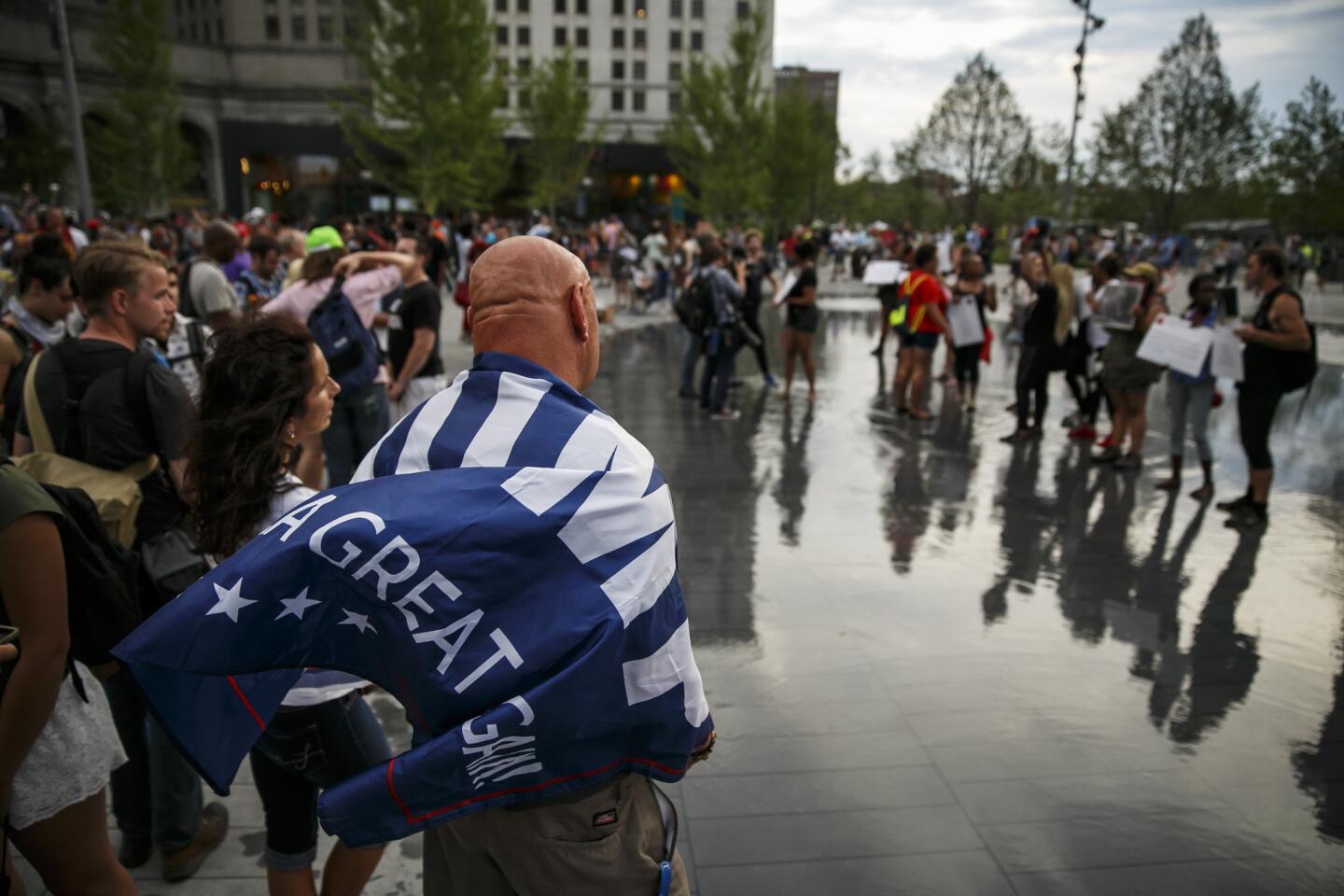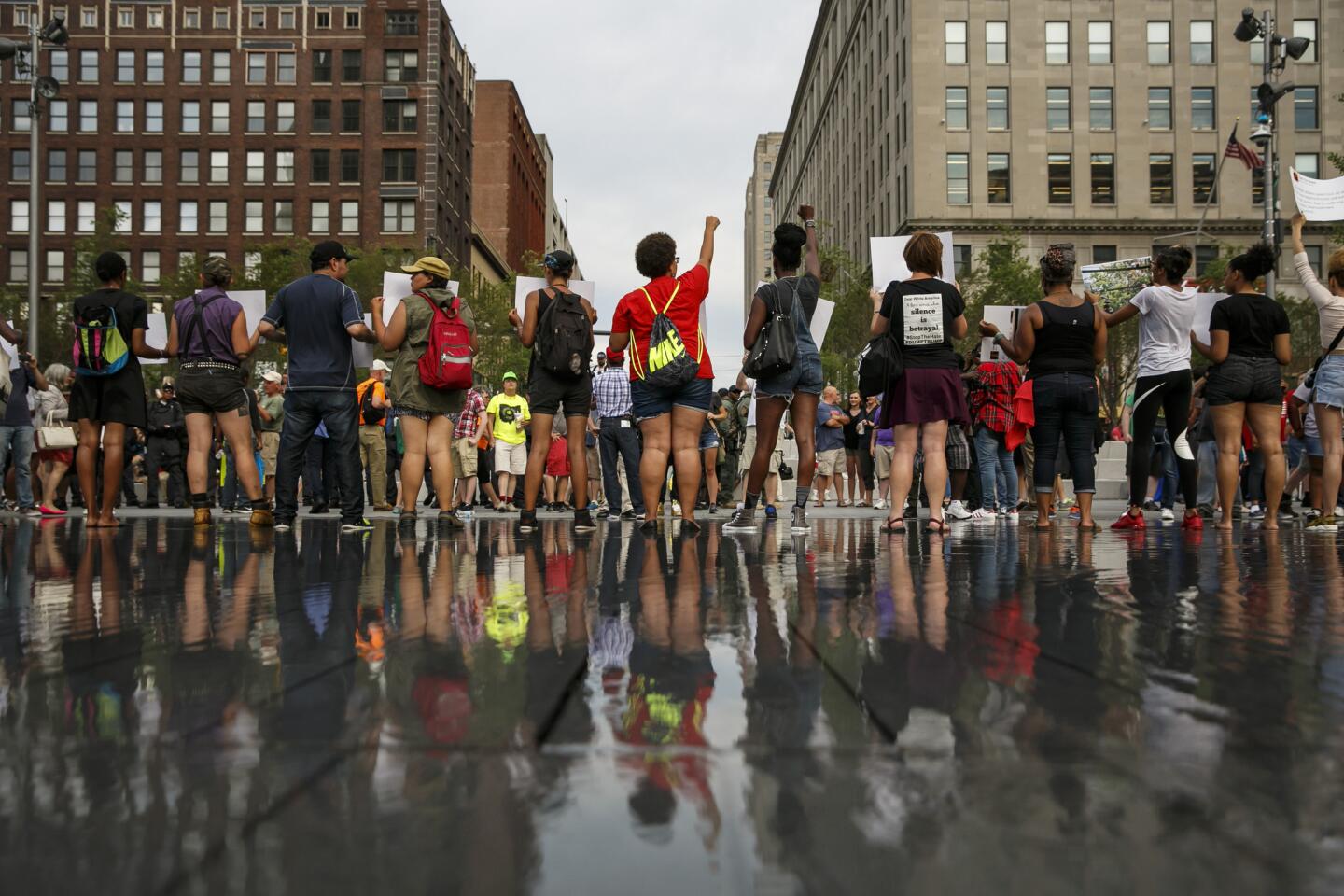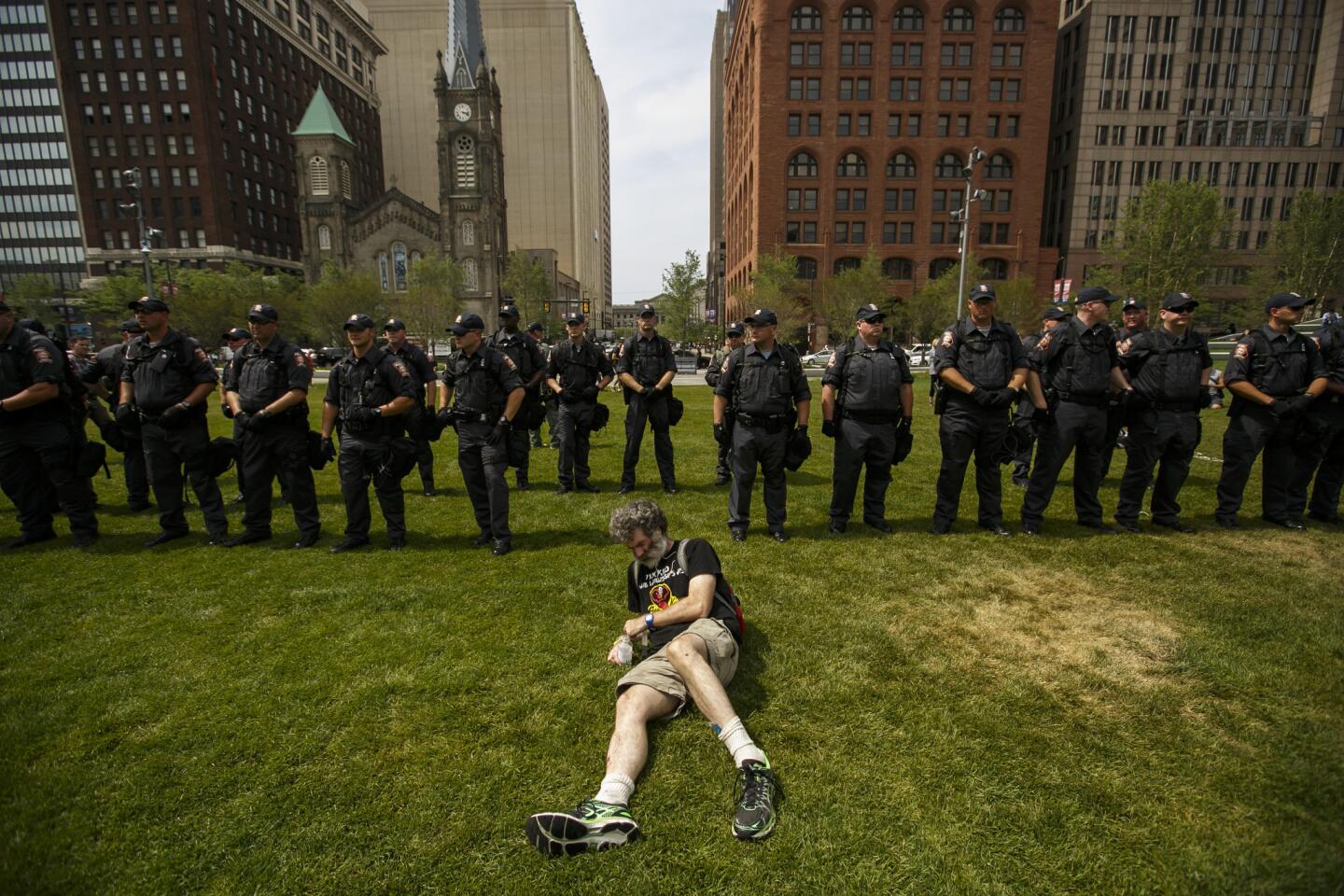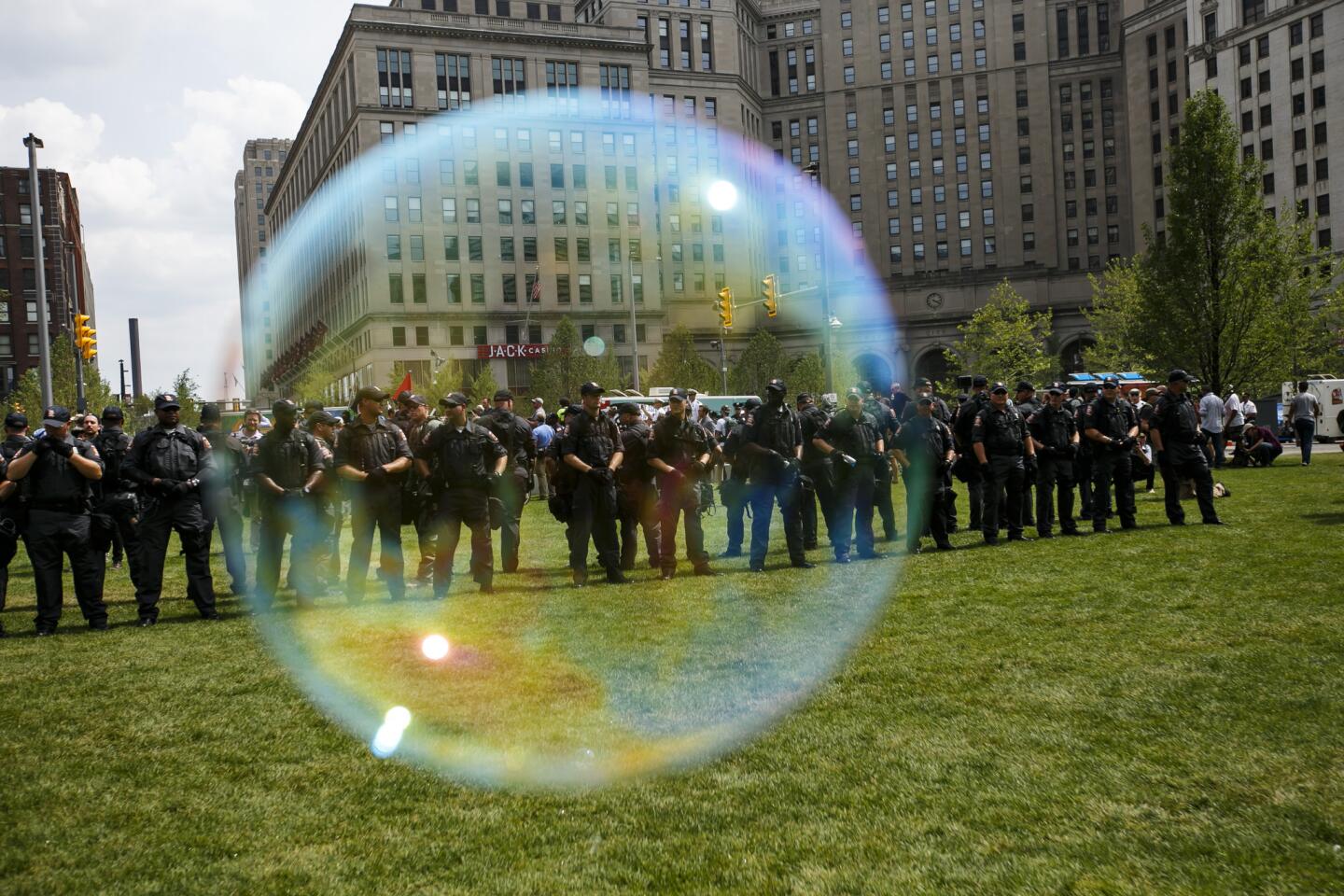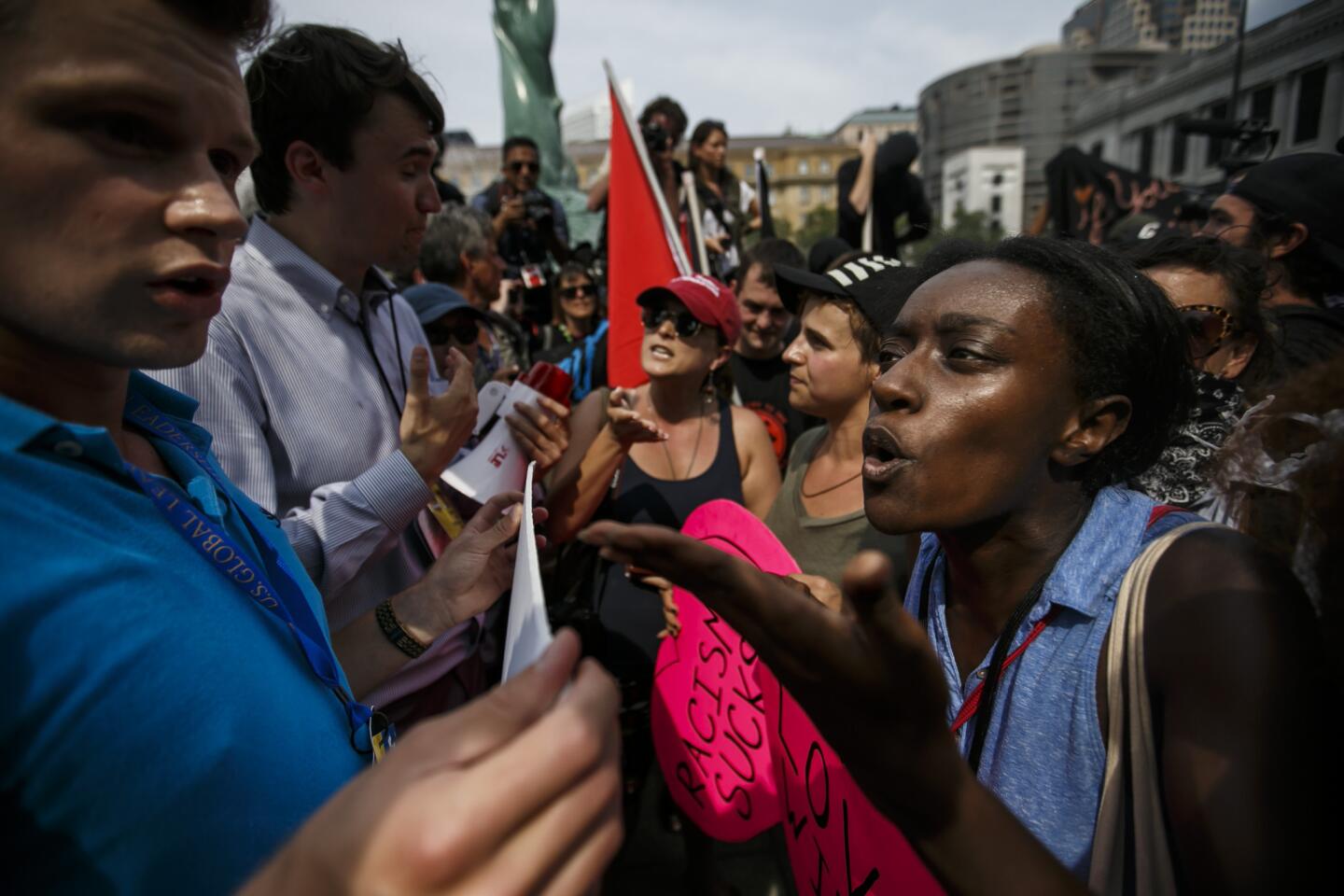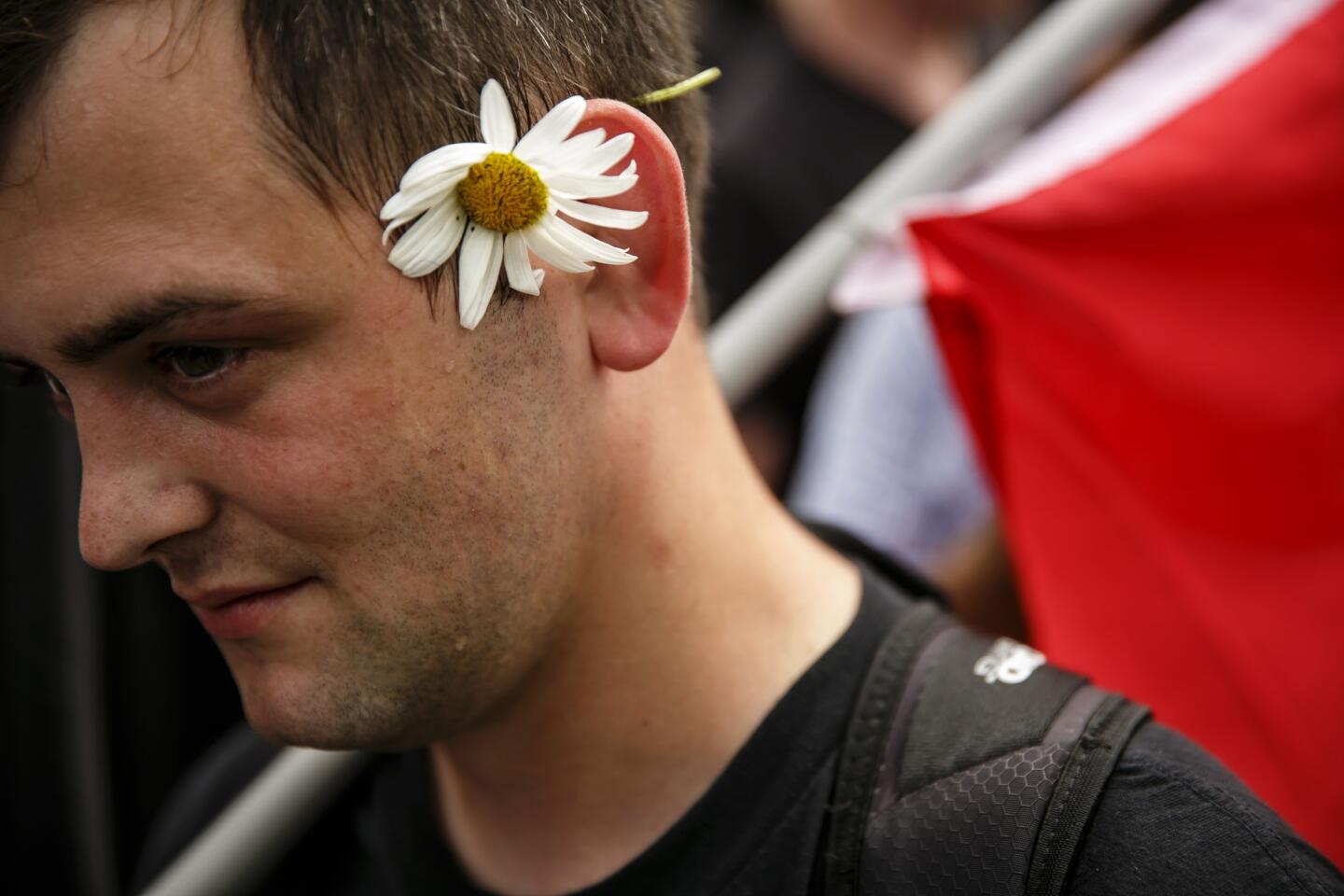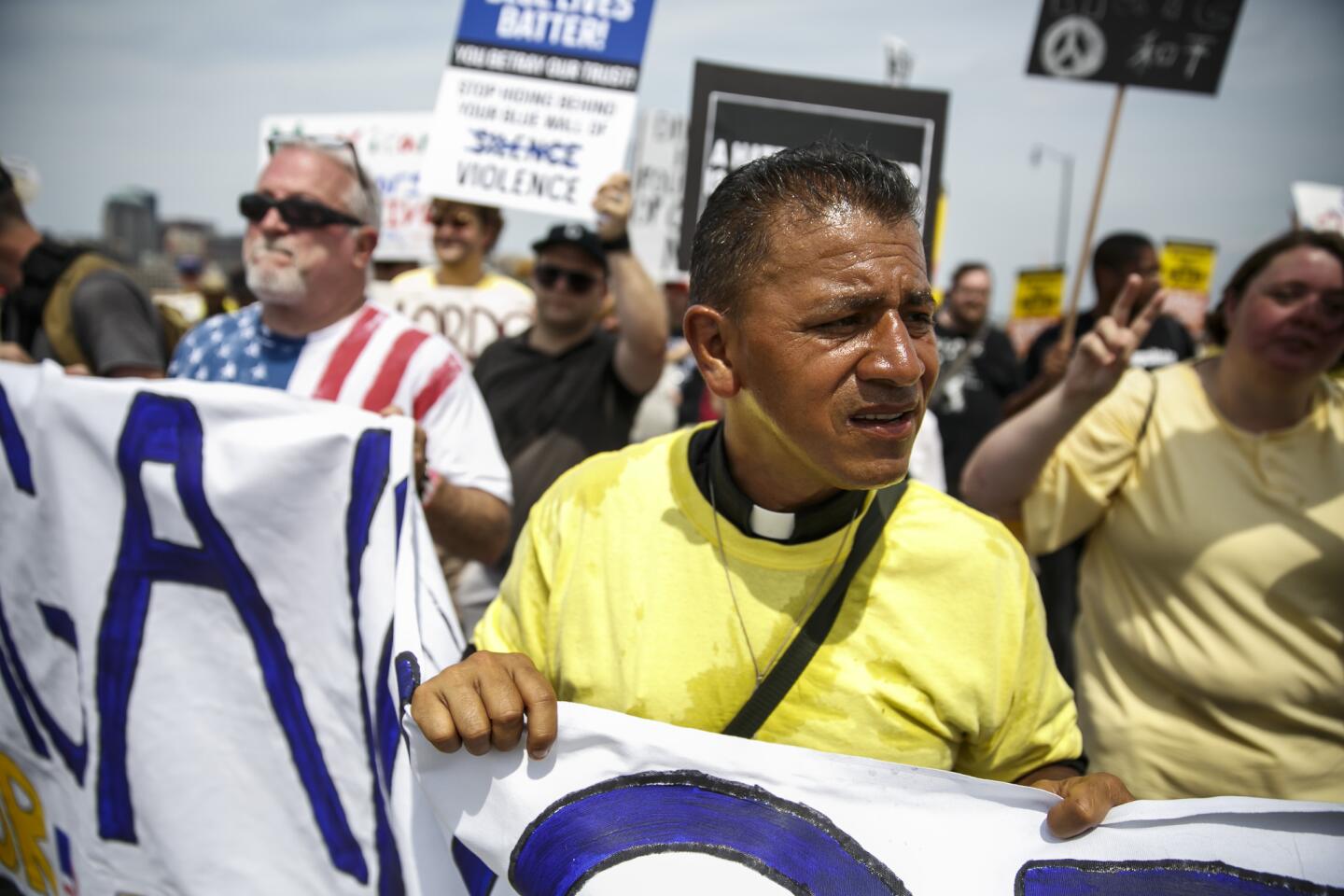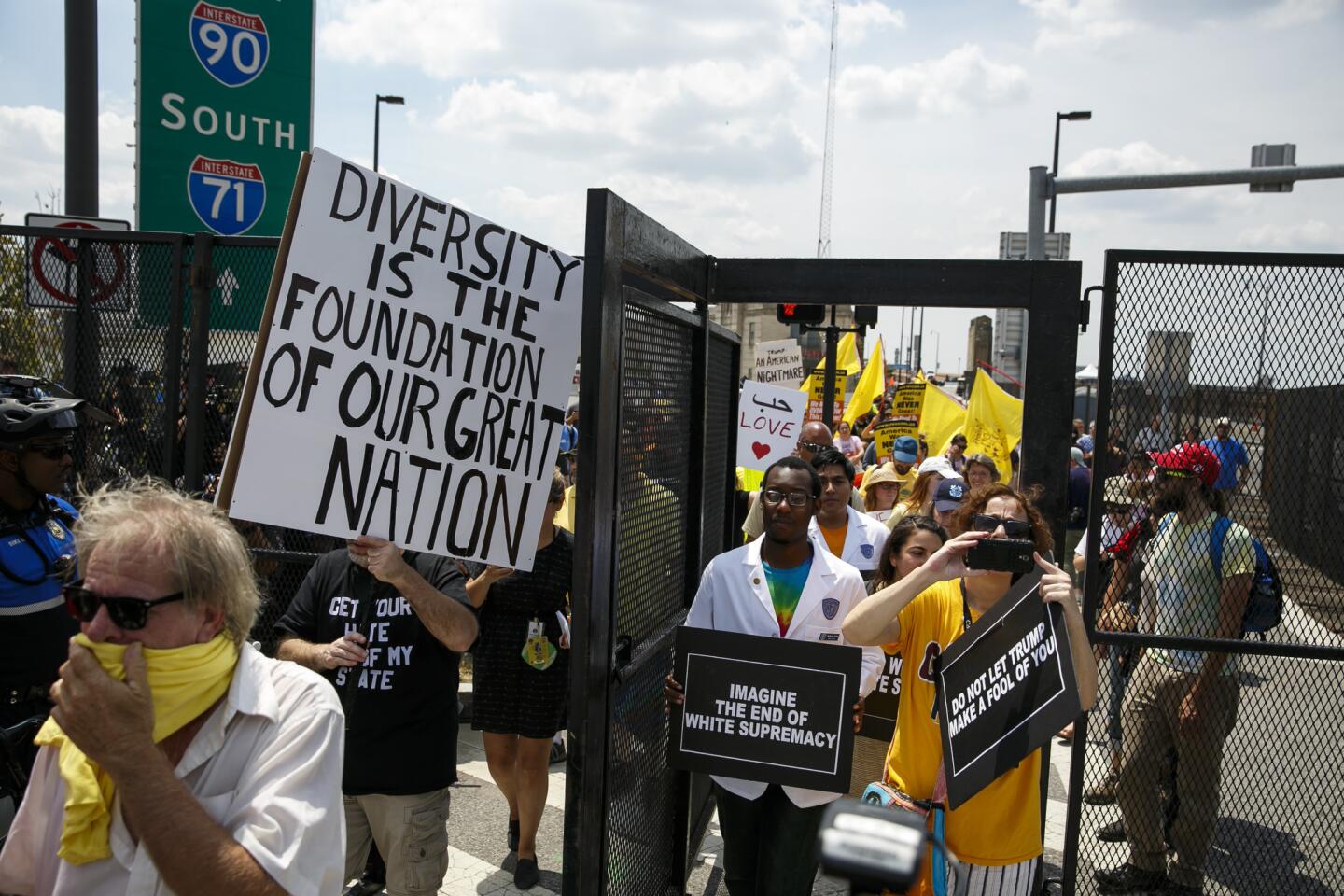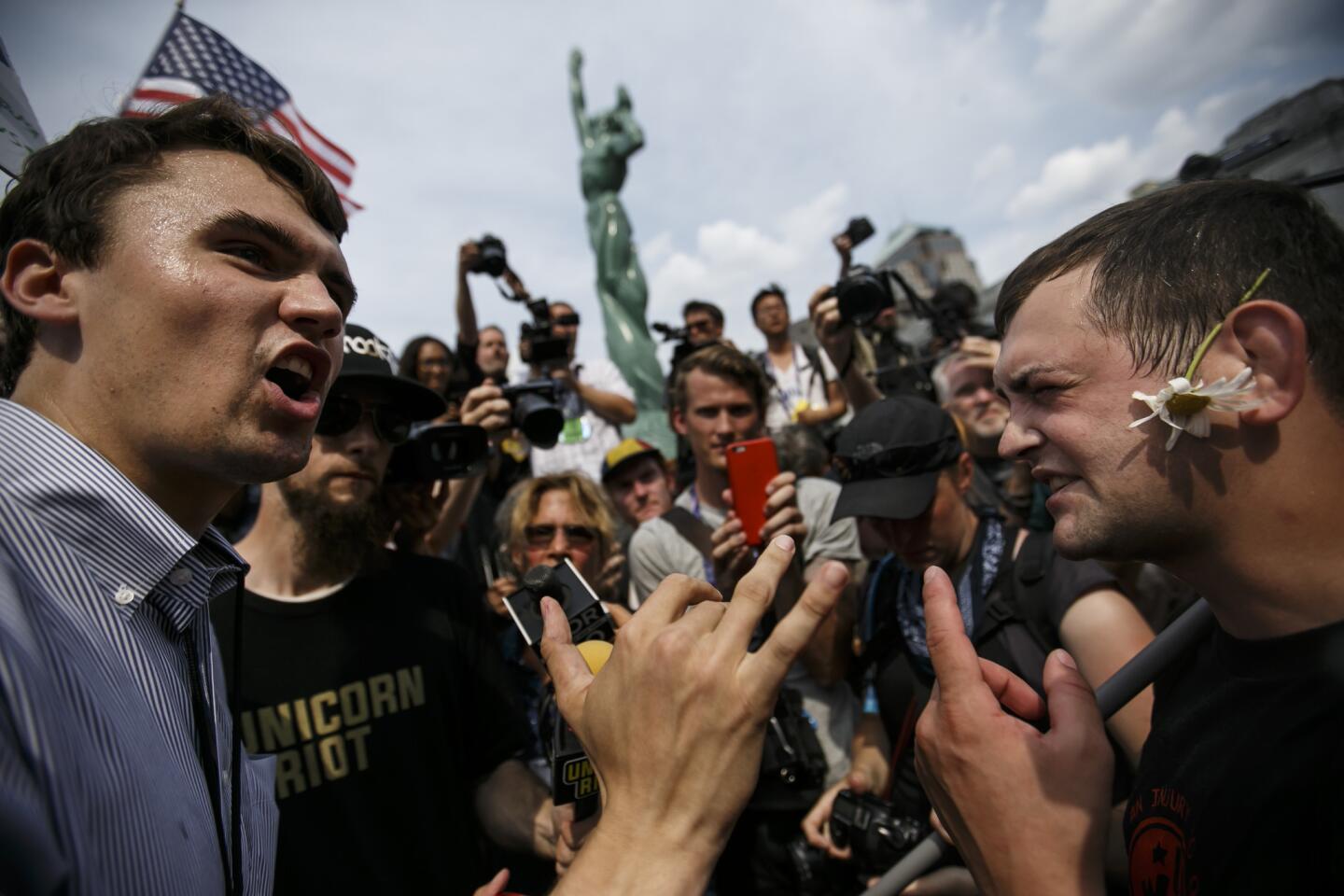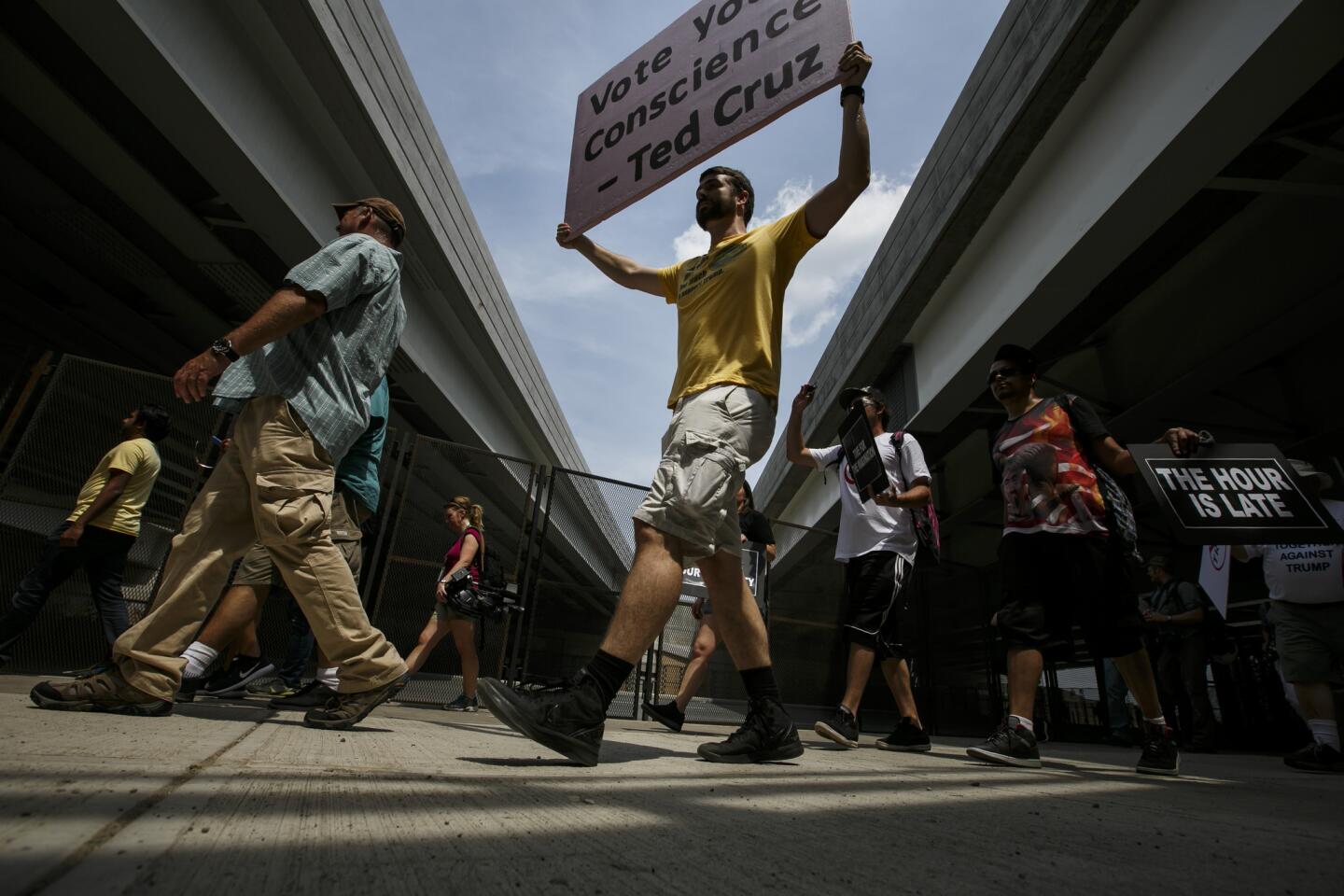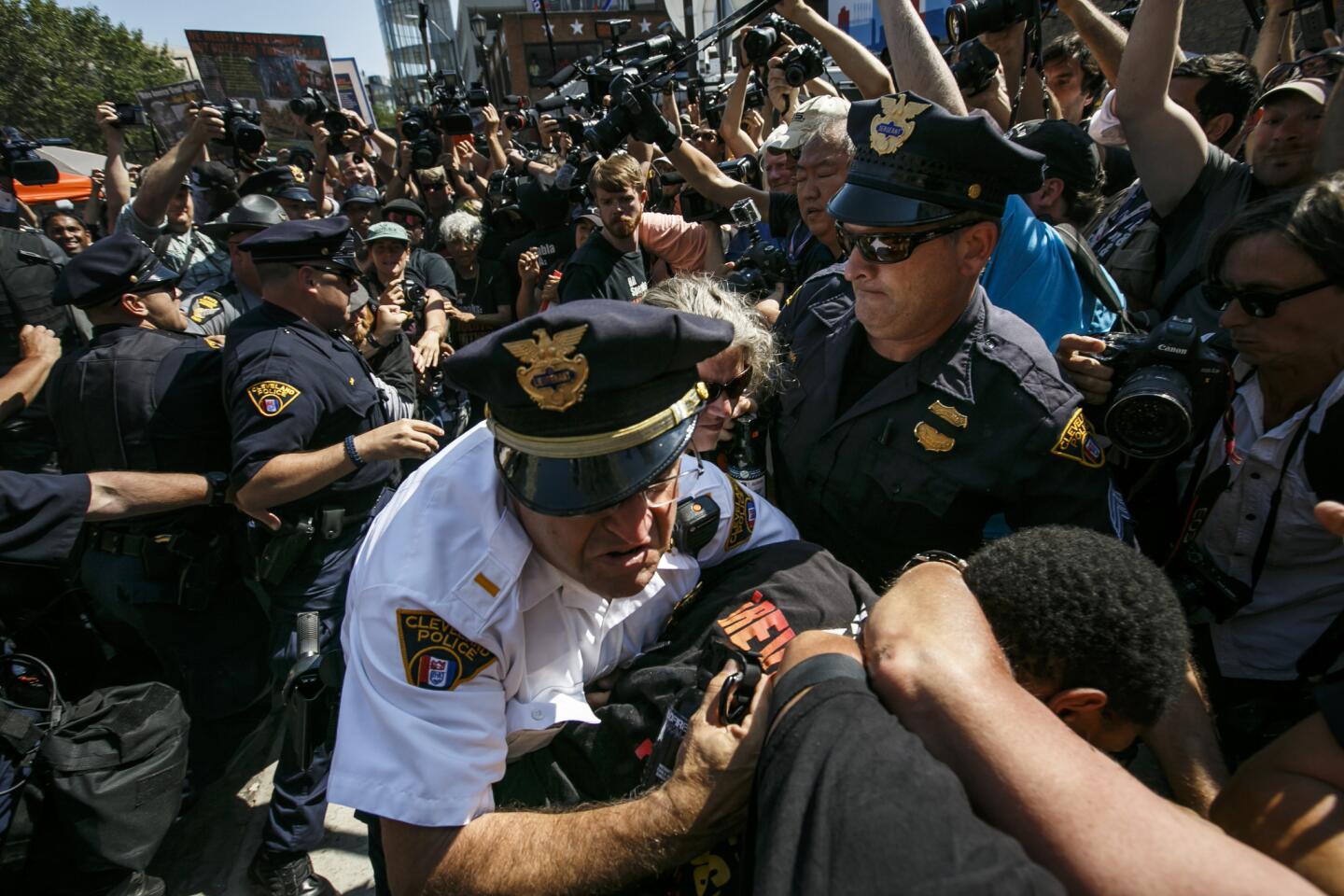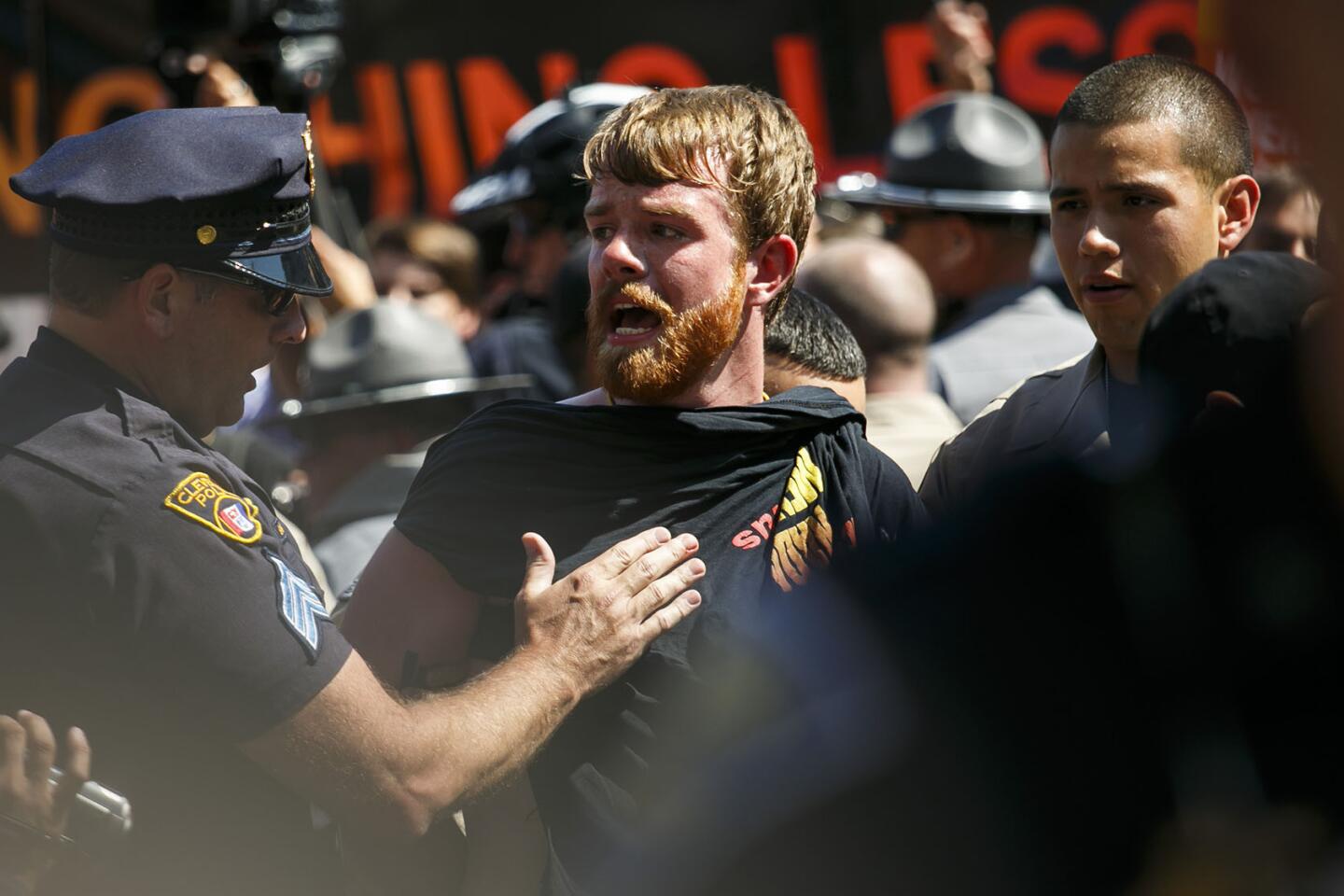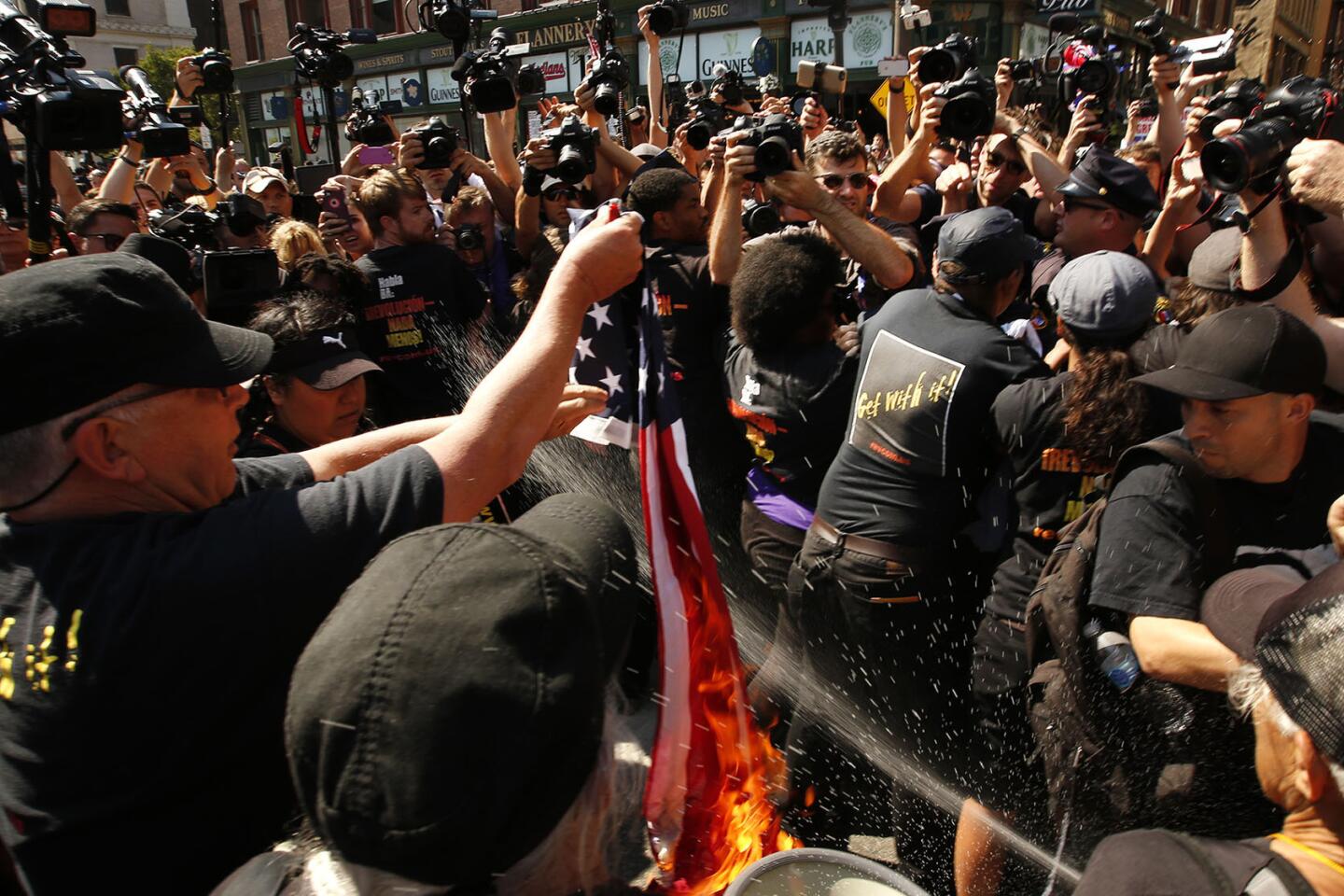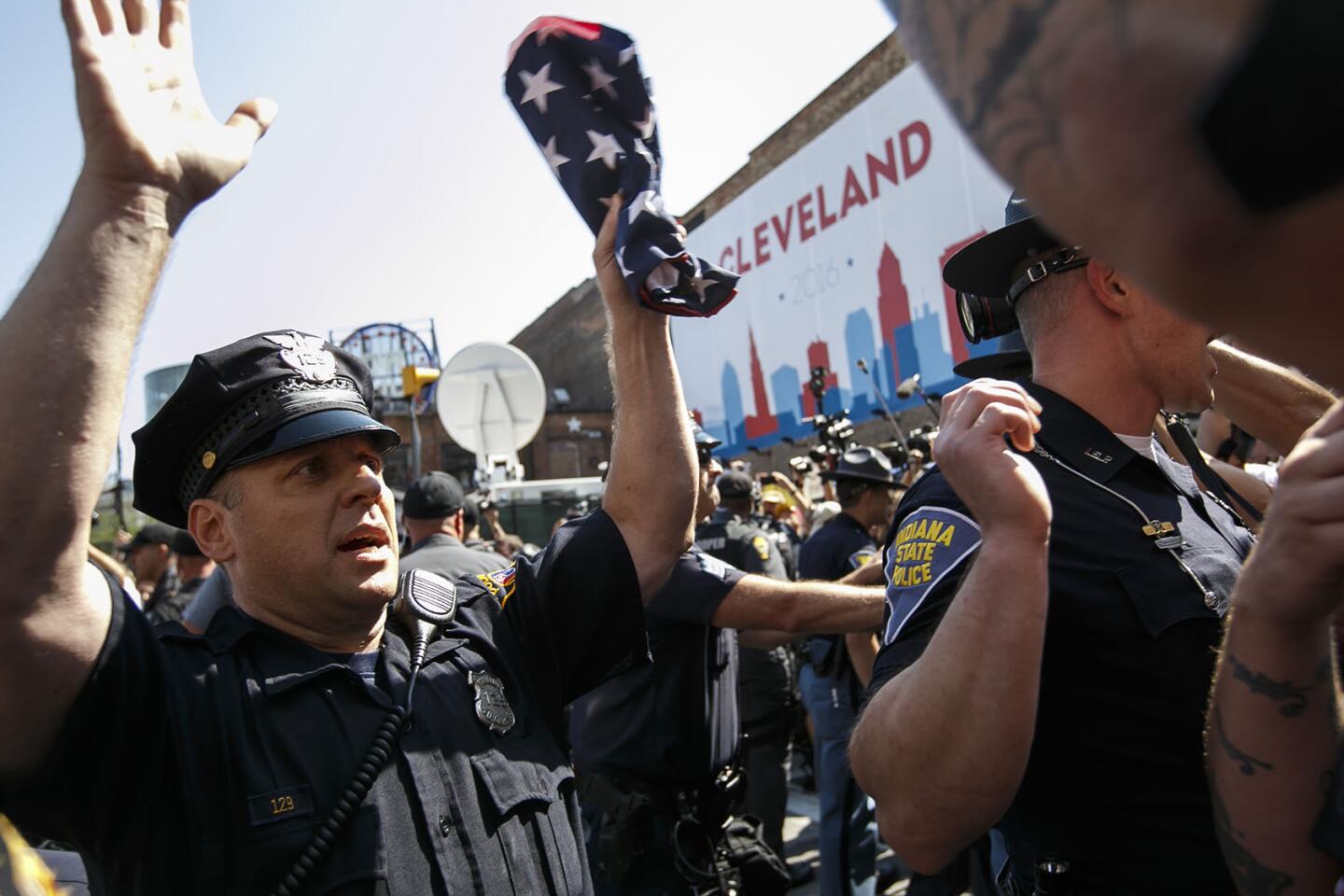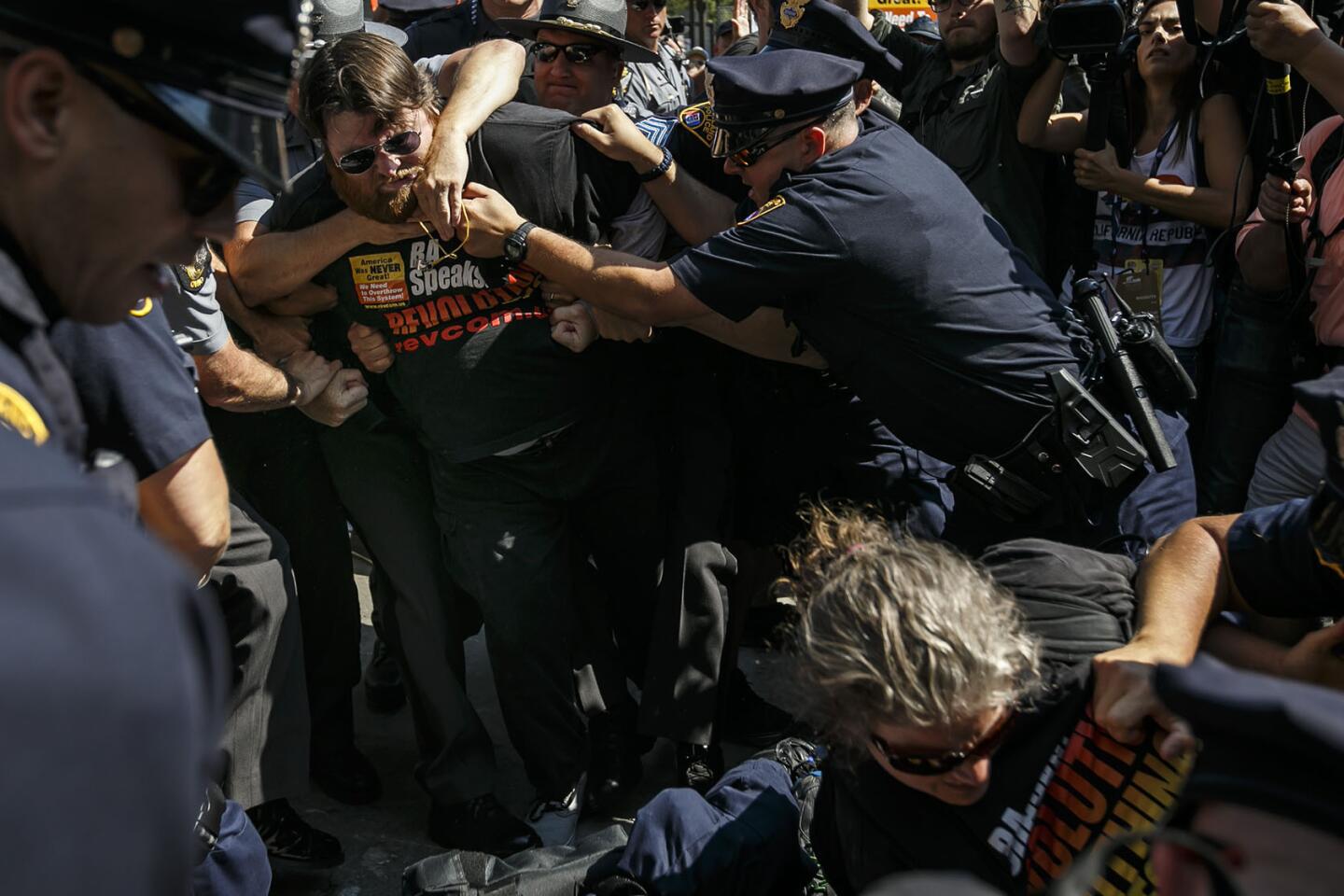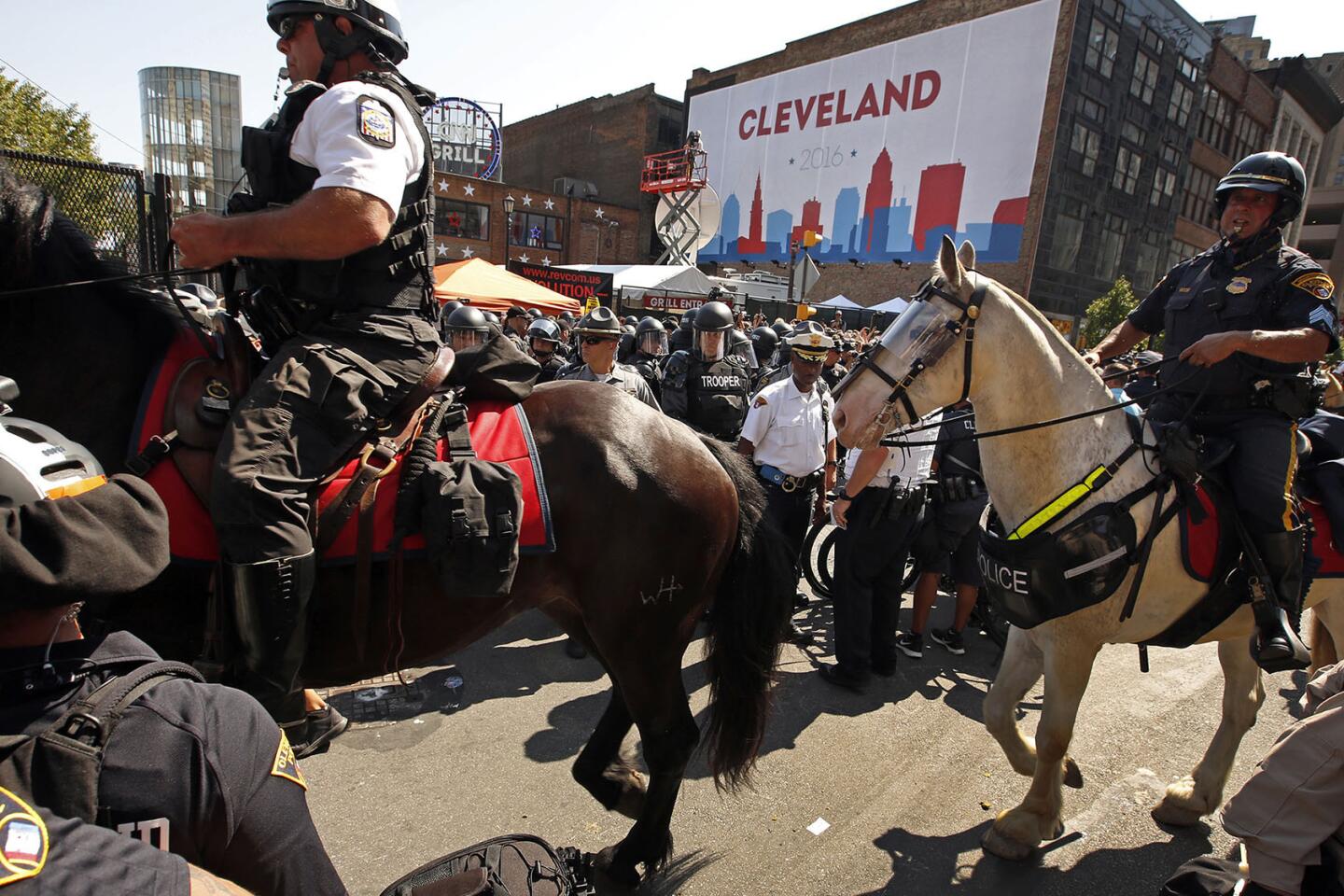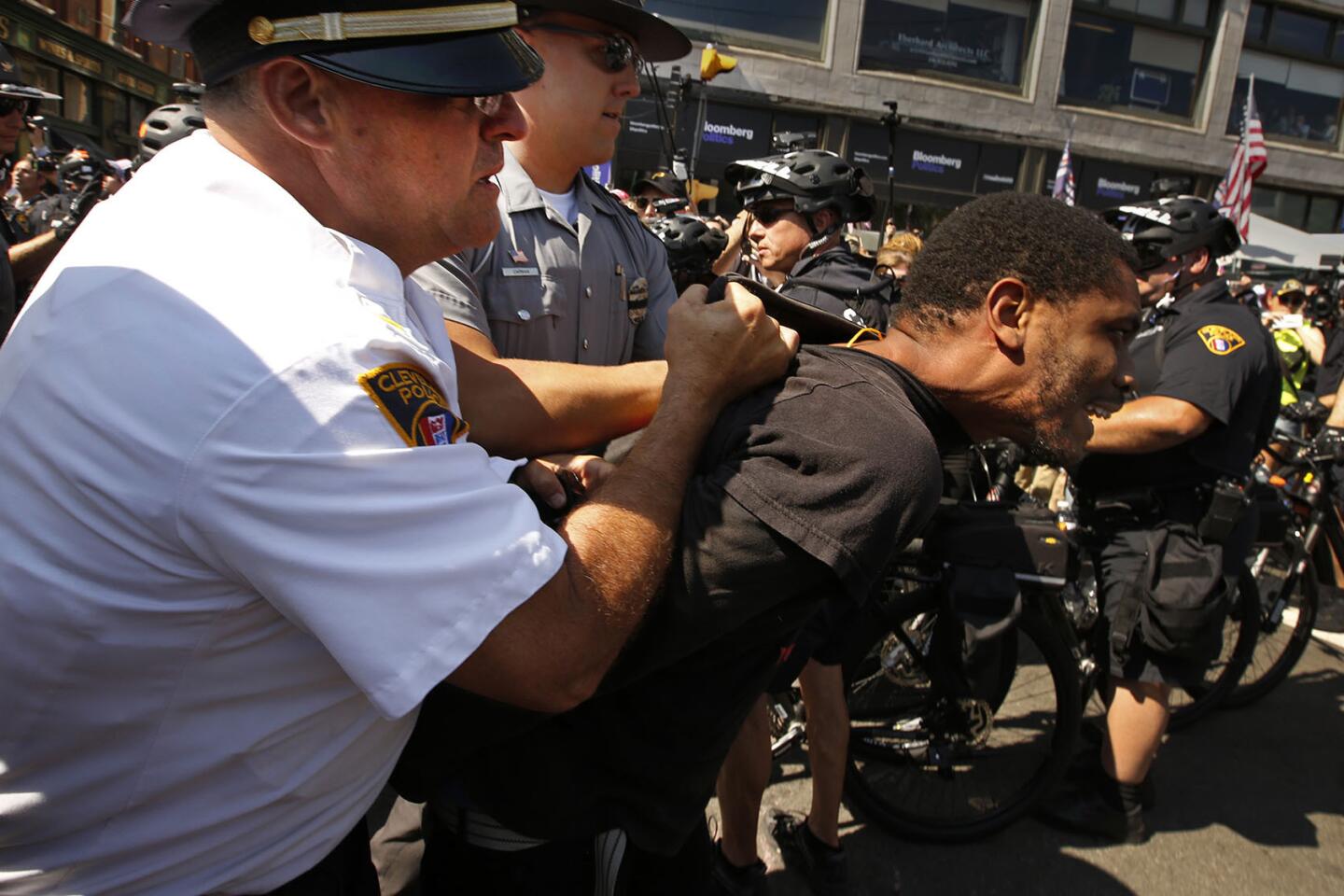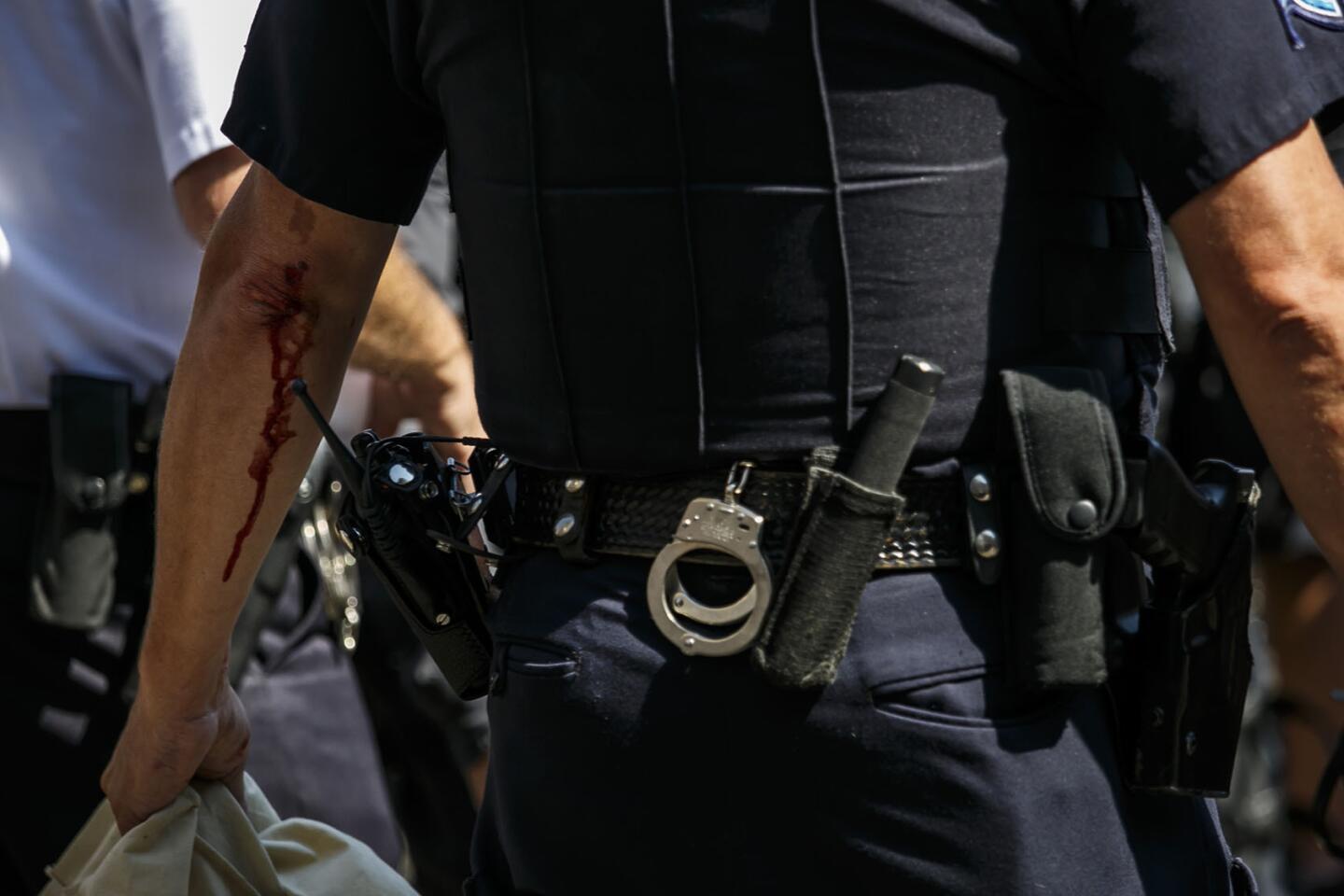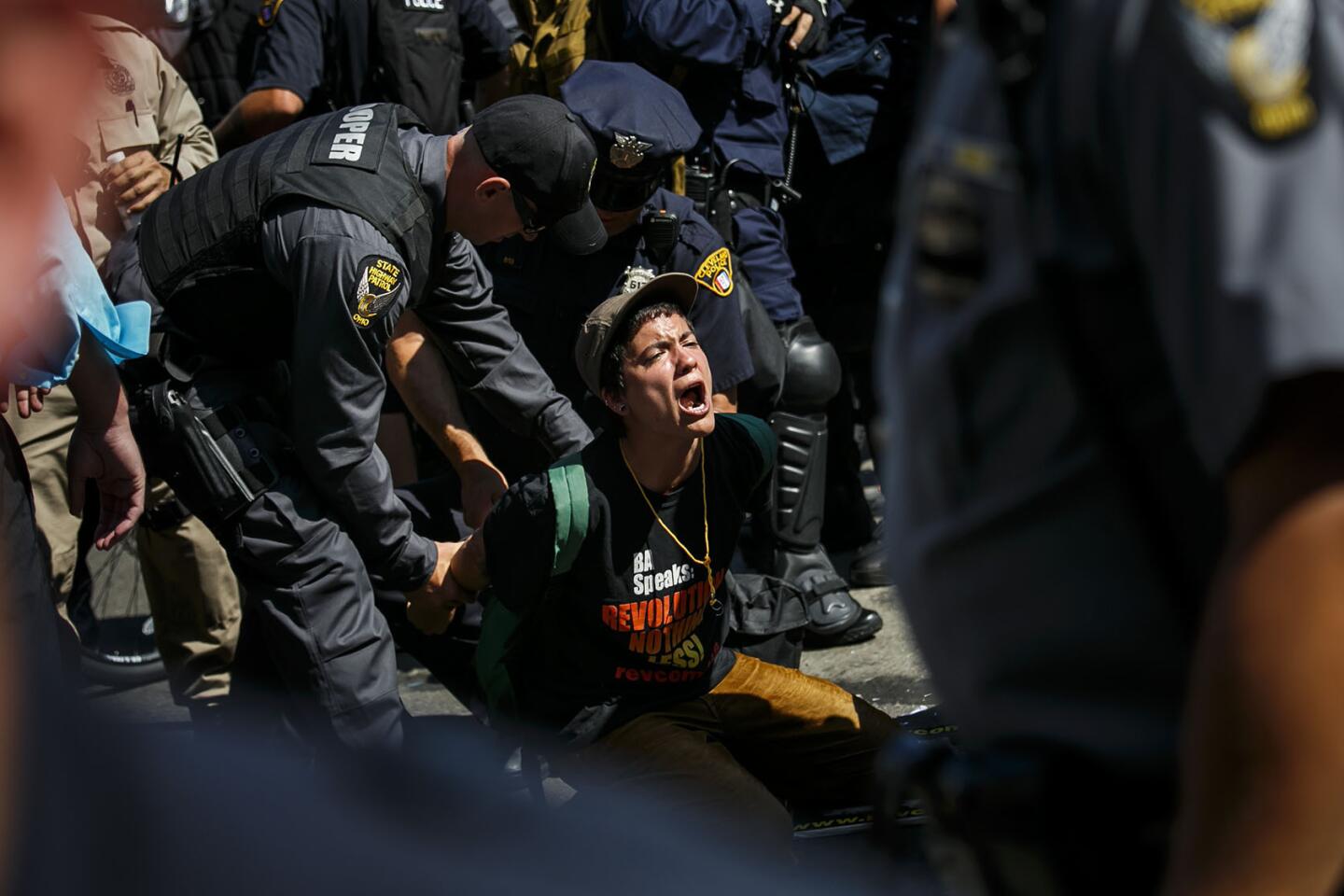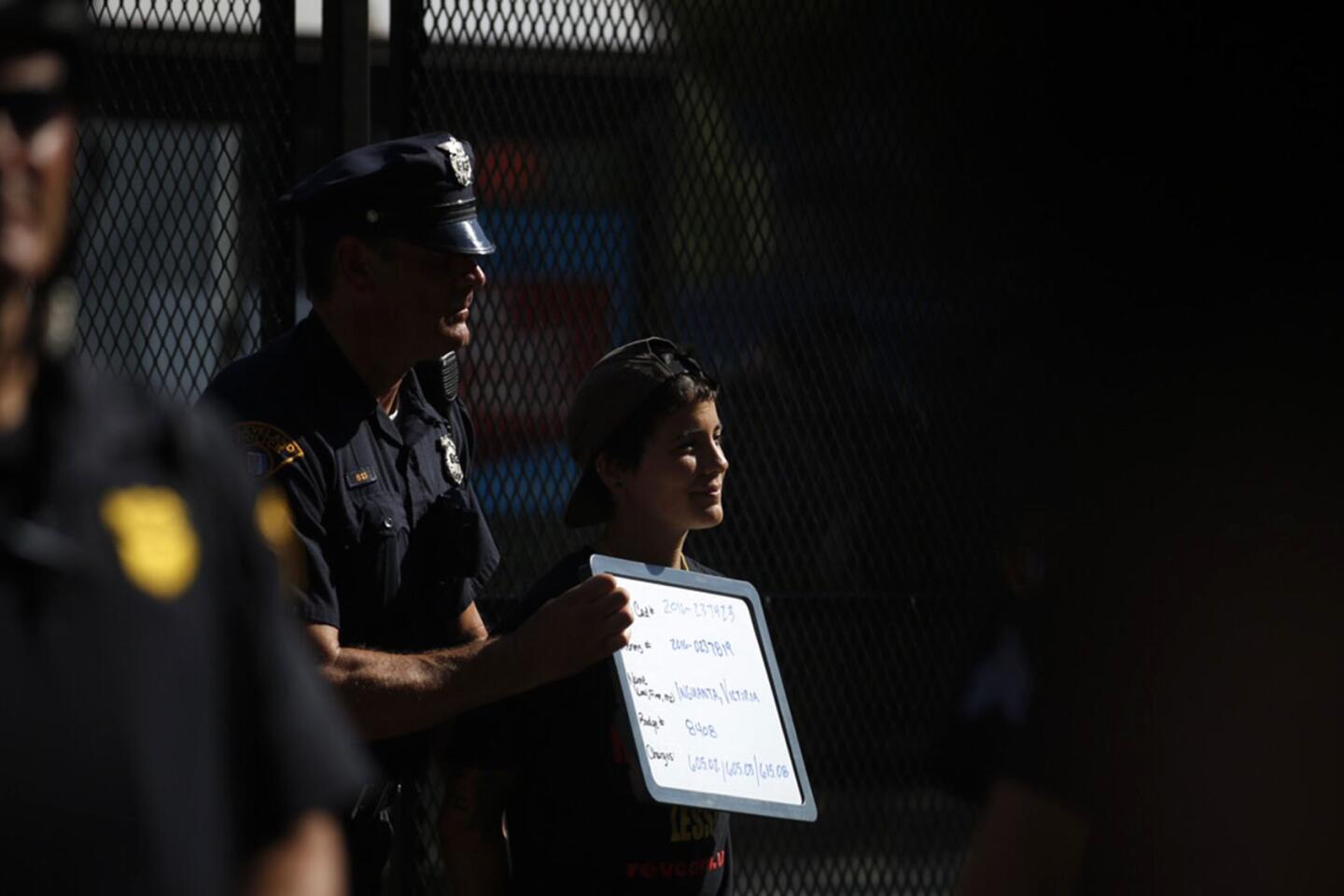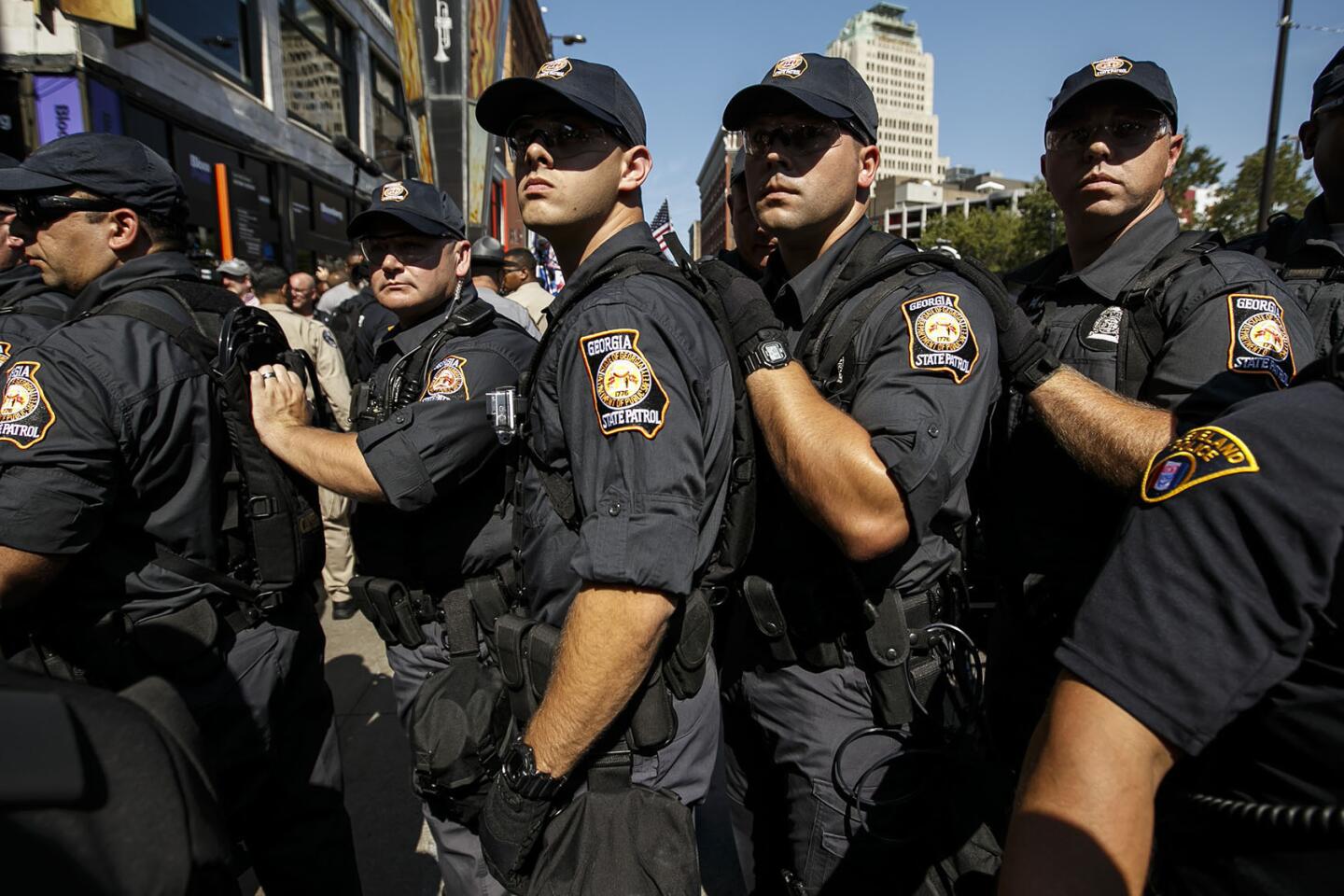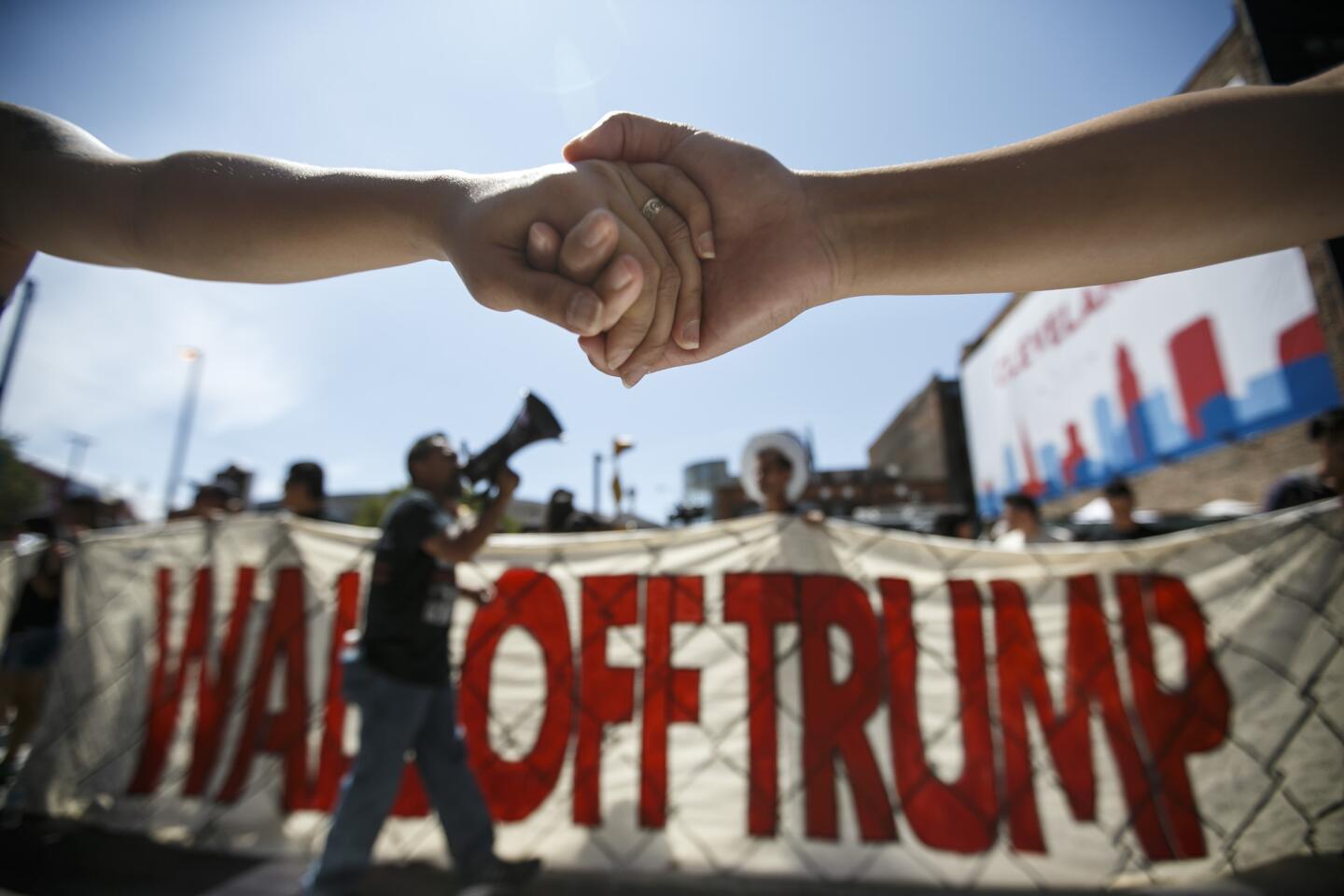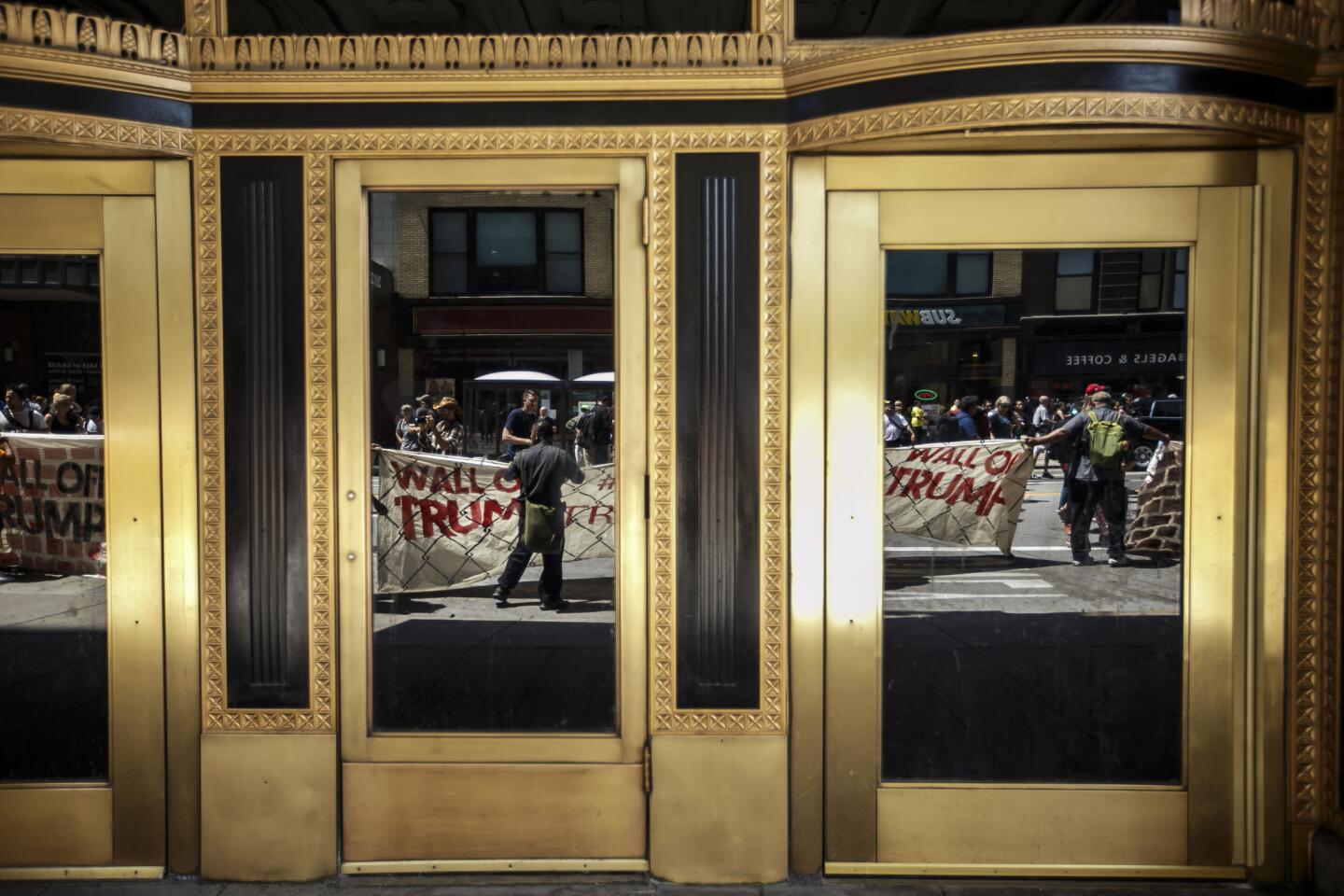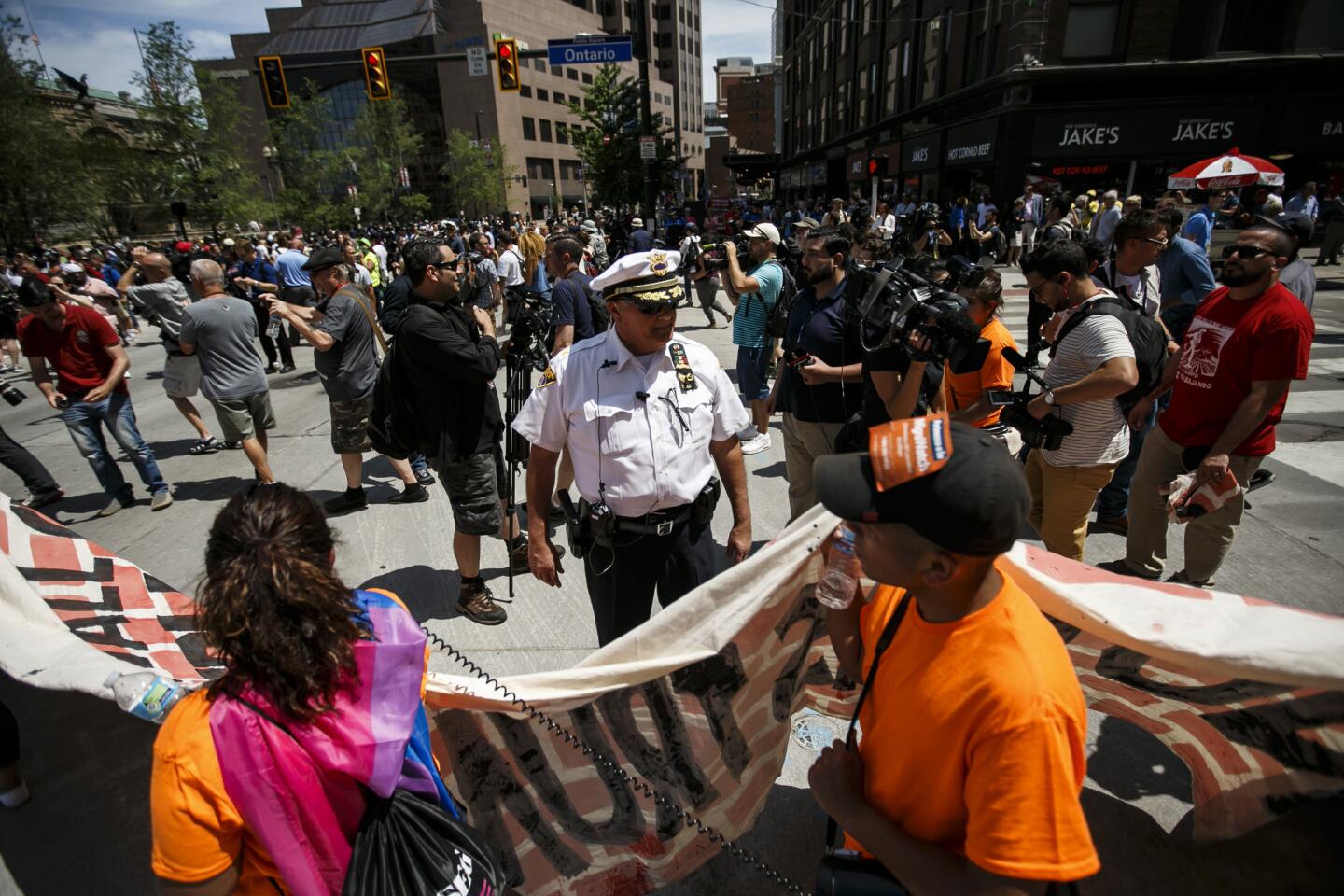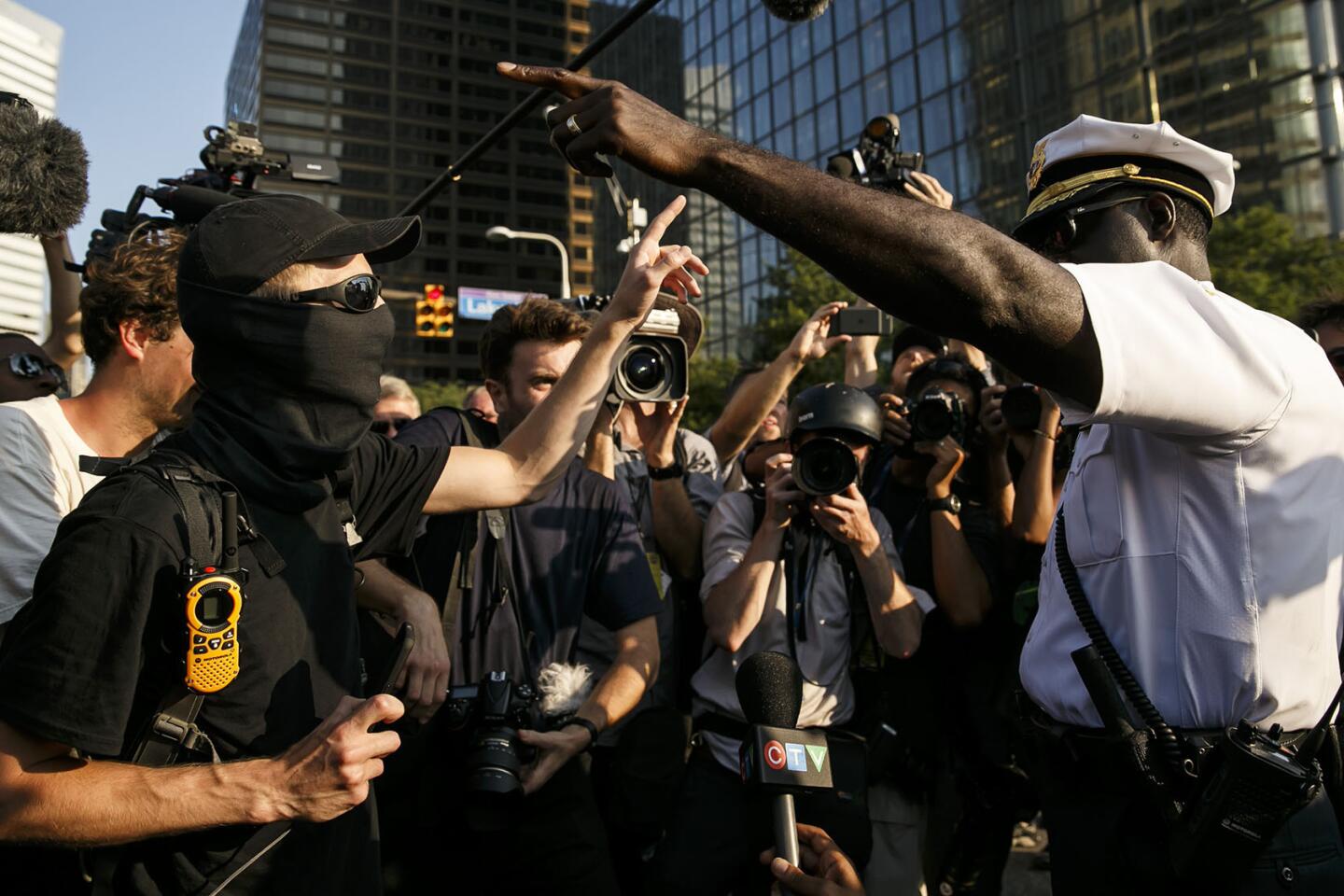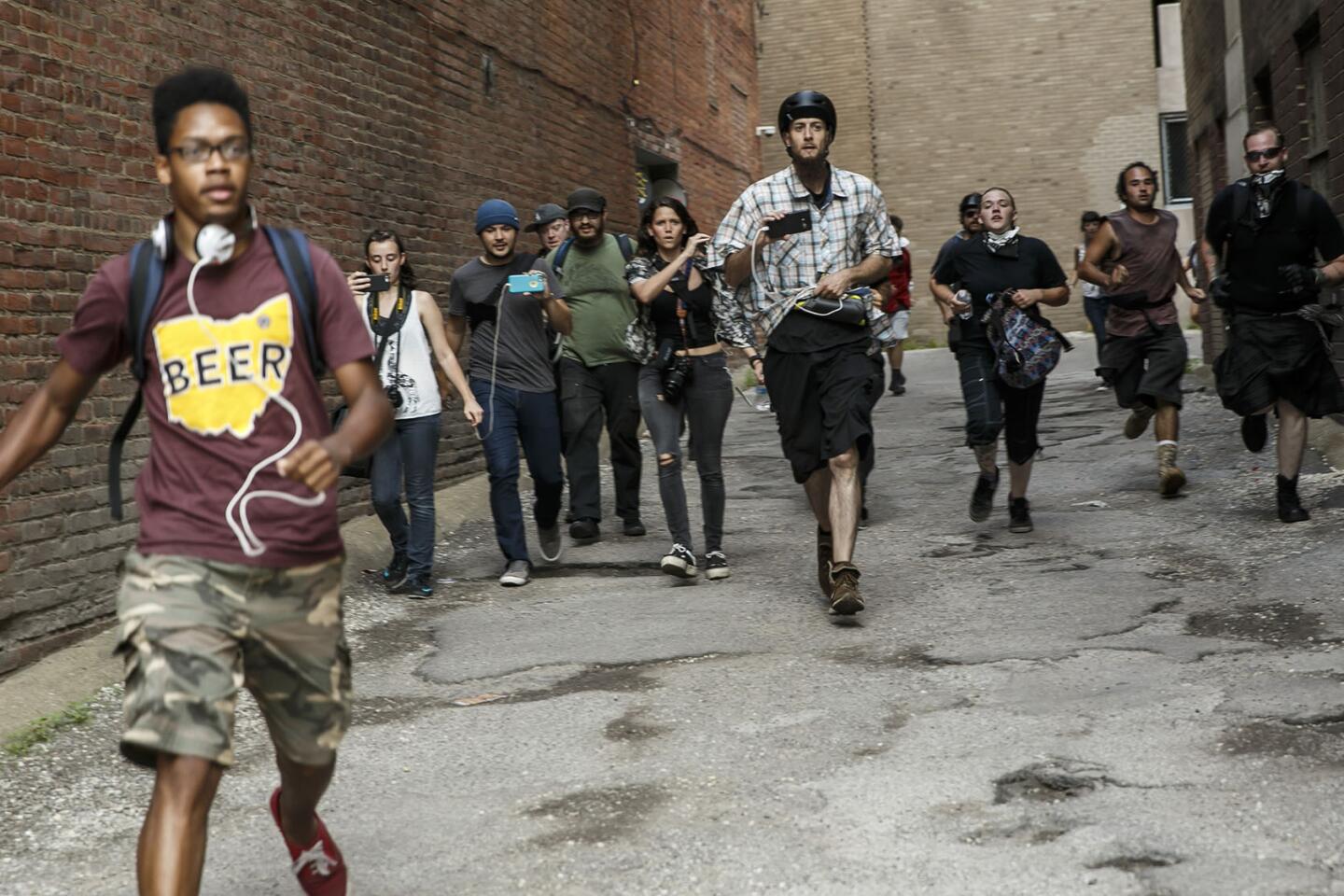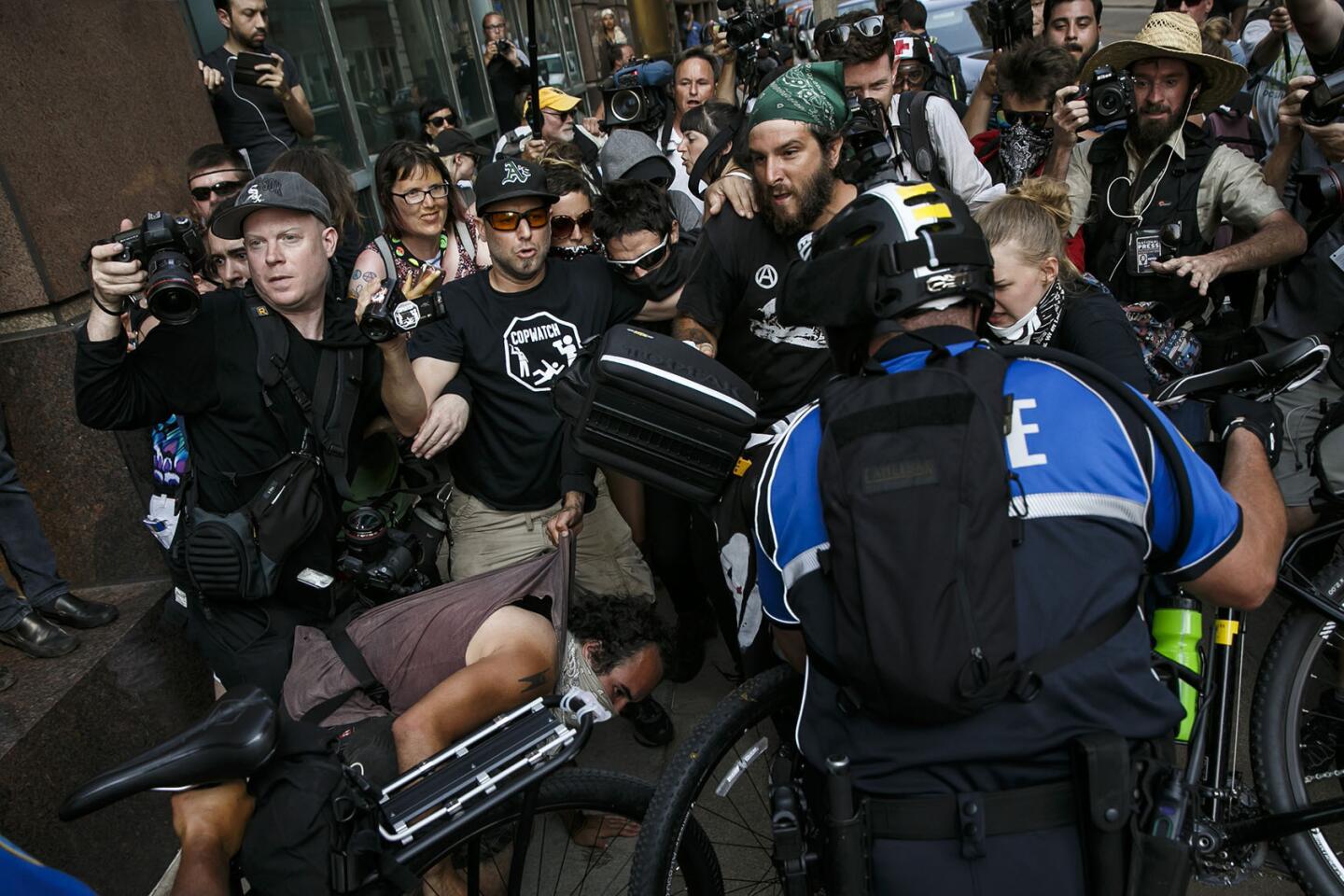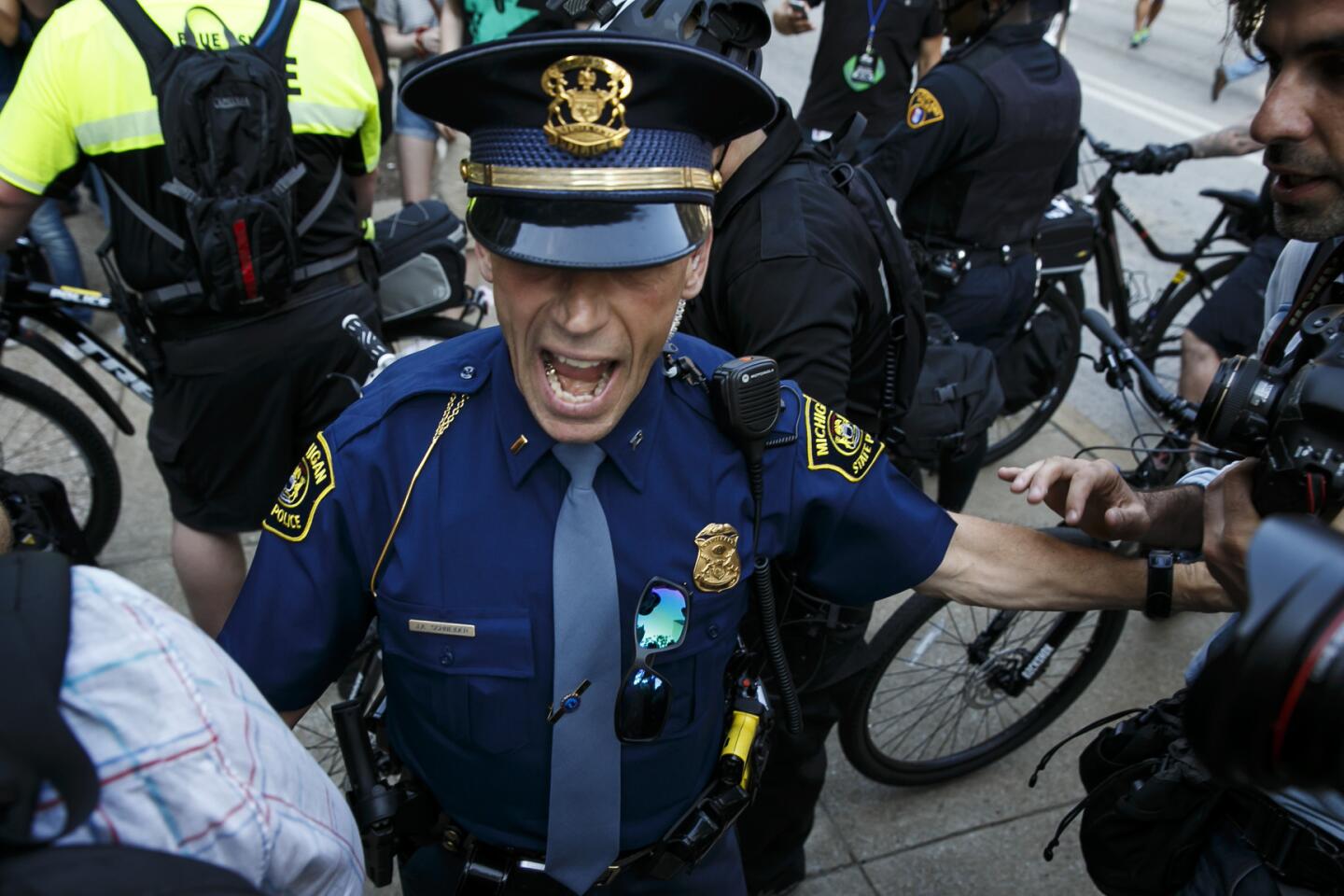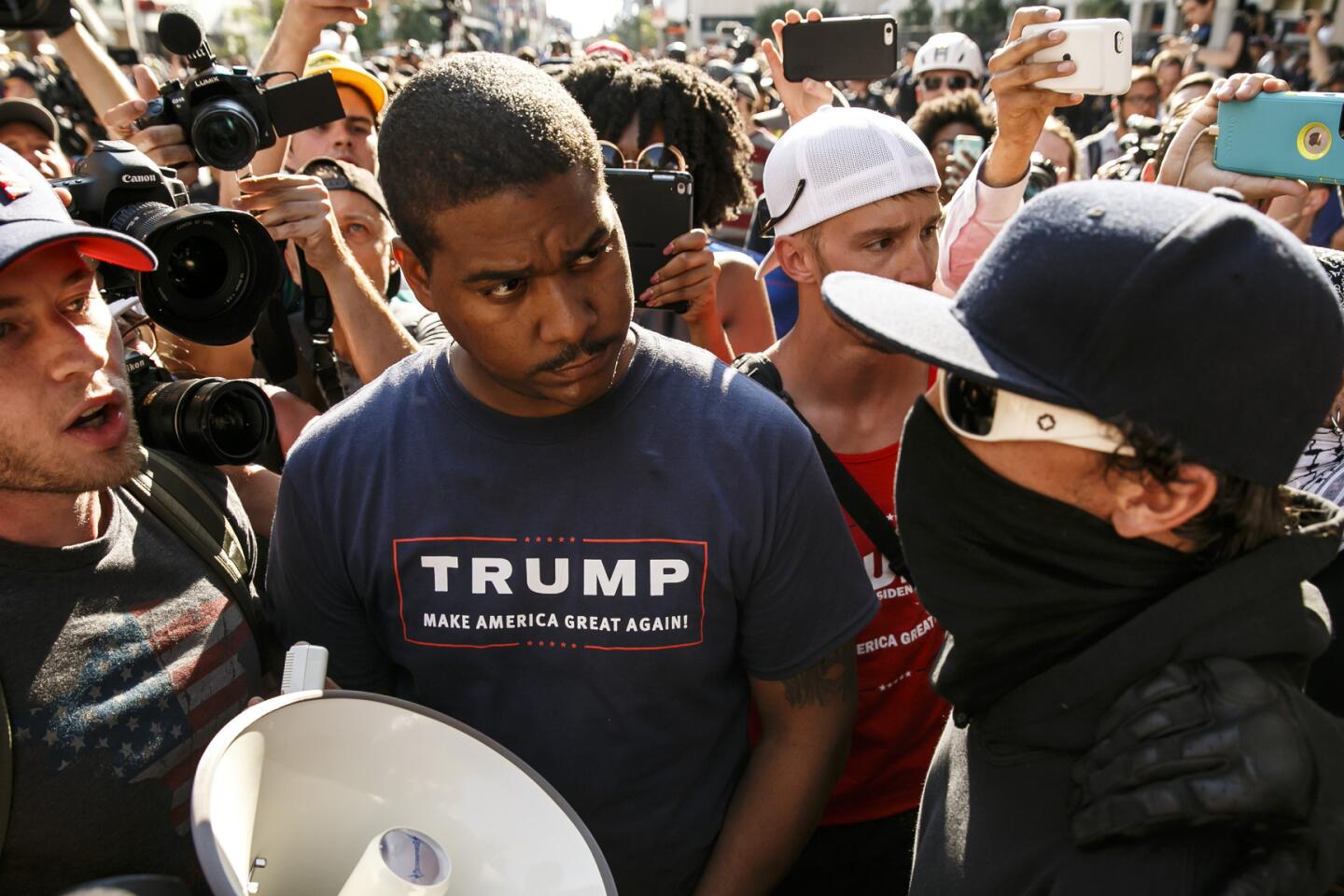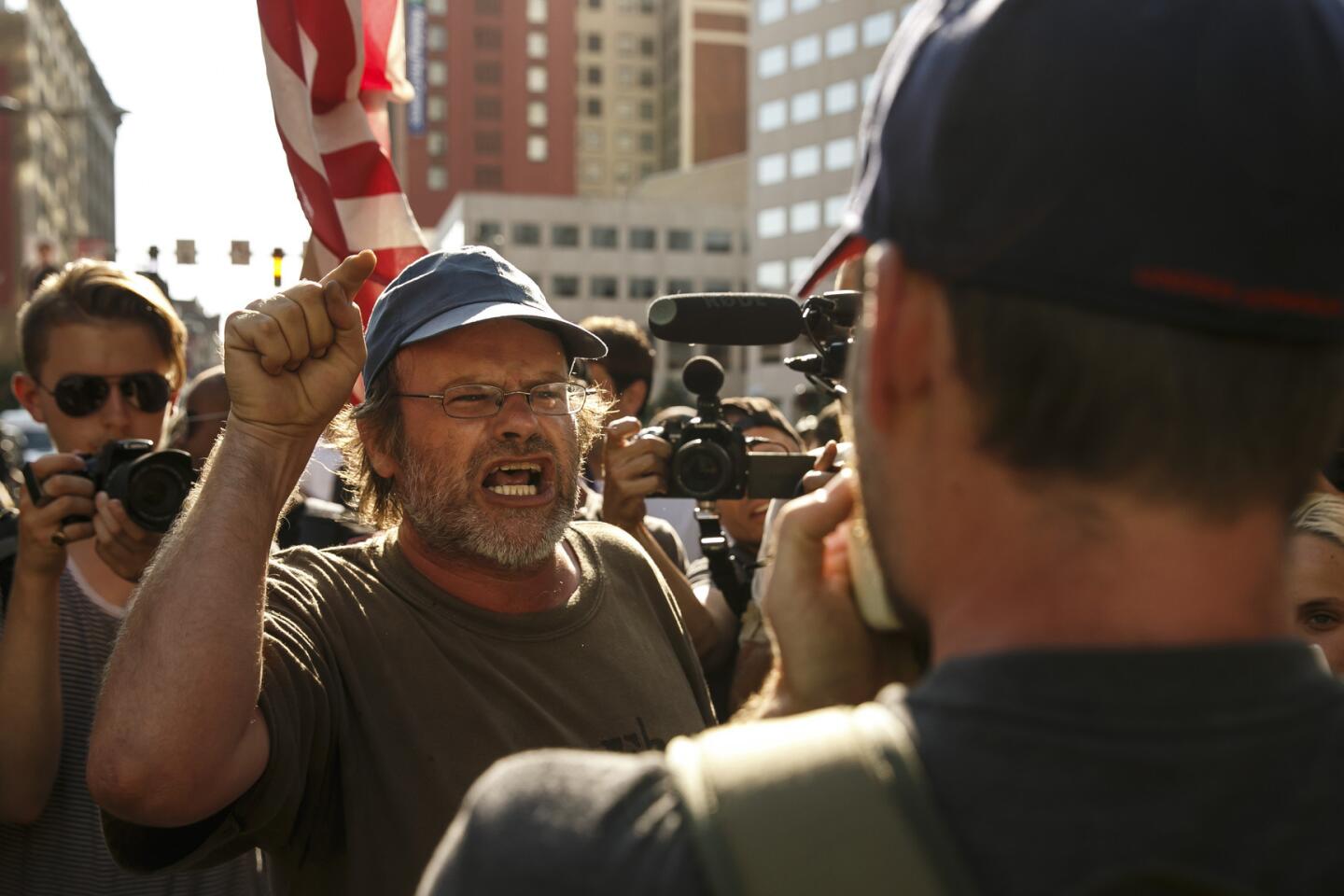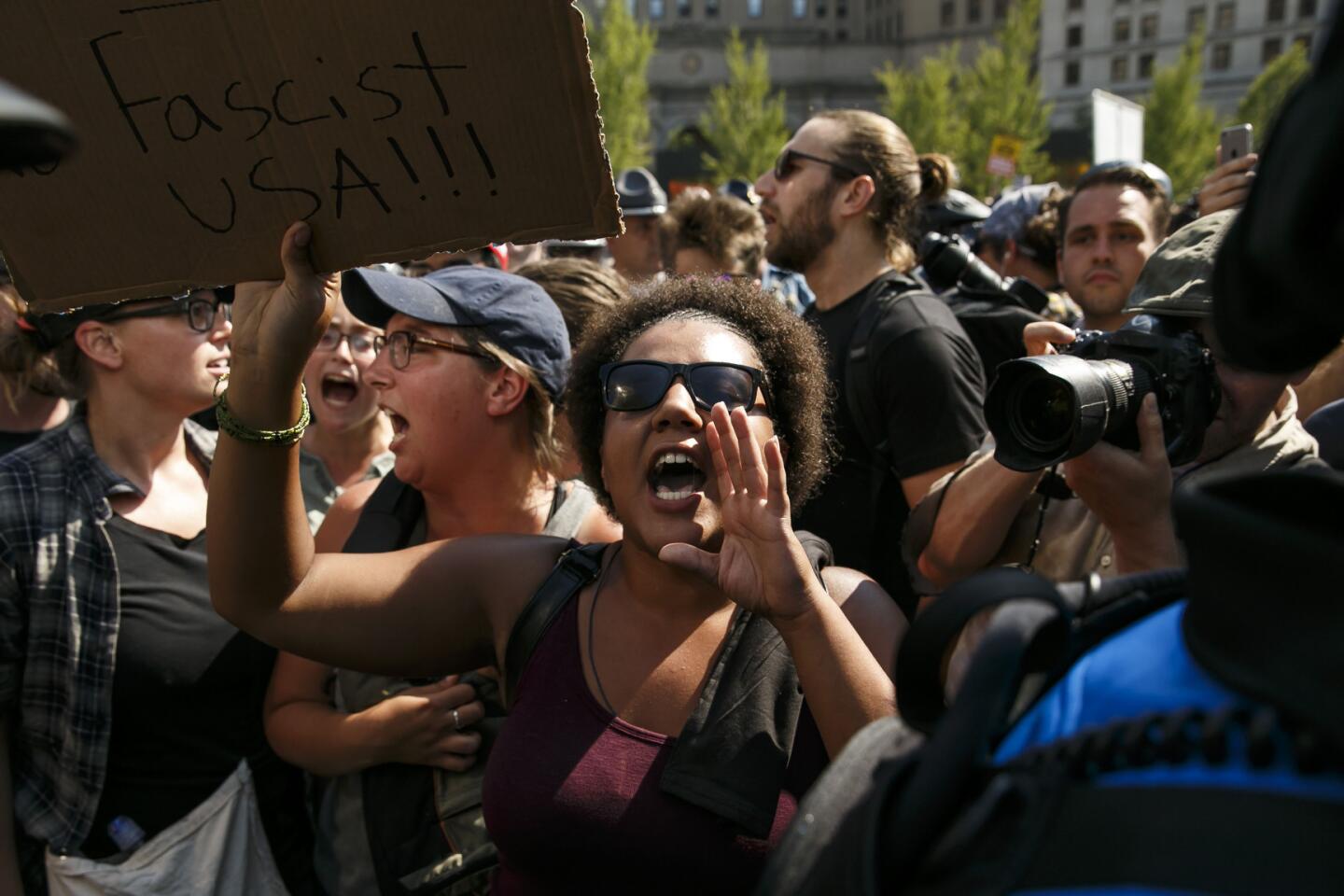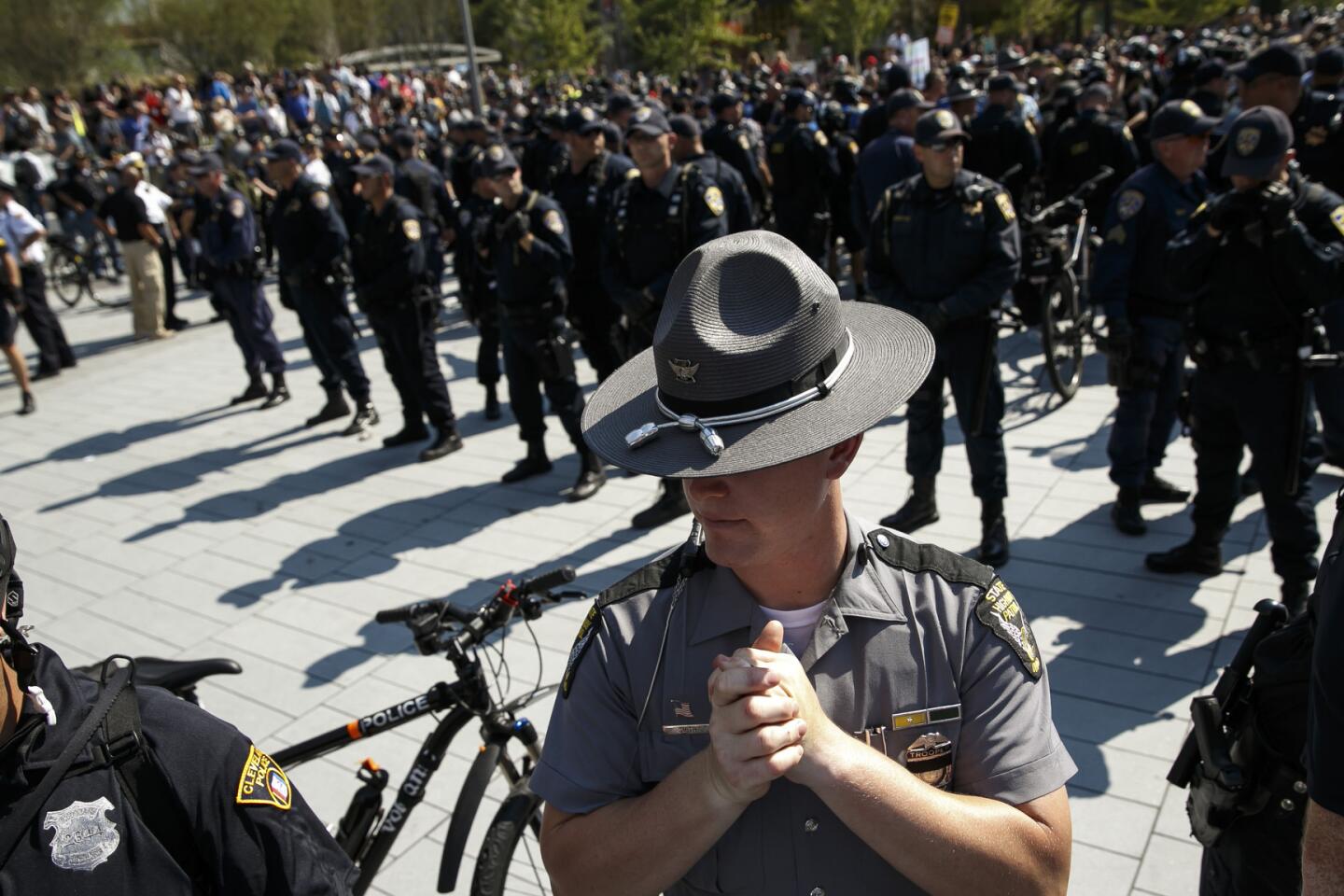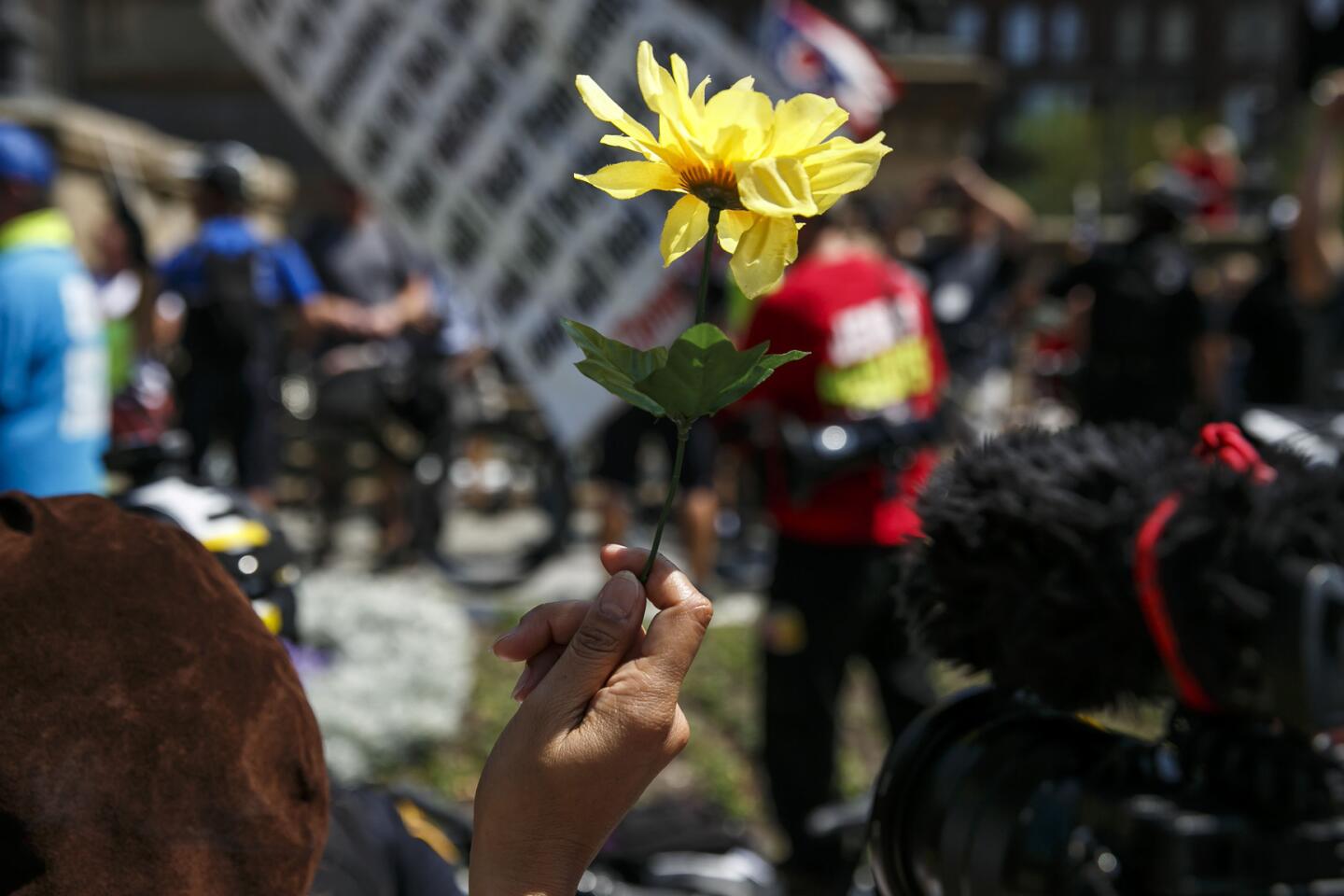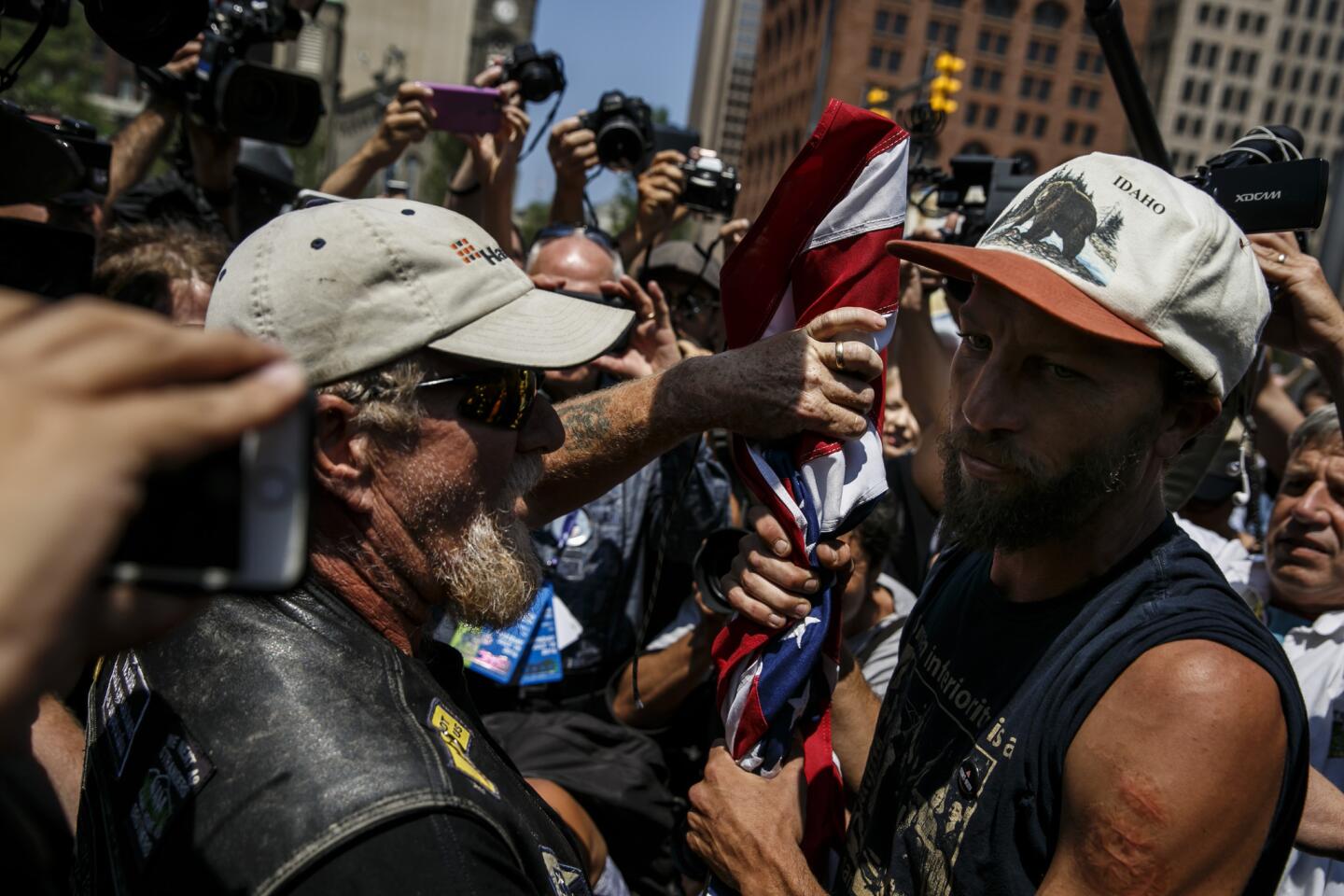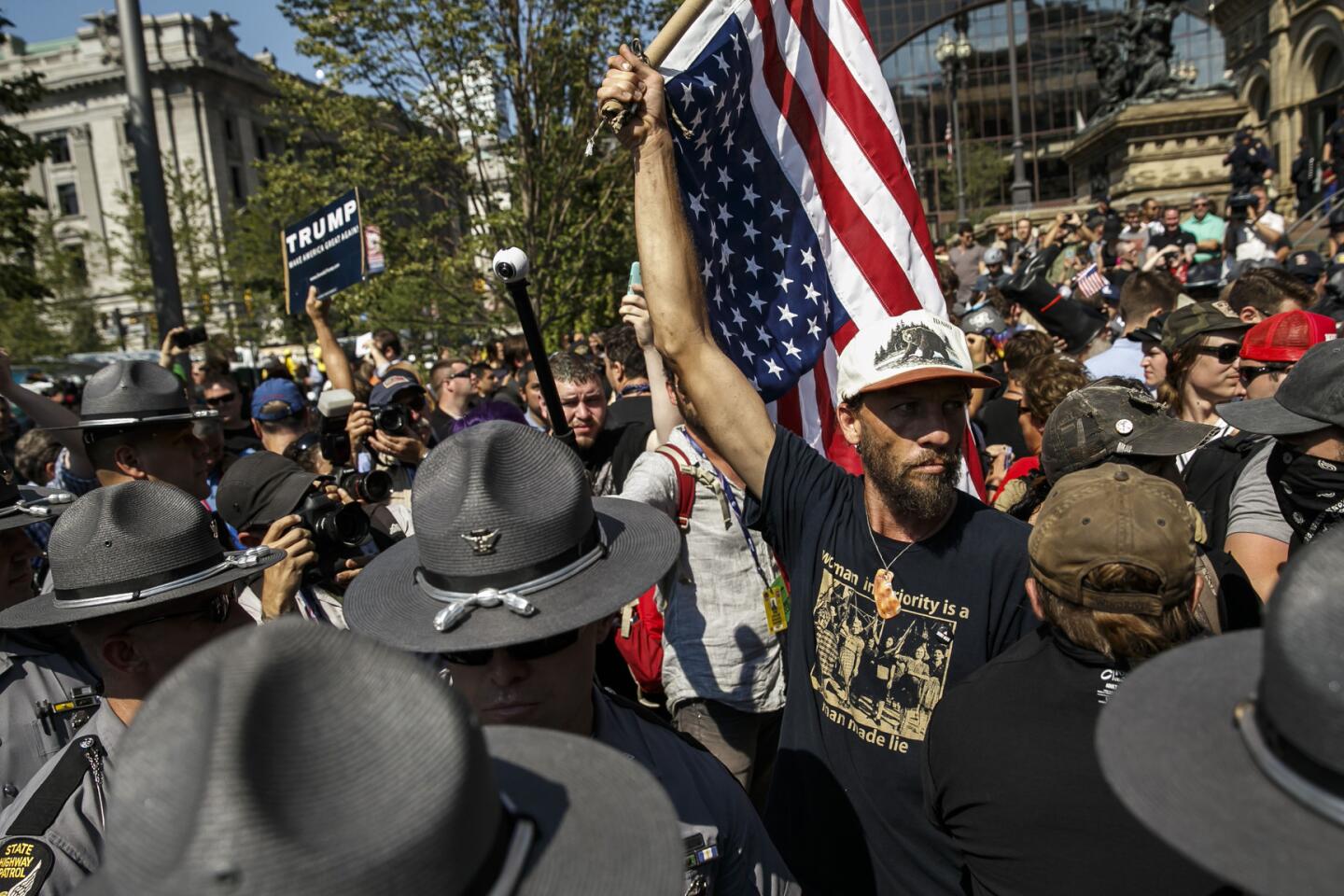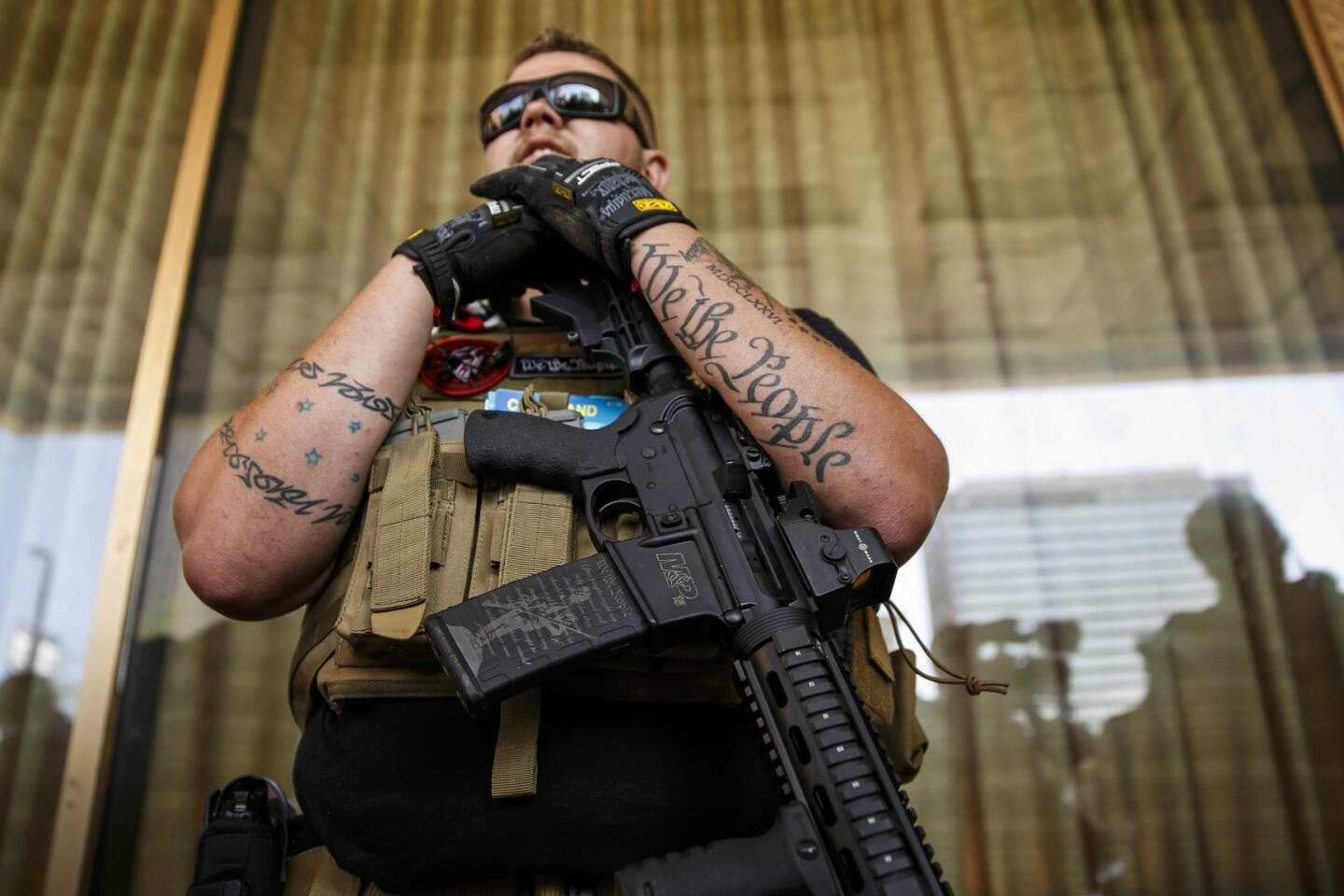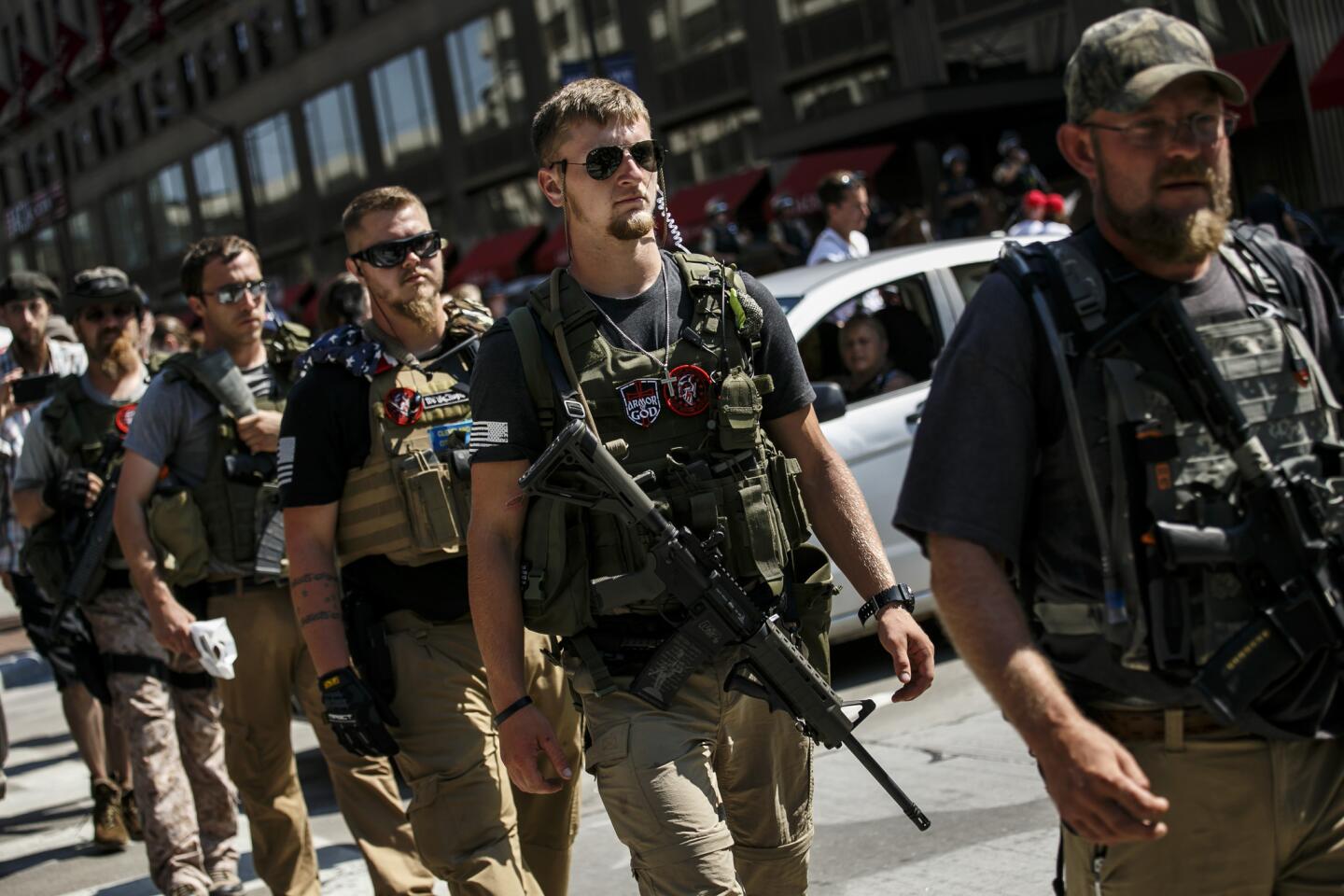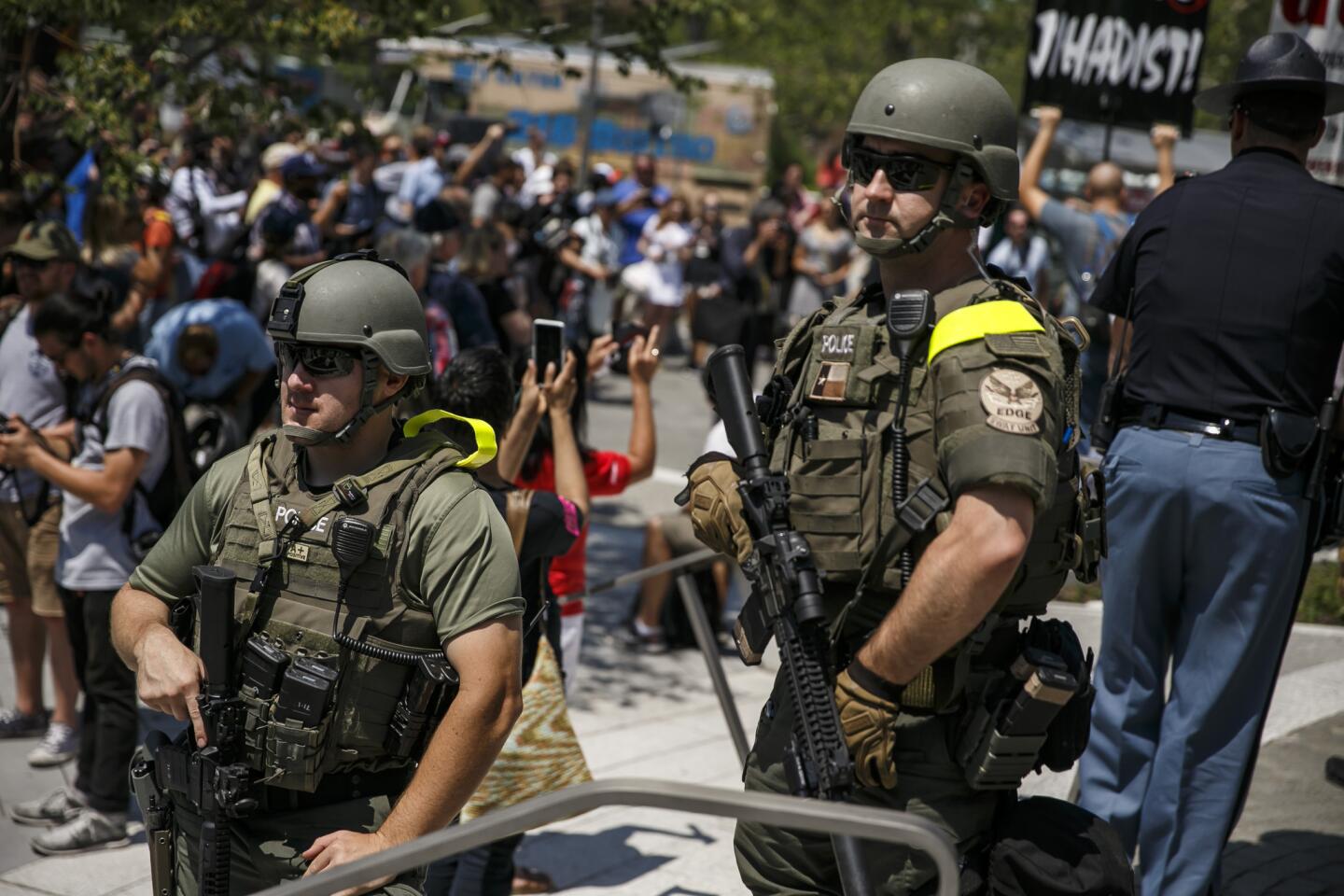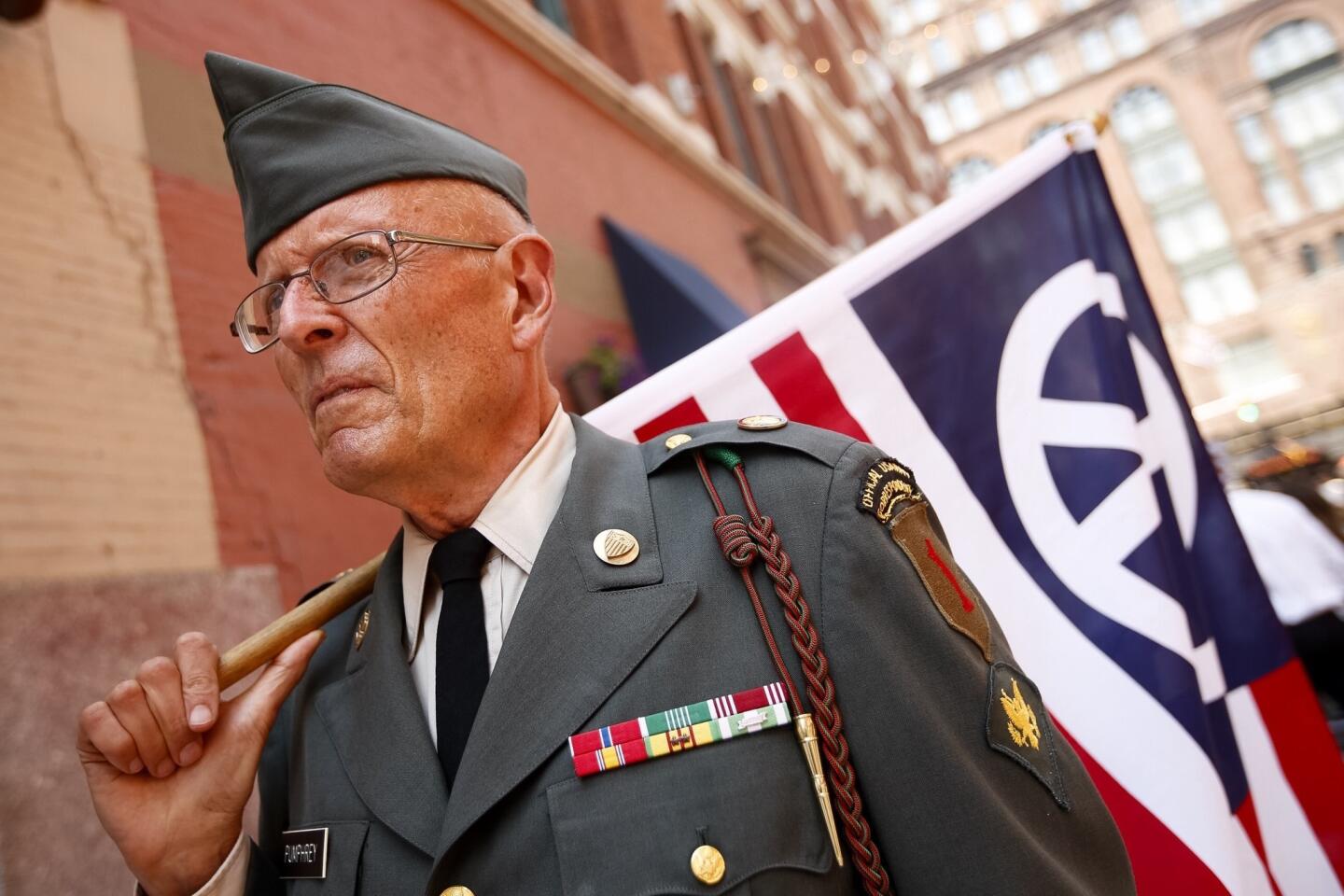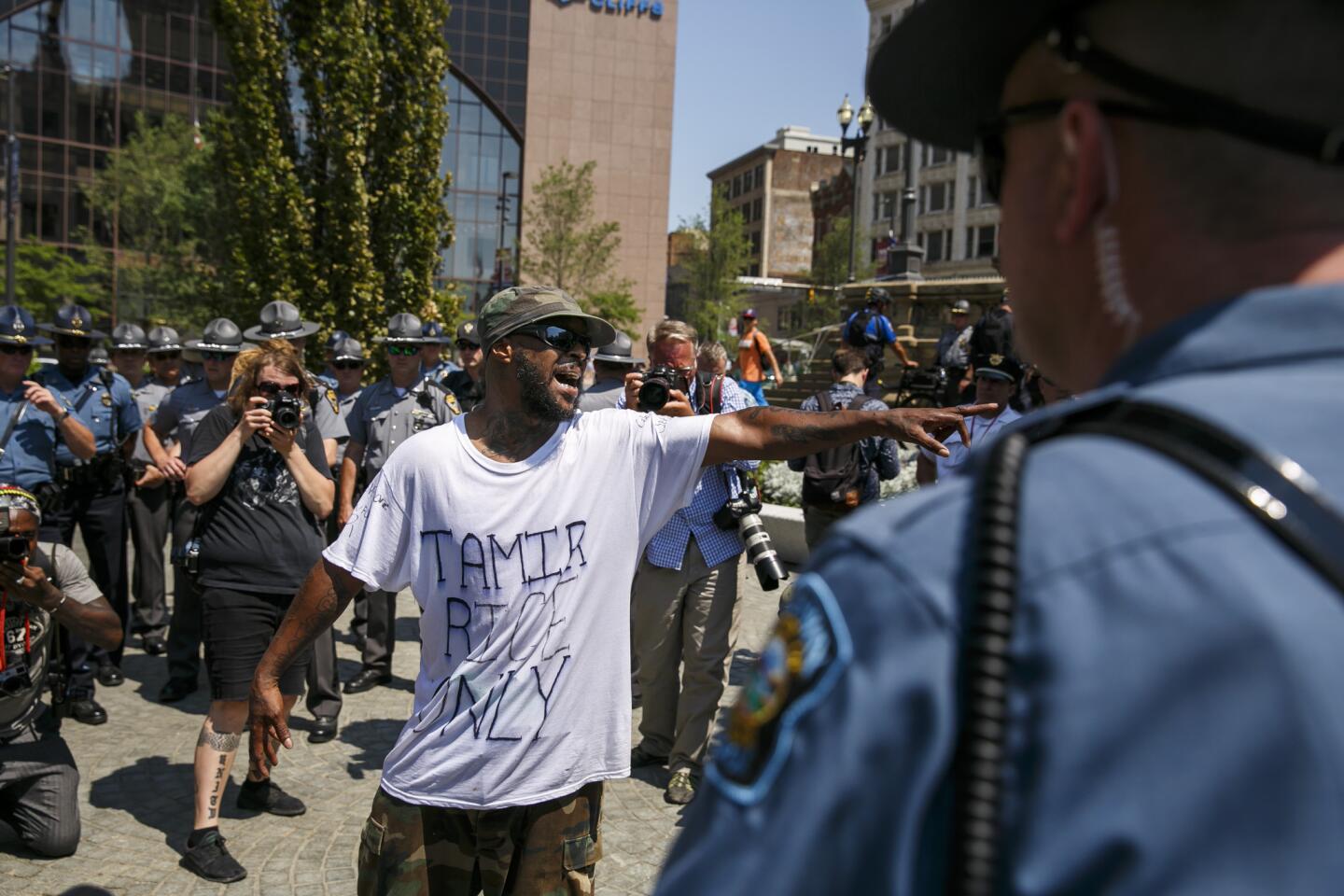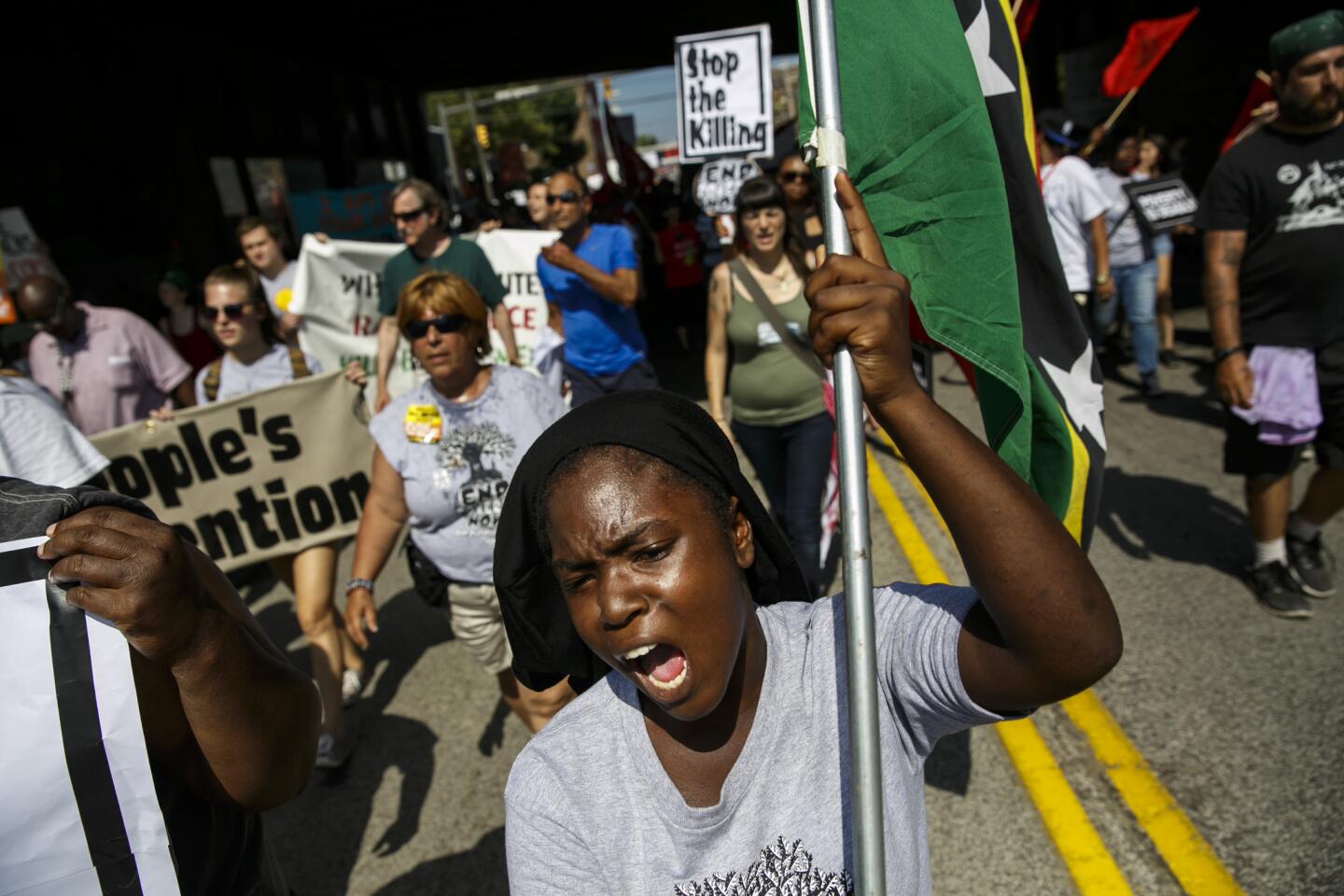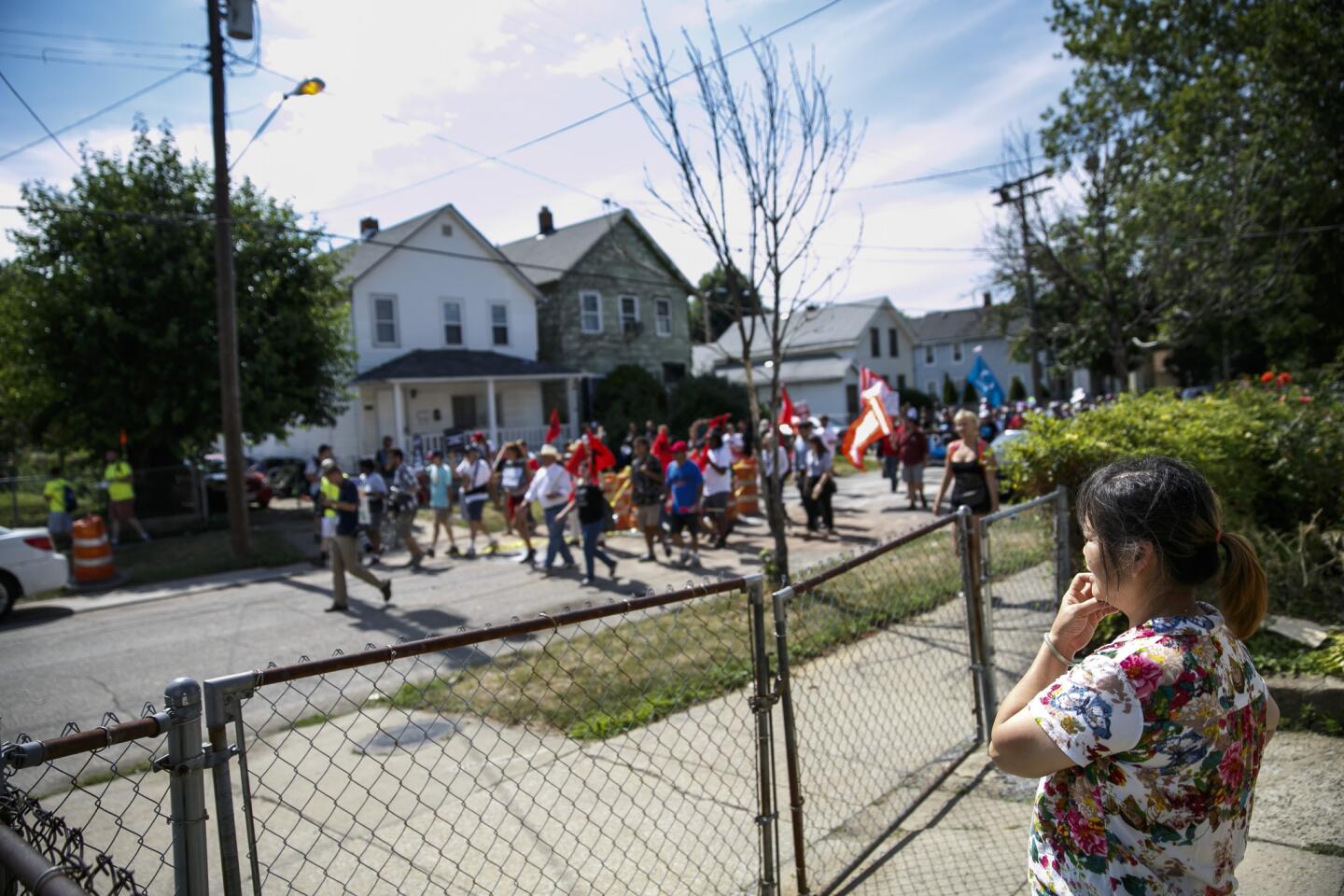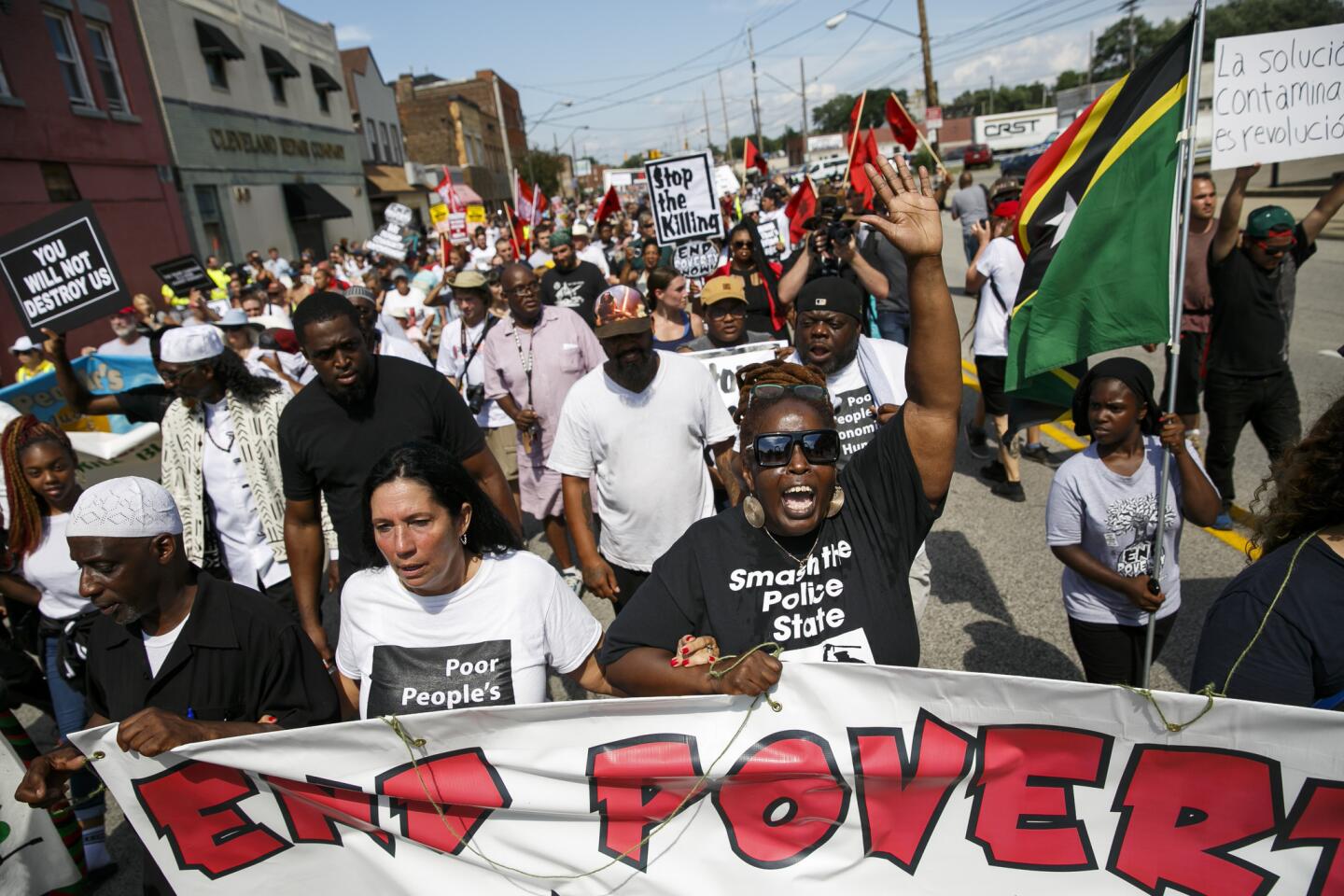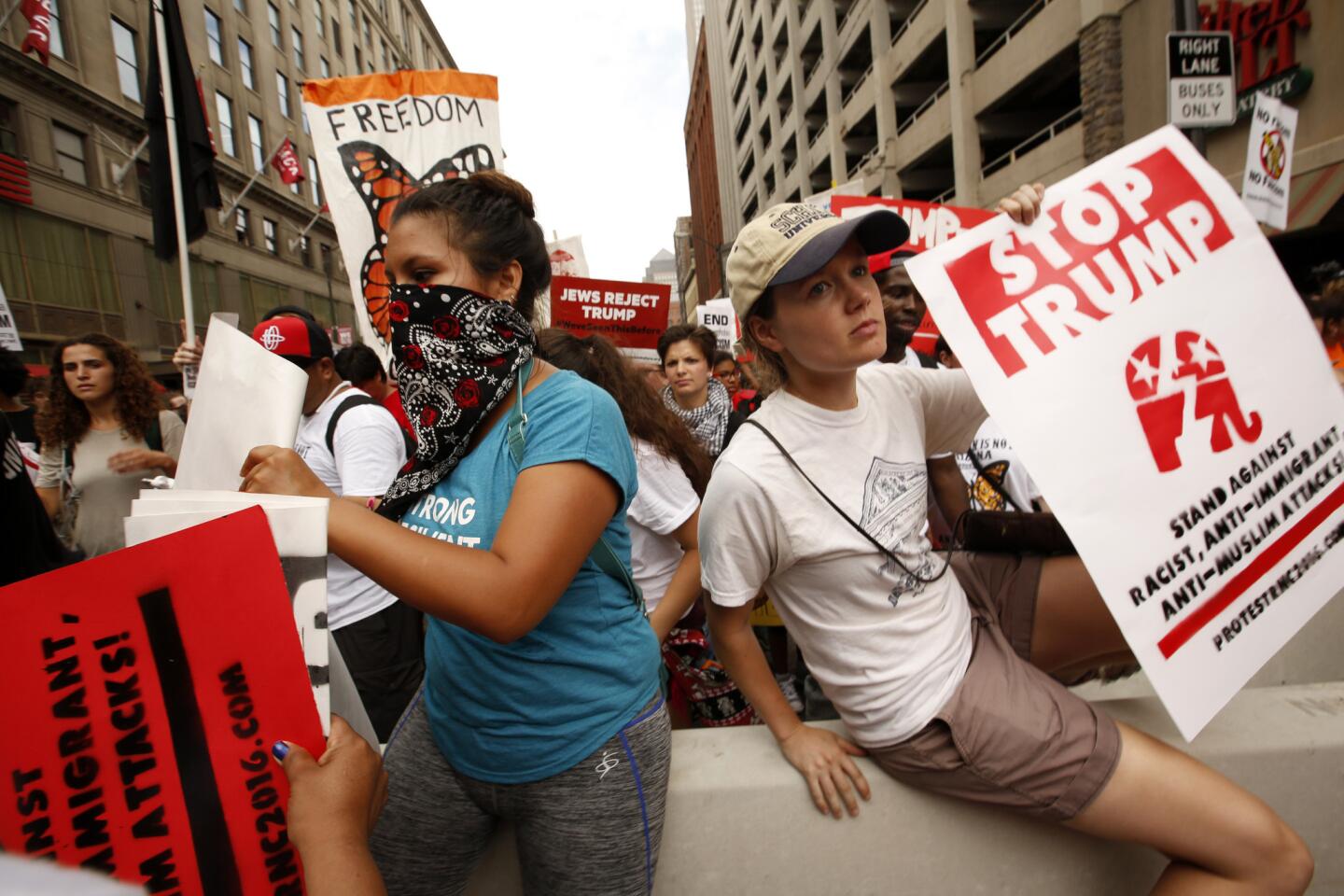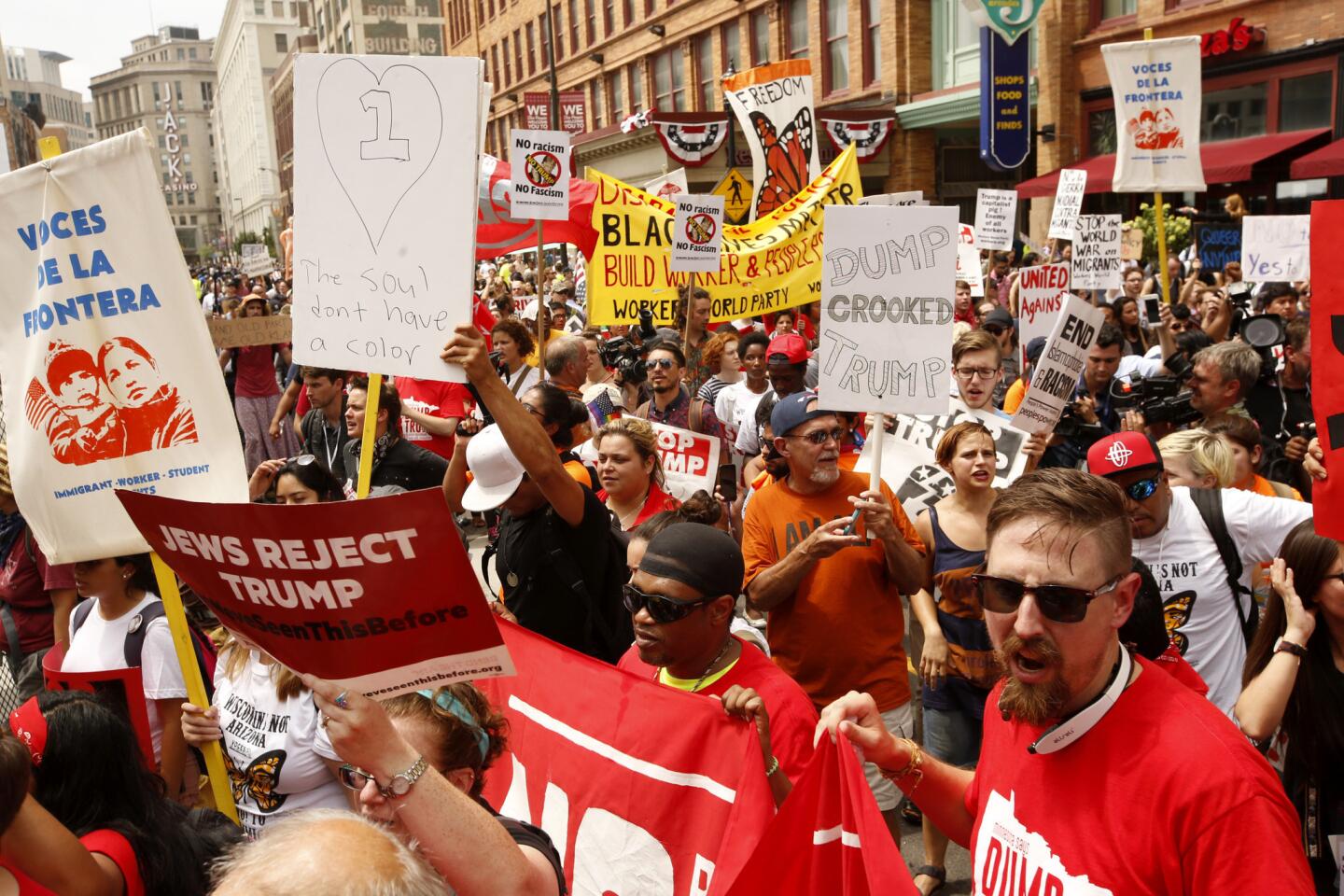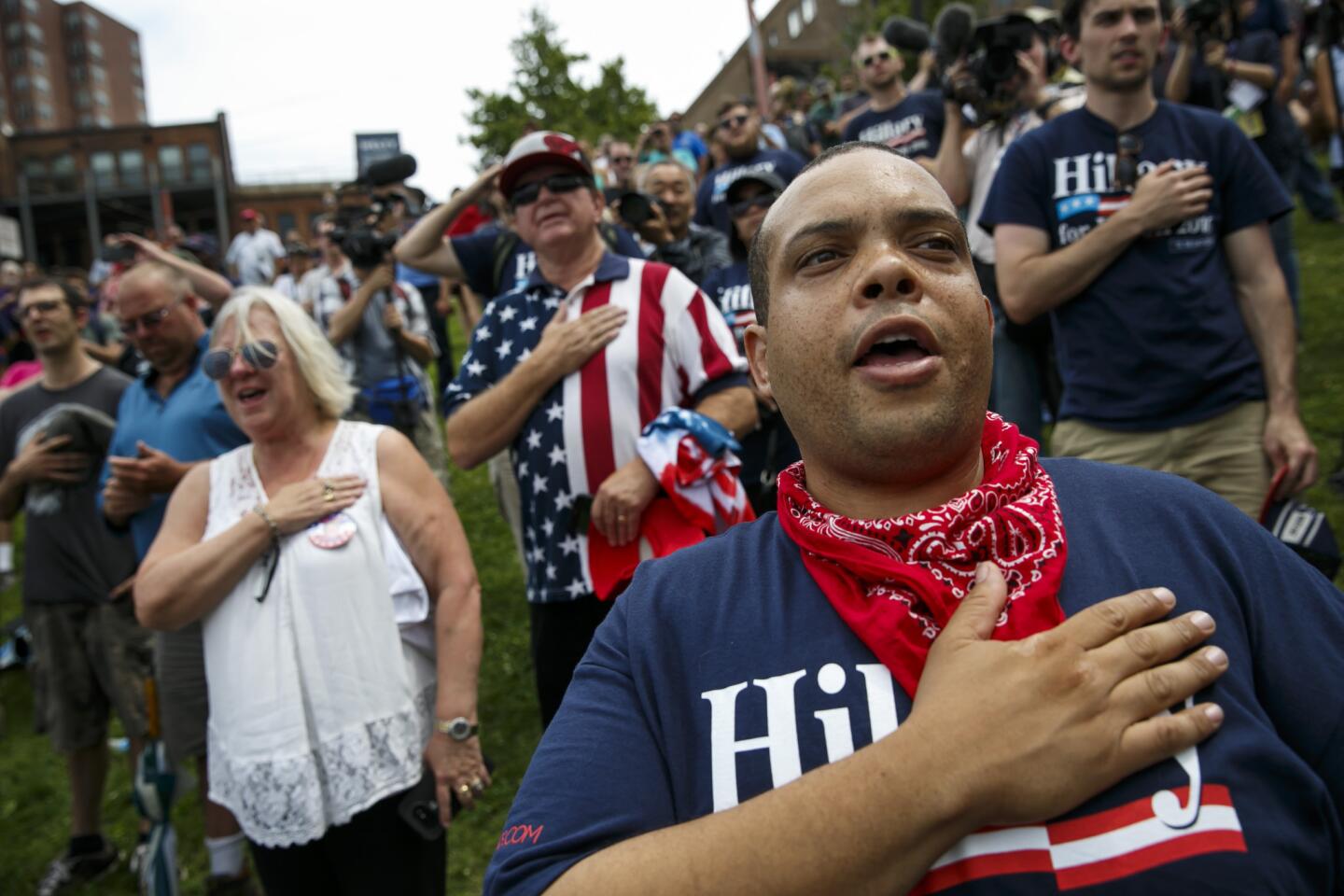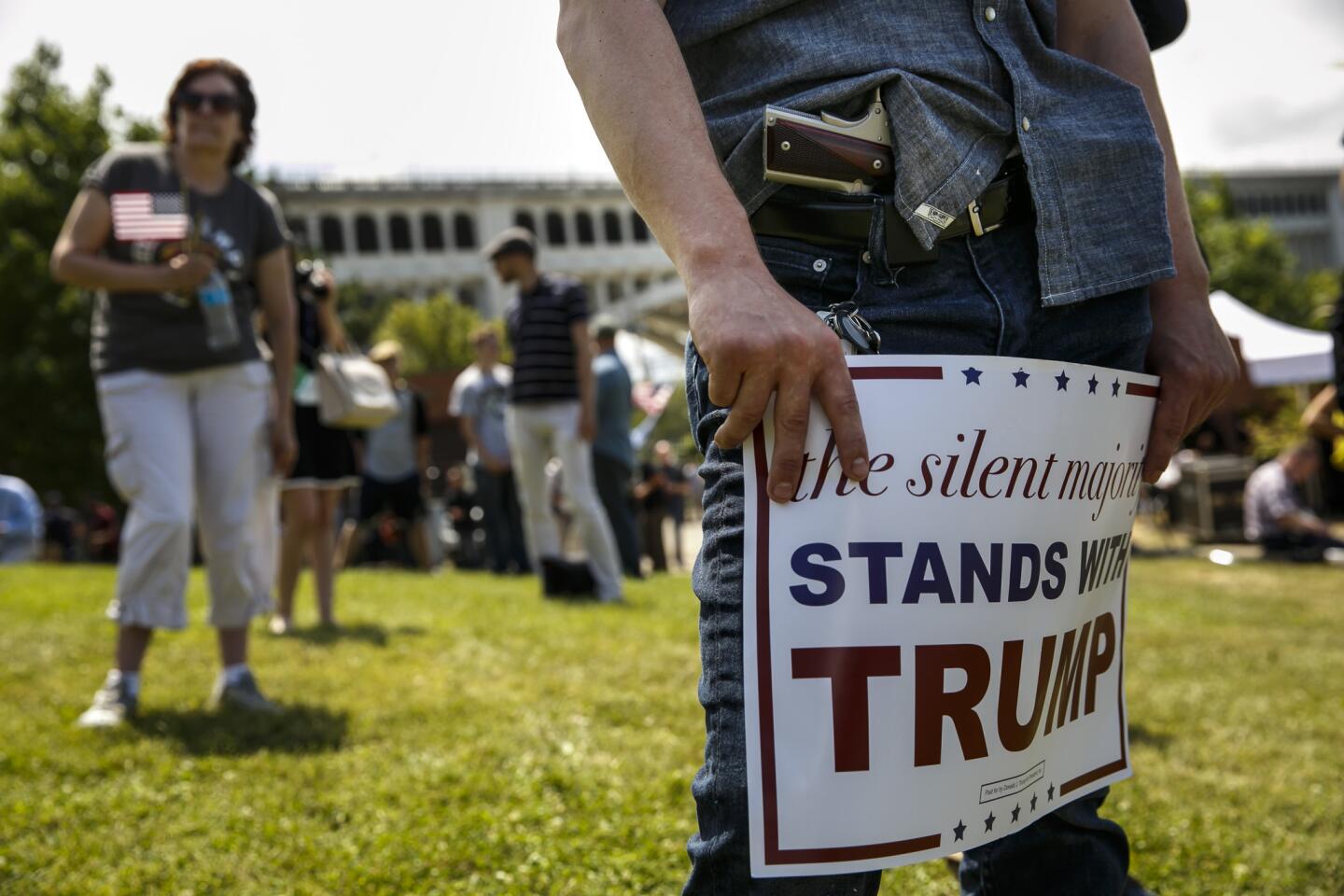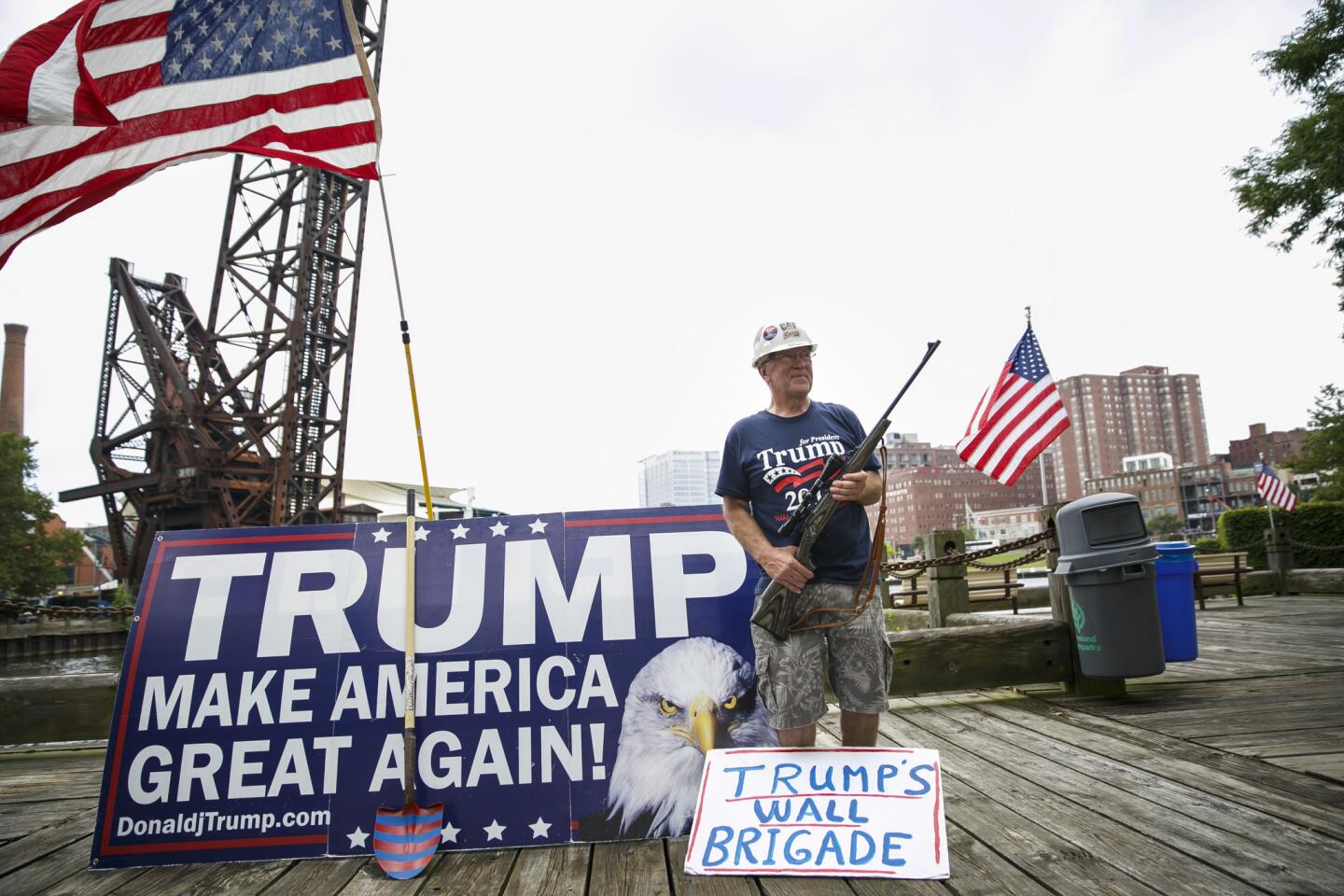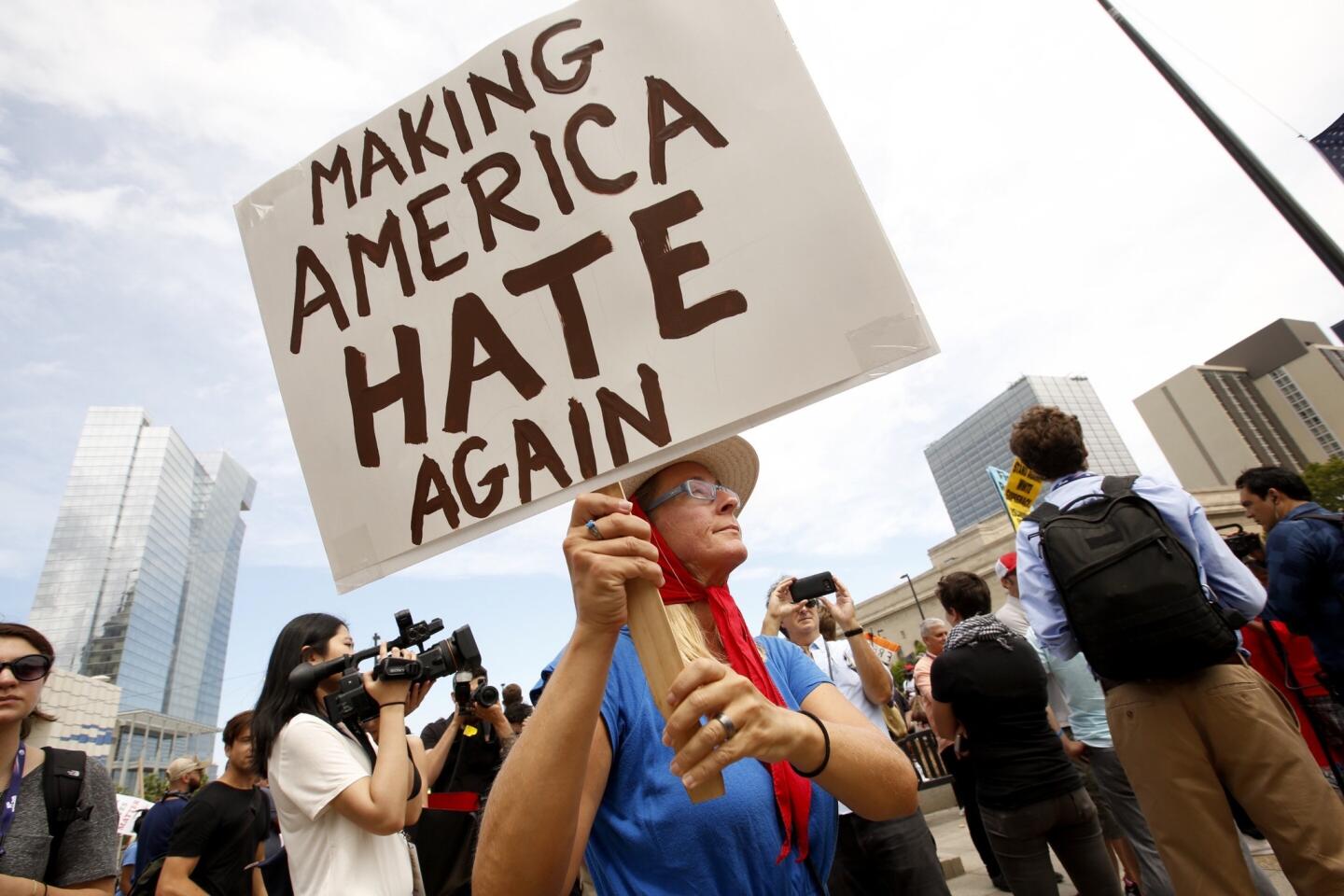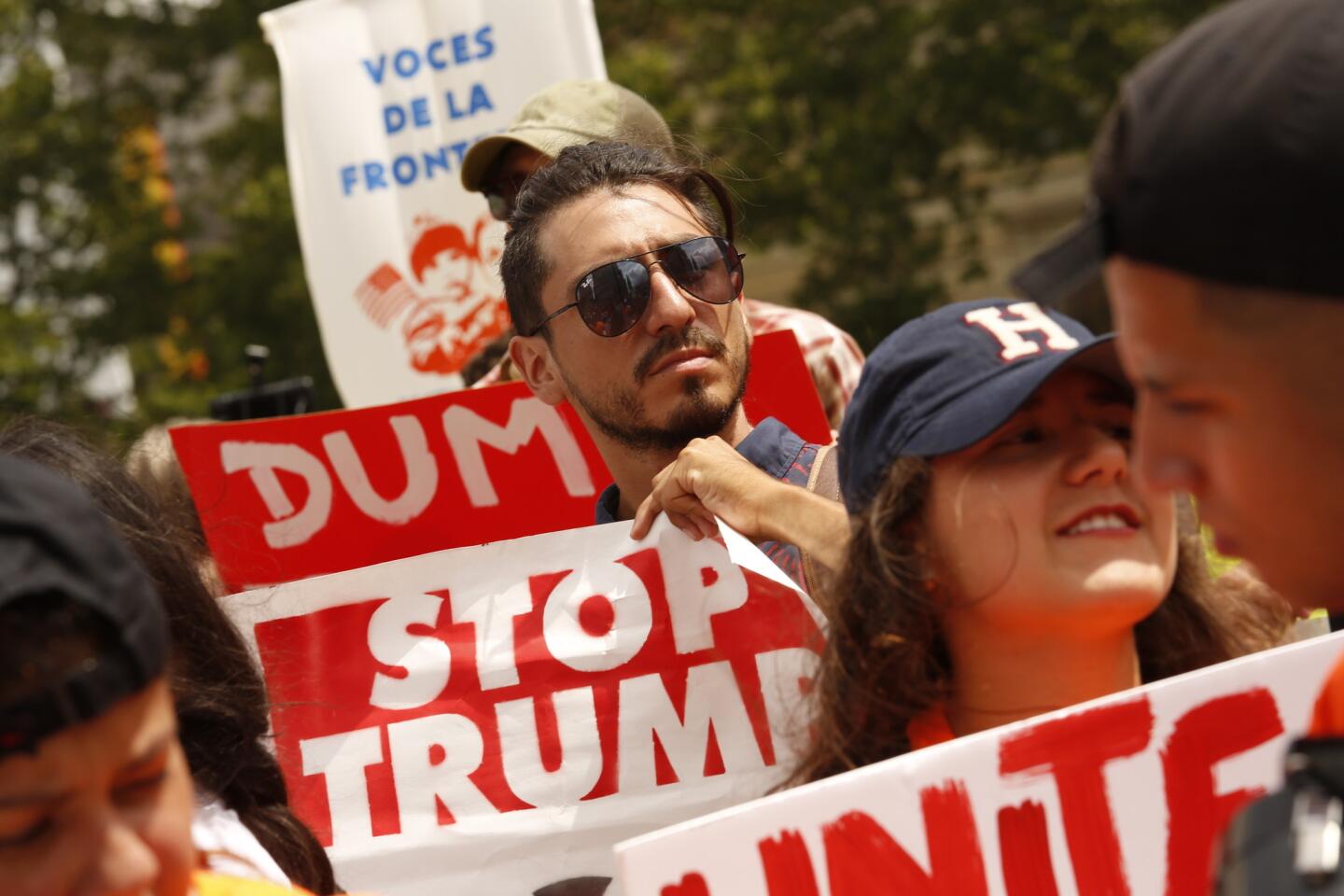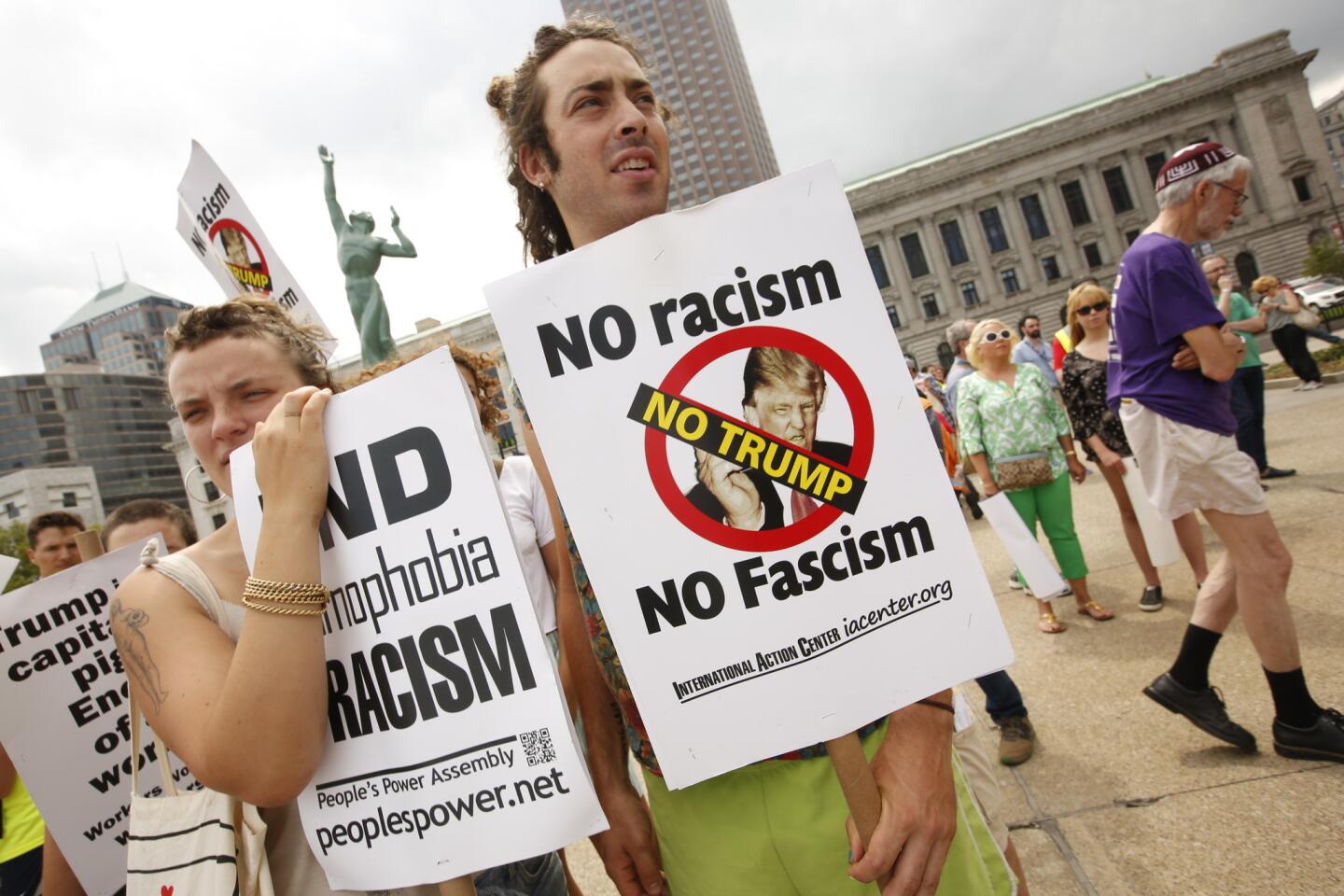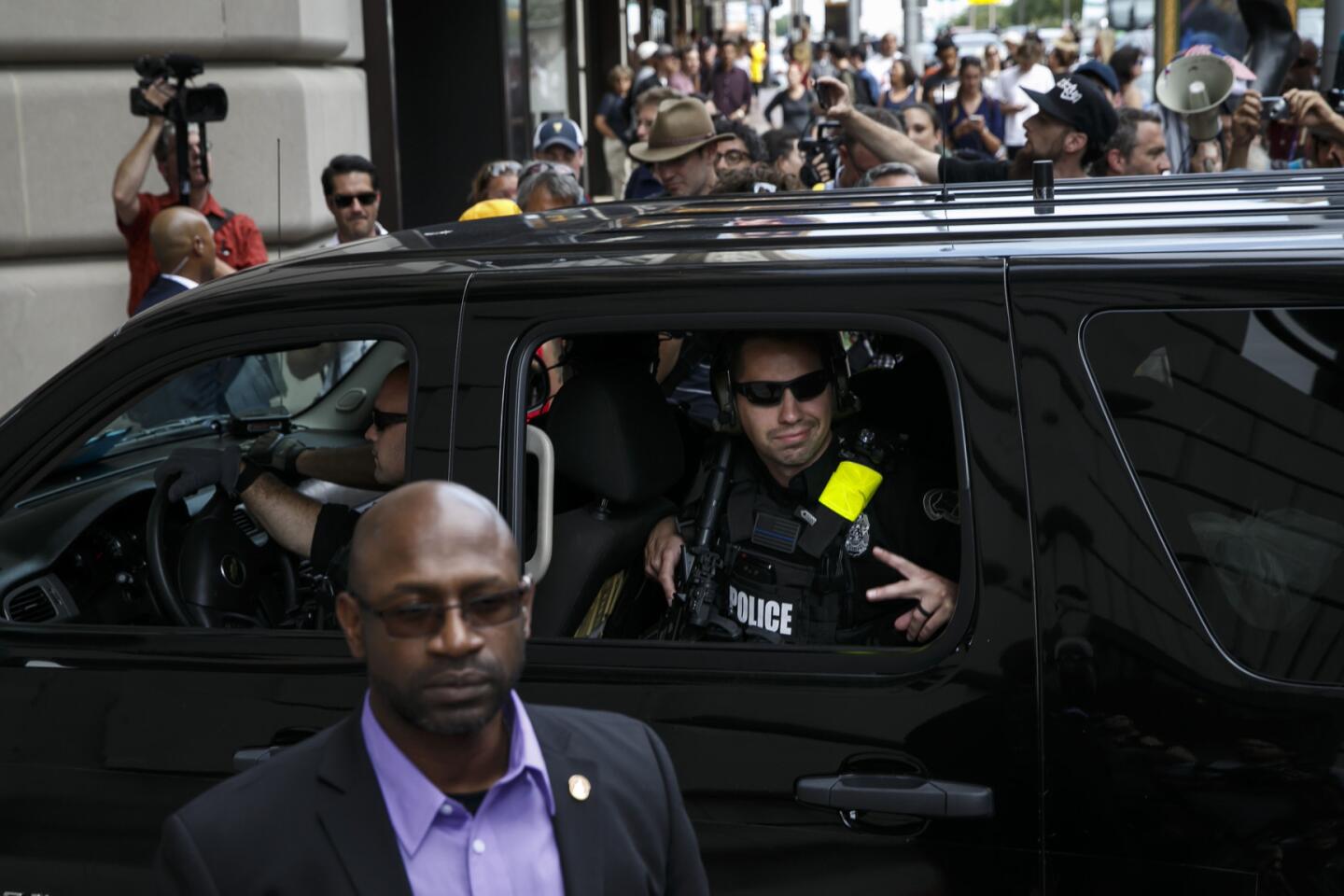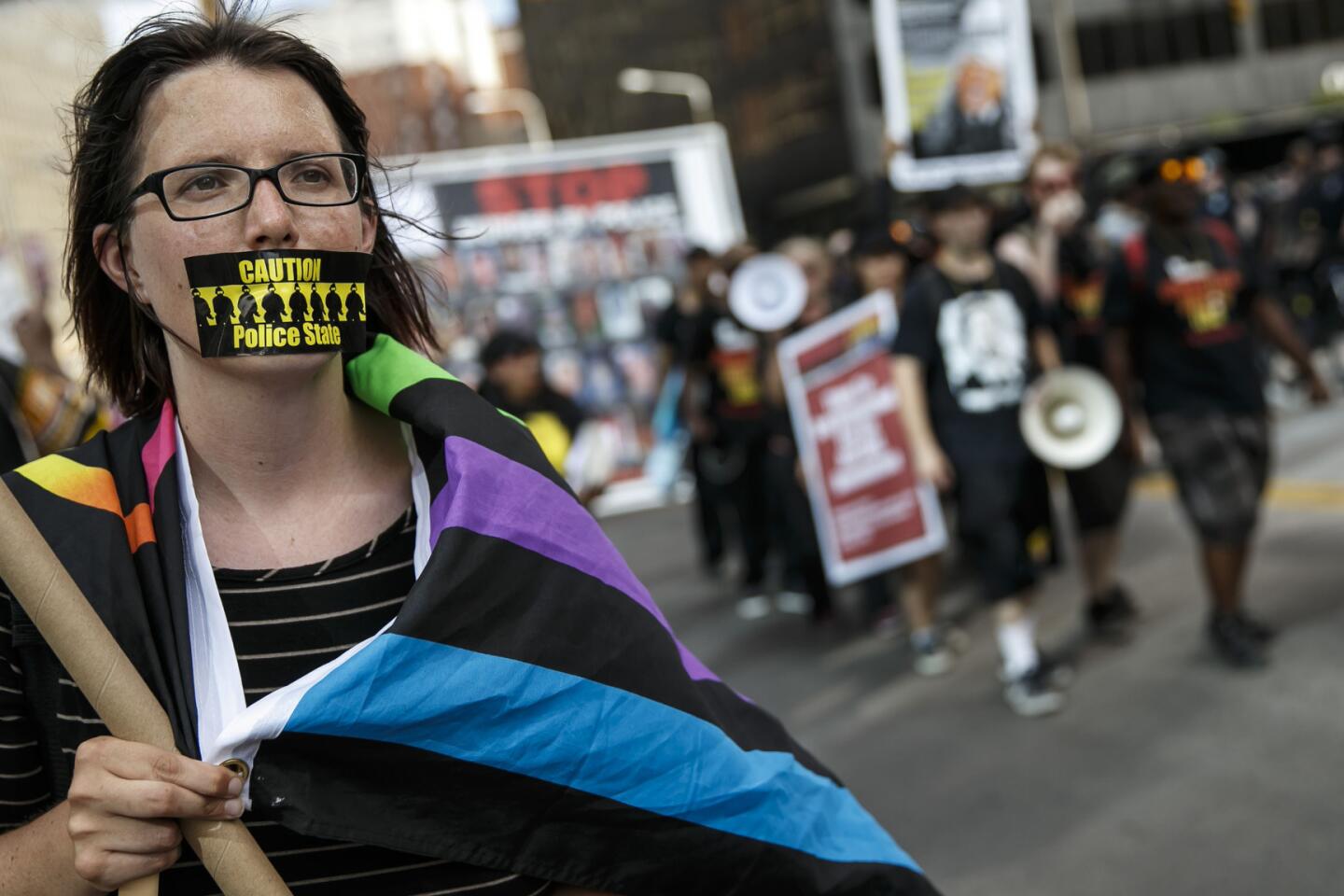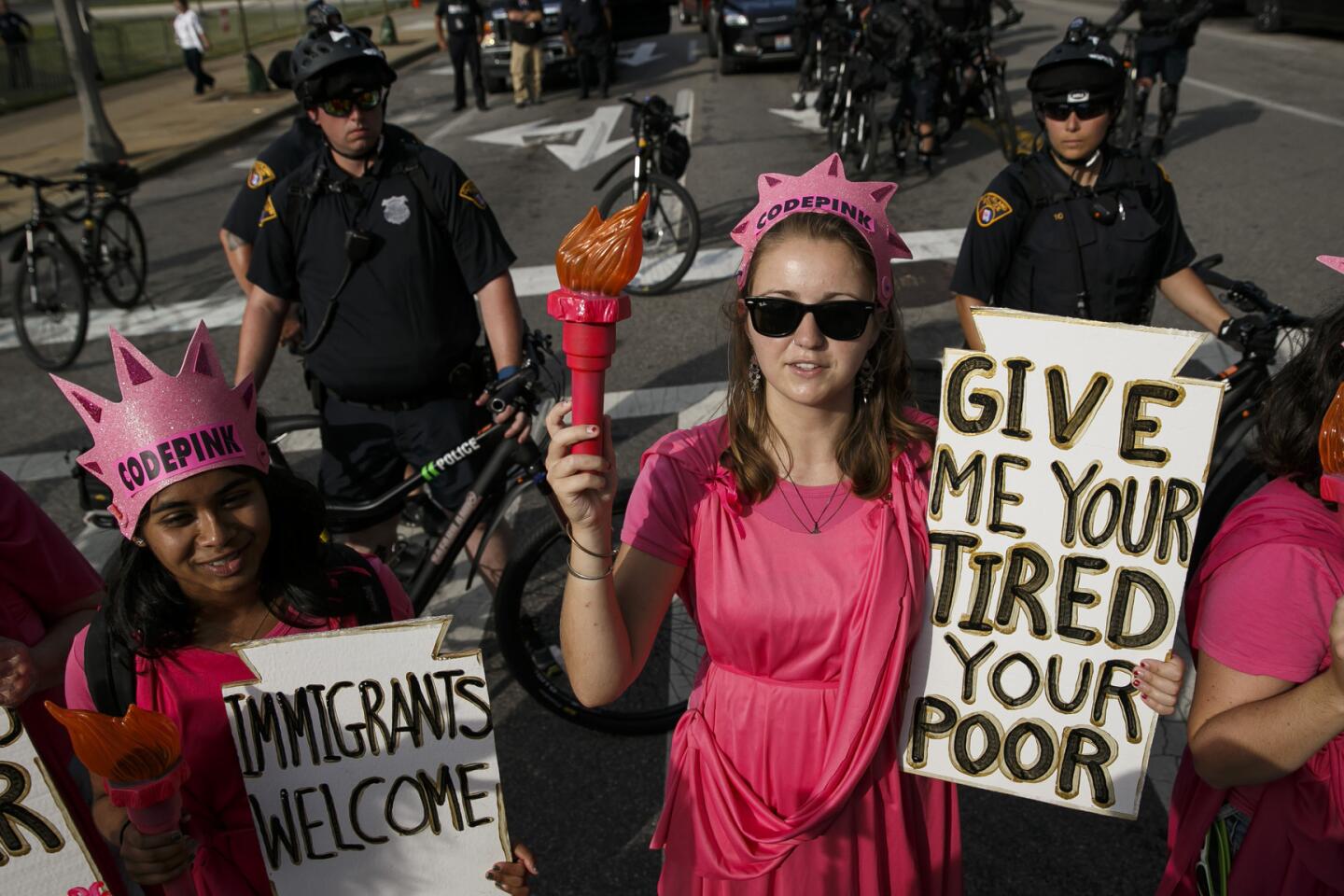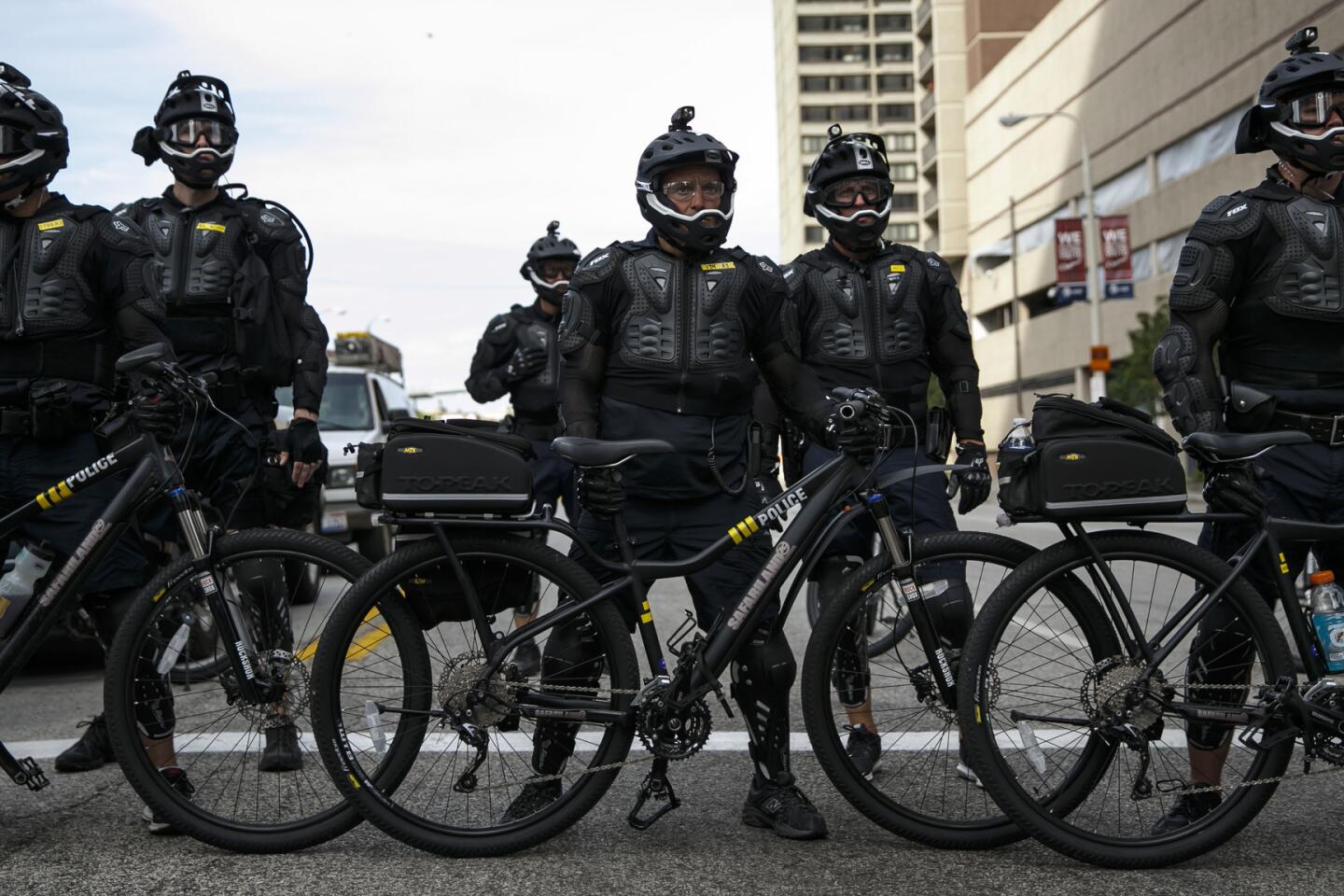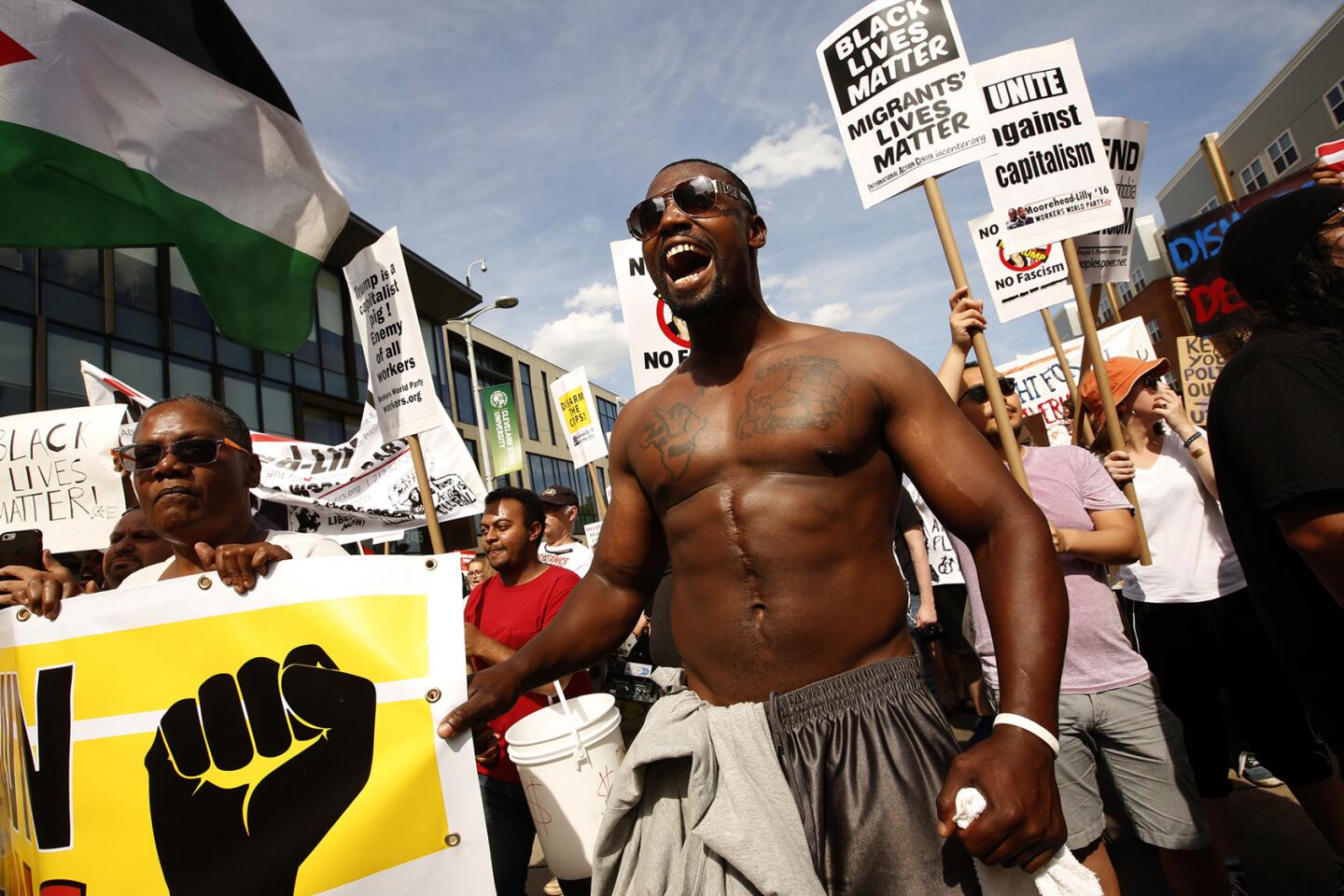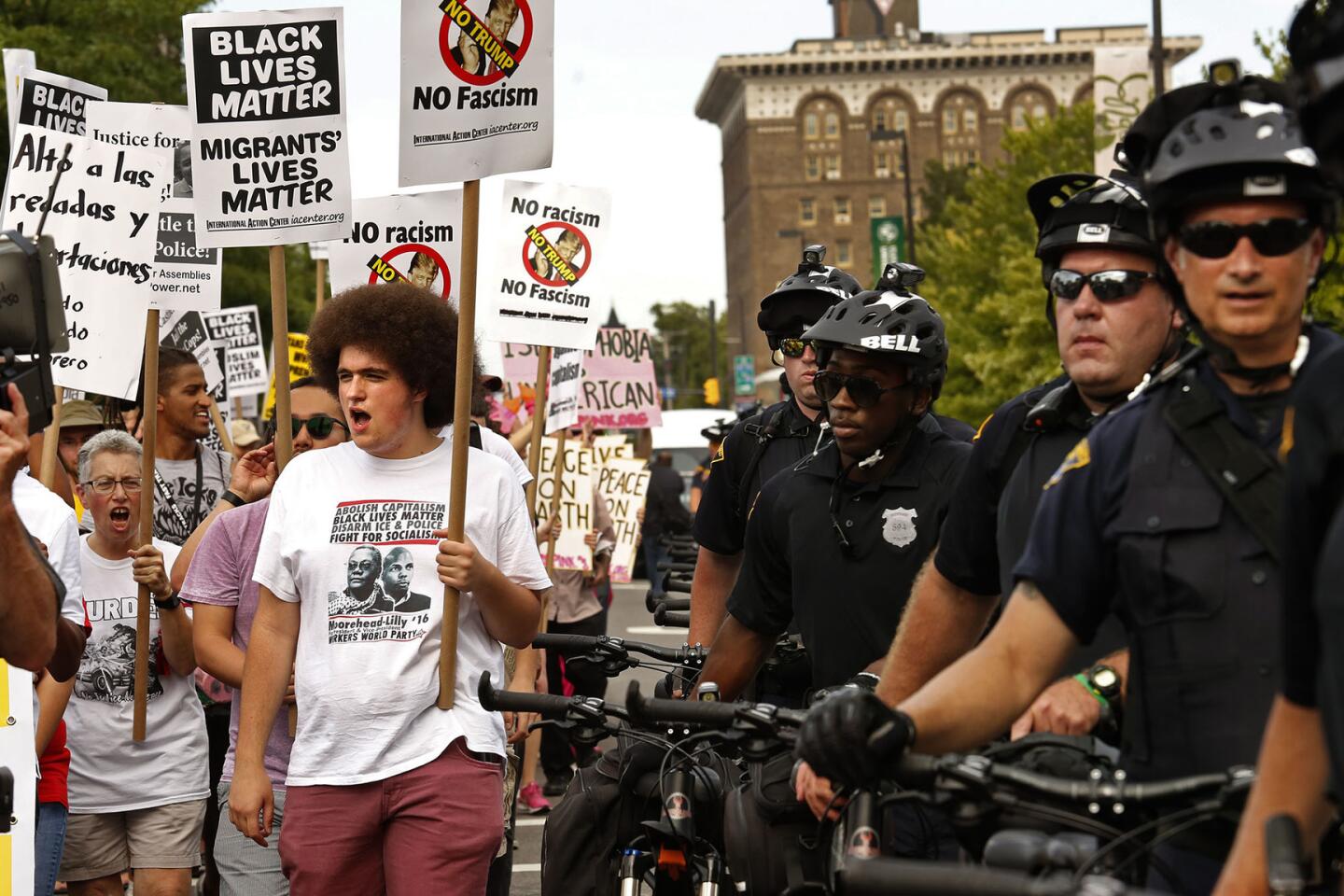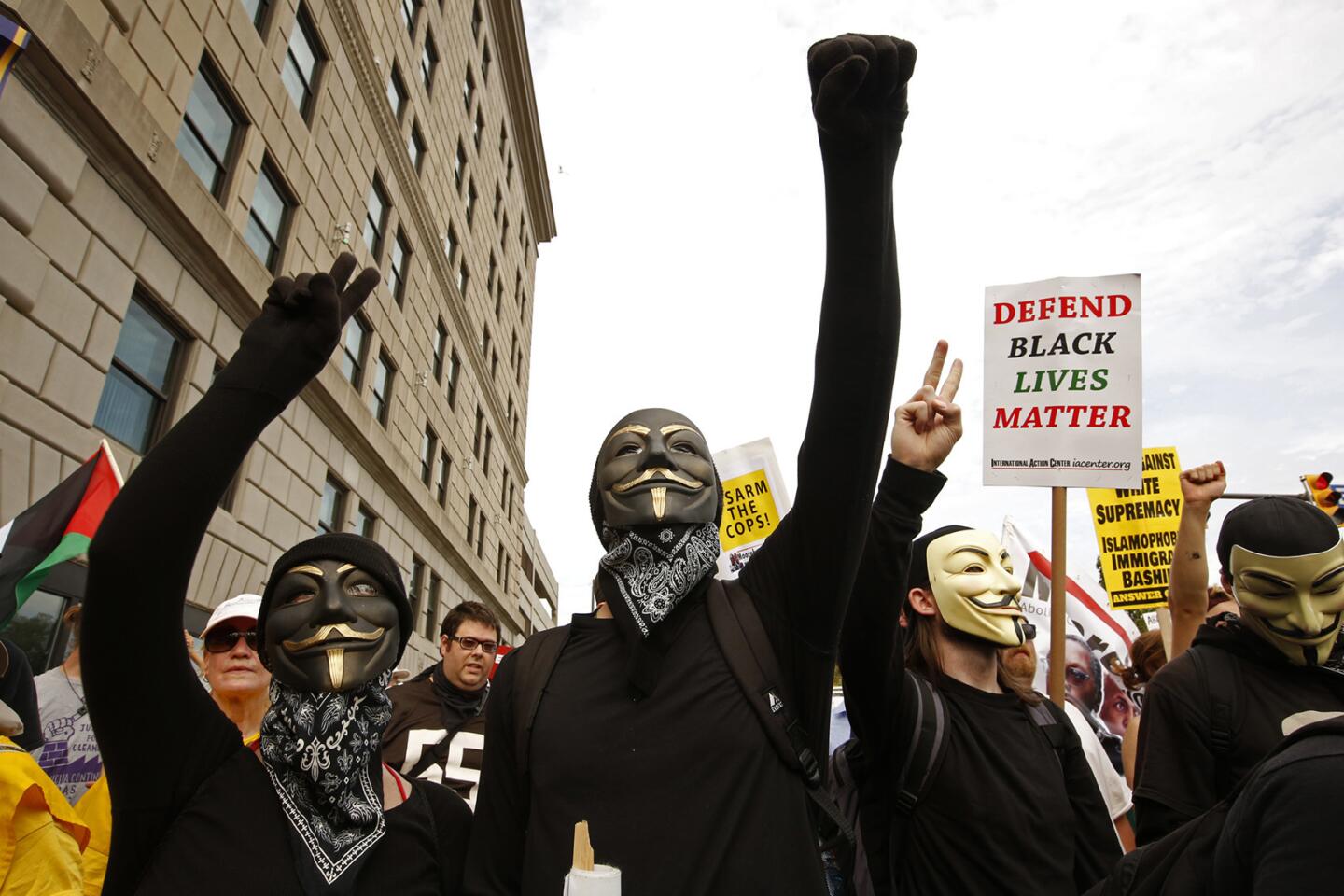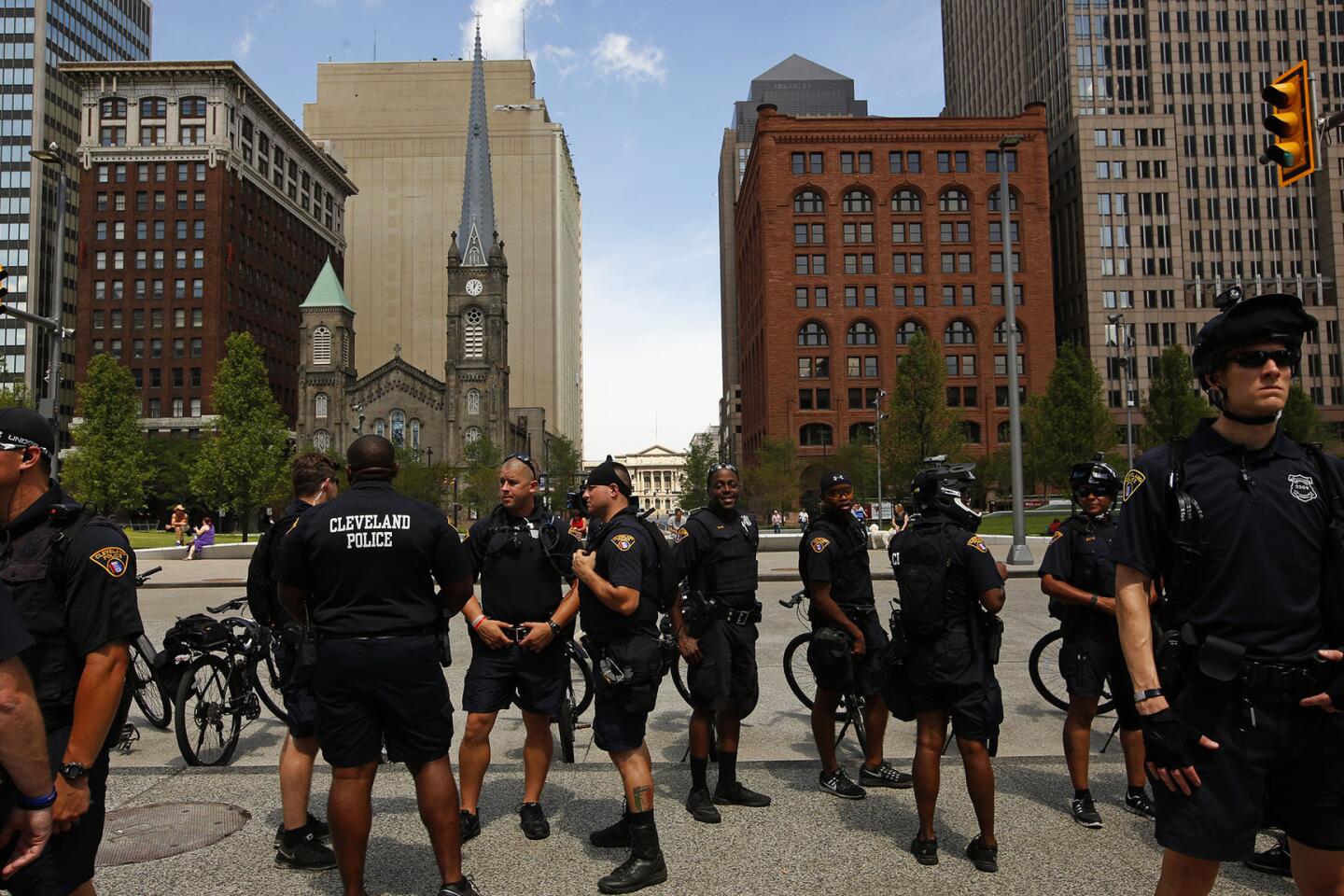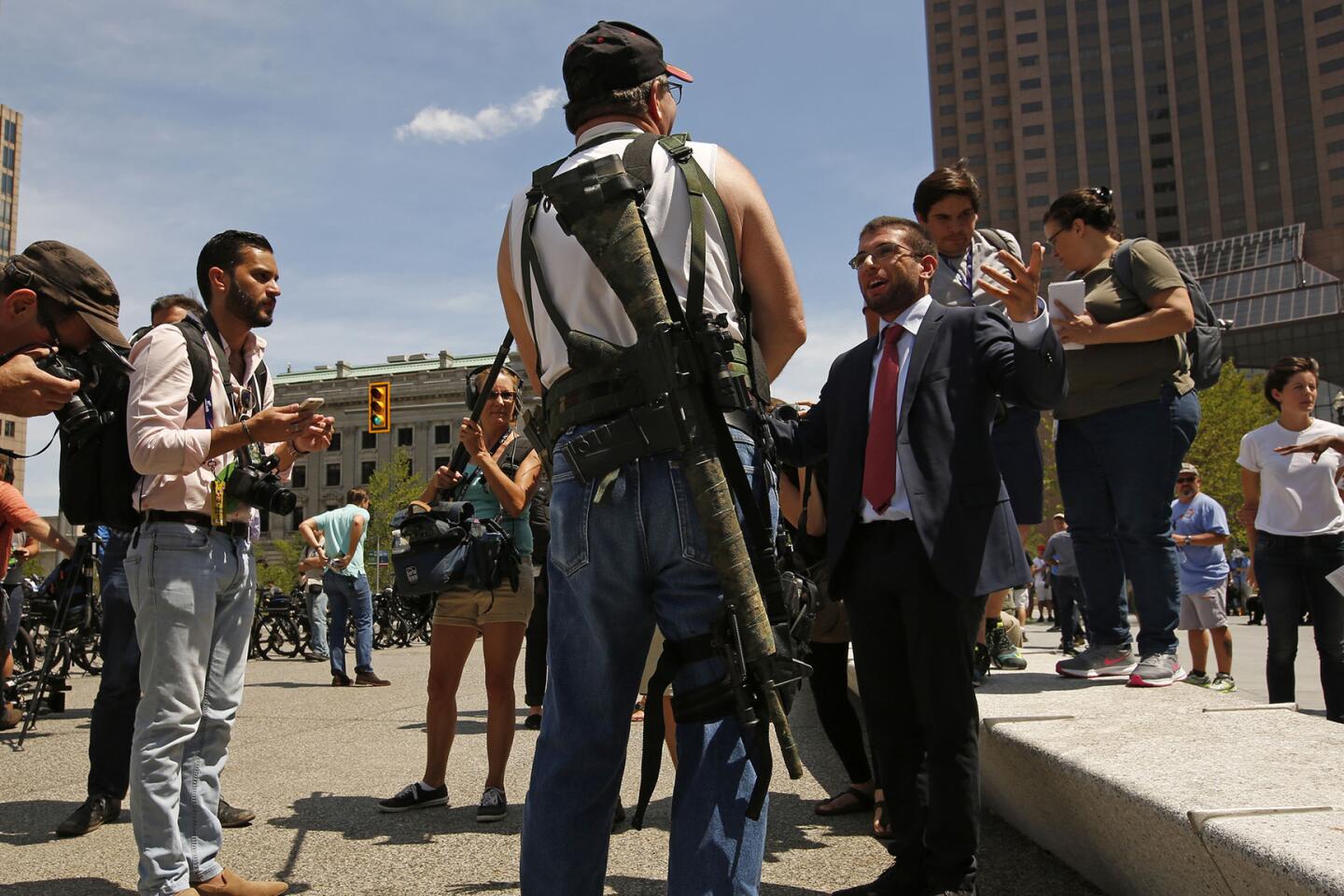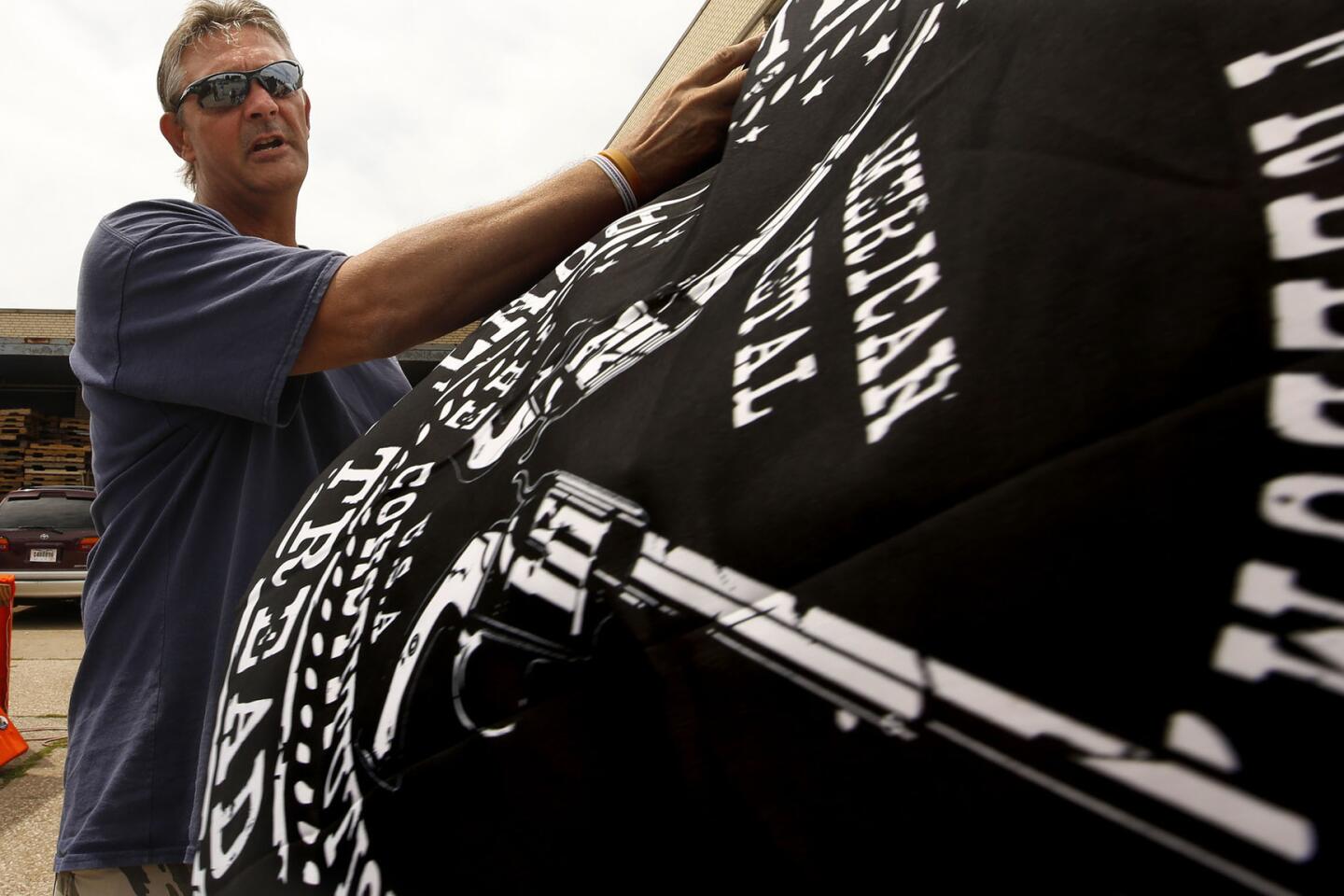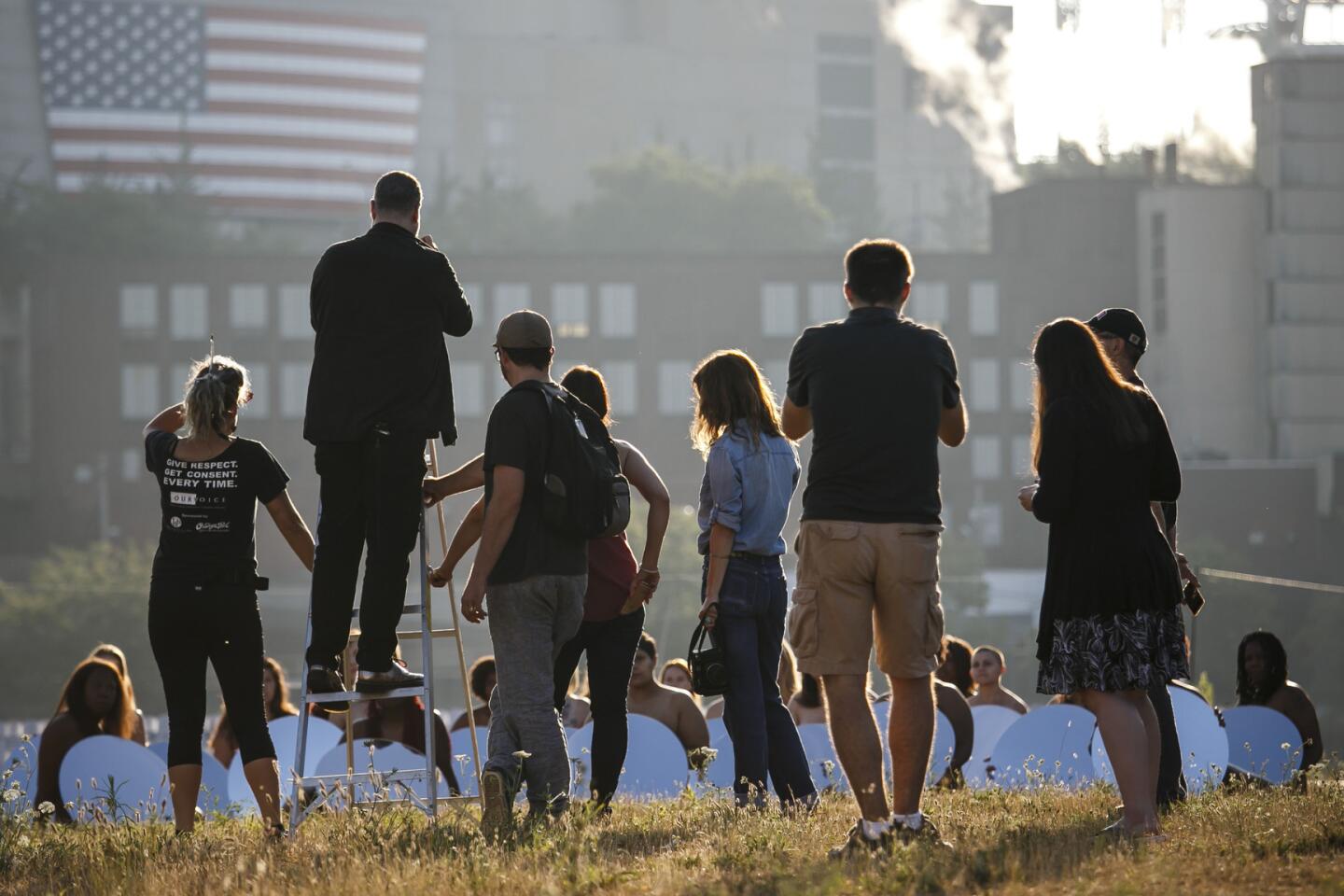Reporting from Cleveland — For three hours, police officers chased a small but defiant group of about 30 demonstrators through downtown Cleveland.
The rowdy protesters defied officers at every turn, pushing past cops on bicycles trying to direct them down side streets and sprinting through a parking garage to evade police outside.
The cat-and-mouse game on Tuesday came to a head less than a block from a security checkpoint on the outer perimeter of the Republican National Convention.
Many of the protesters hid their faces under bandanas despite the muggy weather. Some called the police “pigs” and began shouting at Cleveland’s police chief, Calvin Williams.
A police commander branded the gathering an unlawful assembly, and gave the protesters five minutes to disperse or face arrest.
It was the kind of tense scene that could quickly turn violent: frustrated police officers and stubborn protesters in a sweaty standoff in Cleveland’s stew-thick humidity.
Instead, the intersection was clear within five minutes. No one was arrested or injured.
The first two days of protests outside the convention had followed a similar pattern.
But clashes erupted Wednesday when about a dozen members of the Revolutionary Communist Party tried to burn a U.S. flag outside the Quicken Loans Arena, where the GOP convention is being held.
The flag-burning caused a melee with police that ended with several arrests. Two police officers sustained minor injuries, officials said.
The group had announced the flag-burning ceremony earlier this week, drawing a crush of media and counter-protesters determined to stop the desecration.
Police and media swarmed one man carrying a large flag around 4 p.m., but he turned out to be a Marine veteran who said he came out to oppose the planned burning.
Minutes later, a dozen people put on Revolutionary Communist Party shirts and set fire to a flag after chanting, “America was never great.”
Cleveland police and firefighters swiftly moved in with fire extinguishers and doused the smoldering flag. Several small fights broke out in the crowd, and the protesters were led away in zip-tie handcuffs.
The incident was the first wild scene in what many feared would be a week of day-and-night mayhem in Cleveland.
Instead, civil rights advocates, city officials and even demonstrators say a mix of smart policing and local demographics has helped keep things peaceful.
Only five people were arrested from Sunday to Tuesday, police said, and just three were charged with protest-related crimes. More people were arrested at individual Trump events in California last month.
“Much to our pleasant surprise up to this point, all of our fears have been unfounded,” Administrative and Presiding Judge Ronald B. Adrine said Wednesday after an arraignment for three protesters who tried to hang an anti-Trump flag at the Rock and Roll Hall of Fame.
That could still change. Activists say protests will swell on Thursday, when Trump formally accepts the GOP nomination.
You can’t go 5 feet in downtown Cleveland without overhearing an argument about Donald Trump versus Hillary Clinton, gun rights versus gun control, or whether blue or black lives matter more. But those passionate and polarizing discussions haven’t boiled over into violence or disruption.
An overwhelming police presence clearly has helped.
More than 3,000 officers from at least a dozen states have outnumbered demonstrators at any single event, according to Steven Loomis, president of the city’s largest police union.
The largest protest so far, a march to end poverty that followed a surprise performance by the rap-metal supergroup Prophets of Rage on Monday, involved only 300 people, police said.
Officers on bicycles race ahead of marchers and form makeshift barricades between opposing ideological groups, preventing shouting matches from turning physical.
“Every officer seems to know how they are supposed to work and bicycles are way better than weapons or even billy clubs,” said Christine Link, executive director of the American Civil Liberties Union in Ohio. She called the maneuvers “very well executed.”
1/72
Cleveland Police Officers stand guard at the entrance to the Quick Loans Arena for the 2016 Republican National Convention in Cleveland.
(Marcus Yam / Los Angeles Times) 2/72
Protesters from ‘Stand Together Against Trump’ make their voices heard at the public square during the 2016 Republican National Convention in Cleveland.
(Marcus Yam / Los Angeles Times) 3/72
Protesters from the Revolutionary Communist Party march around the downtown area during the last night of the 2016 Republican National Convention in Cleveland.
(Marcus Yam / Los Angeles Times) 4/72
Protesters from the Revolutionary Communist Party march around the downtown area during the last night of the 2016 Republican National Convention in Cleveland.
(Marcus Yam / Los Angeles Times) 5/72
Men open-carrying rifles watches Donald Trump give his acceptance speech during the 2016 Republican National Convention in Cleveland.
(Marcus Yam / Los Angeles Times) 6/72
A bystander films the protesters from ‘Stand Together Against Trump’ at the public square during the 2016 Republican National Convention in Cleveland.
(Marcus Yam / Los Angeles Times) 7/72
A woman covers her ears as protesters march by during the 2016 Republican National Convention in Cleveland.
(Marcus Yam / Los Angeles Times) 8/72
Police officers sit together as protests have calmed down at the Public Square during the 2016 Republican National Convention in Cleveland.
(Marcus Yam / Los Angeles Times) 9/72
Protesters get into a heated argument at the public square during the 2016 Republican National Convention in Cleveland.
(Marcus Yam / Los Angeles Times) 10/72
Tony McConaghy, from left, Basheer Jones, Randy Grass, pray together at the public square during the 2016 Republican National Convention in Cleveland.
(Marcus Yam / Los Angeles Times) 11/72
A Trump supporter watches protesters standing in the fountain area of the public square during the 2016 Republican National Convention in Cleveland.
(Marcus Yam / Los Angeles Times) 12/72
Protesters stand in the fountain area of the Public Square during the 2016 Republican National Convention in Cleveland.
(Marcus Yam / Los Angeles Times) 13/72
A protesters lays on the ground to rest in front of a line of police officers standing guard at the public square during the 2016 Republican National Convention in Cleveland.
(Marcus Yam / Los Angeles Times) 14/72
Police officers stand guard at the public square during the 2016 Republican National Convention in Cleveland.
(Marcus Yam / Los Angeles Times) 15/72
Protesters get into a shouting match with counter-protesters during the 2016 Republican National Convention in Cleveland.
(Marcus Yam / Los Angeles Times) 16/72
A protesters, who declined to give his name, sports a flower during the 2016 Republican National Convention in Cleveland.
(Marcus Yam / Los Angeles Times) 17/72
Father Jose S. Landaverde, 45, a priest with the Diocese of Quincy in Chicago, with Stand Together Against Trump March, during the 2016 Republican National Convention in Cleveland.
(Marcus Yam / Los Angeles Times) 18/72
Protesters from the Stand Together Against Trump March walk within shouting distance of the Quicken Loans arena during the 2016 Republican National Convention in Cleveland. (Marcus Yam / Los Angeles Times)
19/72
Protesters supporting socialism get into a shouting match with protesters supporting capitalism, during the 2016 Republican National Convention in Cleveland.
(Marcus Yam / Los Angeles Times) 20/72
Protesters from the Stand Together Against Trump March make their way through an underpass, which is on the permitted parade route during the 2016 Republican National Convention in Cleveland.
(Marcus Yam / Los Angeles Times) 21/72
Police officers move in to arrest protesters from the Revolutionary Community Party attempting to burn an American flag during a demonstration.
(Marcus Yam / Los Angeles Times) 22/72
Police officers arrest protesters from the Revolutionary Community Party before they could burn a U.S. flag at the site of the Republican National Convention in Cleveland on Wednesday.
(Marcus Yam / Los Angeles Times) 23/72
Chaos broke out Wednesday near the entrance to Quicken Loans Arena in Cleveland when a group of protesters tried to burn two U.S. flags. Riot police moved in to arrest at least eight people believed to be anarchists.
(Carolyn Cole / Los Angeles Times) 24/72
A police officer on Wednesday tells the crowd outside Cleveland’s Quicken Loans Arena to back up. The officer is holding a flag confiscated from the Revolutionary Community Party before members of the group could burn it during a demonstration at the site of the Republican National Convention.
(Marcus Yam / Los Angeles Times) 25/72
Police officers arrest protesters from the Revolutionary Community Party before they could burn a flag during a demonstration at the site of the Republican National Convention in Cleveland on Wednesday.
(Marcus Yam / Los Angeles Times) 26/72
Riot police try to take control of the situation when chaos breaks out near the entrance to Cleveland’s Quicken Loans Arena after a group of protesters tried to burn two U.S. flags.
(Carolyn Cole / Los Angeles Times) 27/72
At least eight people were arrested after a group of protesters tried to burn two U.S. flags at the site of the Republican National Convention in Cleveland on Wednesday.
(Carolyn Cole / Los Angeles Times) 28/72
A police officer can be seen bleeding after protesters from the Revolutionary Community Party were arrested Wednesday at the site of the Republican National Convention in Cleveland on Wednesday.
(Marcus Yam / Los Angeles Times) 29/72
Police officers arrest members of the Revolutionary Community Party outside the Quicken Loans Arena in Cleveland on Wednesday.
(Marcus Yam / Los Angeles Times) 30/72
A protester smiles for her mug shot while being processed near the site of the Republican National Convention in Cleveland on Wednesday.
(Brian van der Brug / Los Angeles Times) 31/72
Police officers from Georgia form a human barrier during a protest by the Revolutionary Community Party outside the site of the Republican National Convention in Cleveland on Wednesday.
(Marcus Yam / Los Angeles Times) 32/72
Protesters from the Grassroots Global Justice Alliance hold hands to keep photographers from stepping closer to their long “Wall off Trump” banner outside the 2016 Republican National Convention in Cleveland.
(Marcus Yam / Los Angeles Times) 33/72
Protesters from the Grassroots Global Justice Alliance march with a “Wall off Trump” banner.
(Marcus Yam / Los Angeles Times) 34/72
Protesters hold an anti-Trump banner outside the convention site in Cleveland.
(Marcus Yam / Los Angeles Times) 35/72
A protester gets into an argument with Cleveland Police Chief Calvin Williams outside the 2016 Republican National Convention on July 19.
(Marcus Yam / Los Angeles Times) 36/72
Protesters sprint down a back alley to get ahead of the police as they try heading into the convention area during the 2016 Republican National Convention in Cleveland on July 19.
(Marcus Yam / Los Angeles Times) 37/72
Police officers use their bicycles to push back protesters and photographers during a confrontation on the second day of the 2016 Republican National Convention in Cleveland on July 19.
(Marcus Yam / Los Angeles Times) 38/72
A Michigan state police officer pushes back photographers at the Republican National Convention in Cleveland.
(Marcus Yam / Los Angeles Times) 39/72
Pro-Trump supporters exchange words with anti-Trump protesters at the 2016 Republican National Convention in Cleveland.
(Marcus Yam / Los Angeles Times) 40/72
A protester shouts at a Trump supporter in downtown Cleveland.
(Marcus Yam / Los Angeles Times) 41/72
Protesters yell, “Black lives matter!” during a demonstration outside the convention hall in Cleveland.
(Marcus Yam / Los Angeles Times) 42/72
Police officers separate rival groups of demonstrators.
(Marcus Yam / Los Angeles Times) 43/72
A flower is held up as a protesters are escorted away in Cleveland.
(Marcus Yam / Los Angeles Times) 44/72
Members of Bikers for Trump scold a protestor for allowing the American flag to touch the ground.
(Marcus Yam / Los Angeles Times) 45/72
Demonstrators and law enforcement officers mingle on a public square.
(Marcus Yam / Los Angeles Times) 46/72
Tevor Leis, exercising his Ohio open carry rights, stands armed in Public Square in Cleveland, during the second day of the Republican convention.
(Marcus Yam / Los Angeles Times) 47/72
West Ohio Minutemen, an armed militia, march through the Public Square during the second day of the 2016 Republican National Convention in Cleveland.
(Marcus Yam / Los Angeles Times) 48/72
Police officers stand guard with assault rifles at the Public Square during the second day of the 2016 Republican National Convention in Cleveland.
(Marcus Yam / Los Angeles Times) 49/72
Lou Pumphrey, a U.S. Army E4 is attending the convention and brought along his peace flag.
(Carolyn Cole / Los Angeles Times) 50/72
Stevedore Crawford, Jr. of Delaware, Ohio, shouts at police officers during the 2016 Republican National Convention in Cleveland.
(Marcus Yam / Los Angeles Times) 51/72
Protesters from the “End Poverty Now, March for Economic Justice,” make their way downtown on the first day of the 2016 Republican National Convention in Cleveland.
(Marcus Yam / Los Angeles Times) 52/72
Protesters from the “End Poverty Now, March for Economic Justice,” make their way downtown on the first day of the 2016 Republican National Convention in Cleveland.
(Marcus Yam / Los Angeles Times) 53/72
Protesters from the “End Poverty Now, March for Economic Justice,” make their way downtown on the first day of the 2016 Republican National Convention in Cleveland.
(Marcus Yam / Los Angeles Times) 54/72
Anti-Trump protesters cross a barricade as march in downtown Cleveland, a block away from where the Republican National Convention is being held.
(Carolyn Cole / Los Angeles Times) 55/72
Anti-Trump protesters march in downtown Cleveland near the Quicken Loans Arena where the Republican National Convention is being held.
(Carolyn Cole / Los Angeles Times) 56/72
Randy Grant from Los Angeles say the pledge of allegiance at the start of the America First Unity Rally at Settlers Landing Park during the first day of the 2016 Republican National Convention in Cleveland.
(Marcus Yam / Los Angeles Times) 57/72
Joshua Glaspie, from Chicago is relishing the opportunity to open carry his weapon, a Kimber Ultra Carry 2 9mm handgun, at the America First Unity Rally in Cleveland.
(Marcus Yam / Los Angeles Times) 58/72
Elan Stoltzfuz, holds his rifle up for photographers at Settlers Landing Park for the America First Unity Rally in Cleveland.
(Marcus Yam / Los Angeles Times) 59/72
Anti-Trump protesters gather in downtown Cleveland prior to a ‘Stop Trump’ march to Quicken Loans Arena for Monday’s opening of the Republican National Convention.
(Carolyn Cole / Los Angeles Times) 60/72
Anti-Trump protesters gather in downtown Cleveland prior to a ‘Stop Trump’ march to Quicken Loans Arena for Monday’s opening of the Republican National Convention.
(Carolyn Cole / Los Angeles Times) 61/72
Anti-Trump protesters gather in downtown Cleveland prior to a ‘Stop Trump’ march to Quicken Loans Arena for Monday’s opening of the Republican National Convention.
(Carolyn Cole / Los Angeles Times) 62/72
Security personnel greet protesters during an anti-Donald Trump march toward downtown Cleveland on the eve of the Republican National Convention on July 17, 2016.
(Marcus Yam / Los Angeles Times) 63/72
Anti-Trump protesters.
(Marcus Yam / Los Angeles Times) 64/72
Members of the antiwar group Code Pink stand in front of the police guarding the anti-Trump protesters.
(Marcus Yam / Los Angeles Times) 65/72
Police officers in protective gear. (Marcus Yam / Los Angeles Times )
66/72
About 200 anti-Trump and Black Lives Matter protesters, including Henry Edward of Detroit, march through downtown Cleveland.
(Carolyn Cole / Los Angeles Times) 67/72
Protesters and police.
(Carolyn Cole / Los Angeles Times) 68/72
Protesters in Cleveland.
(Carolyn Cole / Los Angeles Times) 69/72
Cleveland police wait for a 2nd Amendment rally, but few people showed up for the event at Public Square in downtown.
(Carolyn Cole / Los Angeles Times) 70/72
Steve Thacker, 57, center, a retired Marine, is interviewed by numerous journalists in downtown Cleveland, where a 2nd Amendment rally was scheduled. Two participants showed up for the rally.
(Carolyn Cole / Los Angeles Times) 71/72
Brian Lange, a Trump supporter from Lima, Ohio, buys a flag in Cleveland to show his support for the 2nd Amendment.
(Carolyn Cole / Los Angeles Times) 72/72
Spencer Tunick photographs a group of nude women holding large round mirrors near Cleveland’s Quicken Loans Arena, where the 2016 Republican National Convention will start Monday. The photo shoot, on the eve of the convention, is part of Tunick’s large-scale art installation “Everything She Says Means Everything.”
(Marcus Yam / Los Angeles Times) Police have given protesters broad leeway, choosing not to make arrests over minor crimes.
Cleveland’s police have been under a federal monitor since 2014, when the Justice Department found they disproportionately used force against blacks. The shooting death by police of a 12-year-old girl put the city at the center of a national debate on the policing of minority communities.
The consent decree “changes the way they have been policing this convention,” said Jocelyn Rosnick, head of the Ohio chapter of the National Lawyers Guild. “It’s not something that has been in the mix for other conventions.”
While Latinos have come out in force to protest Trump’s immigration policies in California, less than 10% of Cleveland residents identify as Latino.
Even the city’s location — a good day’s drive from Chicago or New York and other presumed hotbeds of anti-Trump fervor — may have helped keep the protests in check.
Tom Moore, 24, of Marion, Mass., said young people seem happy to pillory Trump on social media, but are less likely to take to the street in marches as older generations did.
“In general, it just makes me depressed about American protest culture,” said Moore, who held a sign that read “Grand Old Party, Same Old Klan.”
Across the street, Bryan Hennon stood outside the city’s main transit hub with a carbine rifle slung on his shoulder.
Ohio’s open-carry gun laws had raised concerns about potential attacks during the convention, fears that spiked after gunmen killed police officers in Dallas and Baton Rouge in recent weeks.
Instead, Hennon and a dozen other members of the West Ohio Minutemen became mini-celebrities, smiling for the cameras as international media surrounded them.
Hennon said he had no problem with the docile demonstrations.
“This is the way it should be, man,” he said. “People should be able to peacefully protest without being assaulted or feeling threatened.”
Los Angeles Times staff writer Matt Pearce contributed to this report.
james.queally@latimes.com
Follow @JamesQueallyLAT for news on protests and police at the Republican National Convention.
ALSO
Here are the places where Donald Trump and the Republican Party part ways
If you get hurt during convention protests, just look for this logo
Trump won the nomination by harnessing anger. Can he now turn to a message of optimism?
In-house speechwriter takes fall for Melania Trump’s plagiarism and says her offer to quit was refused
UPDATES:
5:35 p.m.: This story was updated with background.
3:10 p.m.: This story was updated with information on arrests at the flag-burning demonstration.
2:25 p.m.: This story was updated with developments from the scene of protesters’ attempts to burn the American flag outside the Quicken Loans arena.
This story was first published at 11:40 a.m.
